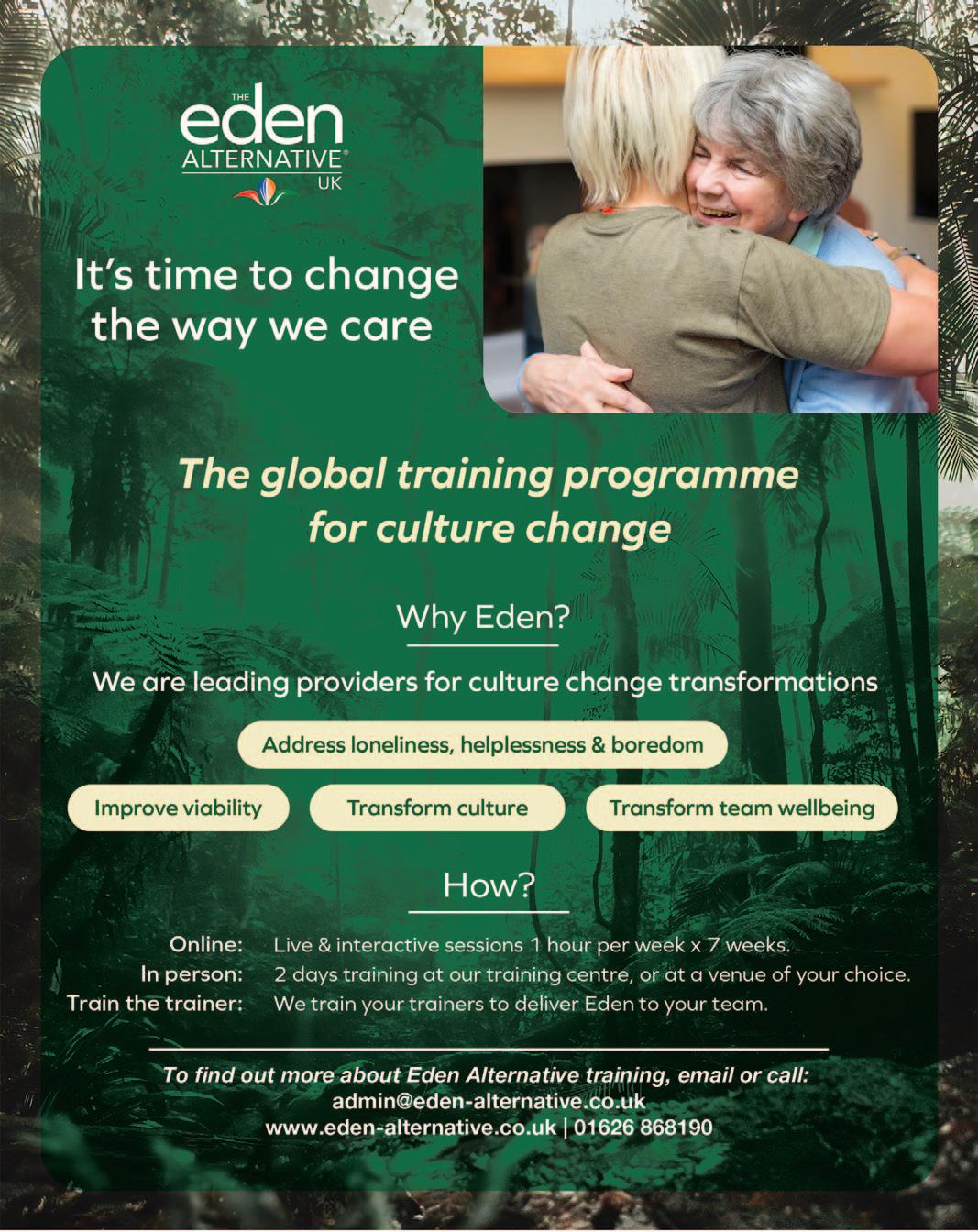















The Care Quality Commission (CQC) spent £99m on a transformation programme which has failed to deliver the ‘vast majority’ of expected benefits, a damning review of its IT failures has found.
An independent review of the technology that supported the CQC transformation has found that the primary cause of its technology failure was a failed organisational transformation.
In 2021, the regulator launched its transformation programme under the control of former chief executive Ian Trenholm, which it said would simplify the assessment process for health and social care providers.
(CONTINUED ON PAGE 3...)
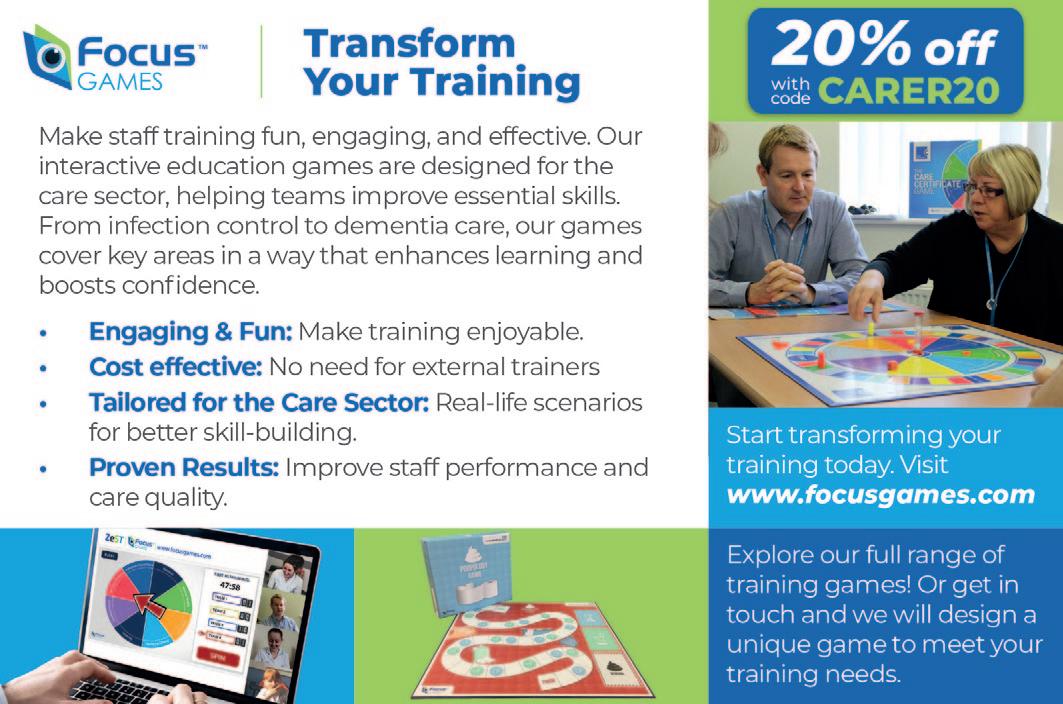
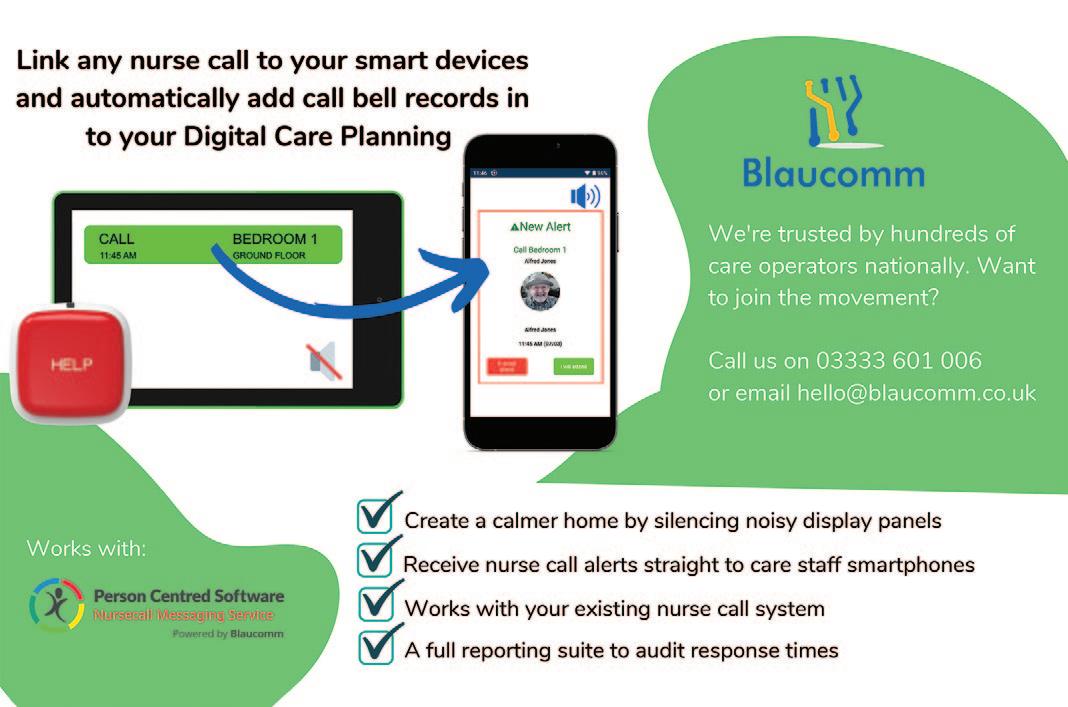

Editor
Peter Adams
A recent review as seen in our lead story has laid bare the shocking reality of the Care Quality Commission’s (CQC) £99 million ‘transformation’ programme—an endeavour that has spectacularly failed to deliver the vast majority of its promised benefits.
This is an eye-watering sum of taxpayers’ money, squandered on an initiative that was, according to the review, doomed by vague objectives, shifting priorities, and an alarming lack of accountability.
One has to commend the transparency of the review process and the fact that these findings have been brought to light.
But transparency alone is not enough. Where is the accountability? Where are the consequences for those who presided over this failure? This is waste on a staggering scale, of your money and my money, and the most disturbing part is the possible sense of public indifference to such financial mismanagement.
The risk is that we become so accustomed to these massive losses that we no longer react with the outrage they deserve.
The review also highlighted the severe impact on CQC staff, who reported mental and physical distress as a result of being unable to perform their roles effectively.
More than 15,000 IT-related incidents were recorded, with concerns repeatedly raised—only for them to be ignored.
A damning indictment of leadership failure. The overcomplicated assessment app, designed to be a key tool, was found to add little to no value, further reinforcing the programme’s catastrophic mismanagement.
It is difficult to accept that an organisation with such an important responsibility operated in this way and I have yet to hear of “accountability”. Which is equally alarming.
Meanwhile, the Chancellor’s Spring Statement provided little solace to an already embattled social care sector.
Chronic underfunding remains the elephant in the room, and the government’s decision to increase Employer National Insurance Contributions (ENICs) has only deepened the crisis.
Despite pushback from the House of Lords, the government pushed ahead, ensuring that care providers will now face even greater financial strain—pushing the sector ever
The Carer is published by RBC Publishing Ltd, 3 Carlton Mount, 2 Cranborne Road, Bournemouth, Dorset BH2

closer to breaking point.
In recent weeks, I have attended multiple webinars discussing the financial burdens hitting the care sector from April 1st.
The resounding message from providers, operators, organisations, and staff is clear: these cost hikes will be devastating. And while the government may hope to weather the storm, I believe this fight is far from over.
Discontent is brewing. The care sector is not the only one feeling the squeeze, and as the financial impact intensifies, so too will public frustration. Lay-offs, closures, and service reductions will inevitably follow, and there is a possibility of widespread protests this summer, which I will readily attend and support!
The CQC debacle is a stark reminder of the cost of poor governance, and the social care sector’s ongoing funding crisis is an urgent call to action.
We cannot allow mismanagement and indifference to become the norm. The care sector deserves better. The public deserves better. And, above all, those who rely on care services deserve better.
I would encourage our readers to sign up for our bi-weekly digital newsletter at www.thecareruk.com and follow us on social media for all the latest news.
I can always be contacted at editor@thecareruk.com
damage. Views expressed within this publication are not necessarily those of the publisher or the editorial team. Whilst
responsibility for any effects, errors or omissions therefrom. All rights reserved, reproduction is forbidden unless


However, an independent review by IT expert Peter Gill found the transformation programme was to blame for widespread IT failures that have caused “significant organisational disruption”.
Mr Gill discovered the regulatory transformation programme cost £99m between November 2019 and July 2024, however, just 5 per cent of projected benefits have been achieved.
He concluded that the investment was not value for money, and that its plans were far too ambitious, while the CQC lacked a data strategy.
Staff at the CQC described how their mental and physical health had been impacted as they were unable to perform their functions effectively, saying that when concerns were raised, they were not listened to.
Over than 15,000 incidents were reported to the IT service desk.
The review also found that having loosely defined objectives made it “impossible to hold the programme board to account for delivery”, and changes in what the CQC wanted to do meant the system was always “trying to hit a moving target”.
The review was particularly disparaging of an assessment app which is describes as “overcomplicated”, with “a significant part of the functionality” adding no value.
It adds that the technology used for its regulatory platform and provider portal are salvageable but require substantial development and rebuilding work.
The review considered how and why we got to the point where the technology is causing such significant organisational disruption. It also explored whether we could continue with the technology as it is.
The report sets out the scale of the problems that resulted in the failure of our technology, and the impact that transformation had across CQC. They include:
• Technical issues with the way the regulatory platform and provider portal function, resulting in multiple challenges including, for example, an overly complex assessment process, a poor user experience in registration, low use of the provider portal for notifications, and challenges with data quality.
Fundamental cultural issues, as concerns were raised and colleagues did not believe they were listened to. This was reported to have a negative mental and physical health impact on colleagues. Data was also not given the importance it should have.
The total spend on the regulatory transformation programme, which
includes the regulatory platform and provider portal, has been £99 million from inception in July 2019 to date. The vast majority of the benefits expected to be delivered have not yet been achieved.
The report also found that parts of the regulatory platform are working well. These relate to the customer contact area and include richer data capture, time-saving automation of some processes, and the ability to connect and view different data and information in one place.
There are 23 recommendations, which can be grouped in 5 broad areas.
They reflect what is needed as part of rebuilding CQC, and redeveloping the regulatory platform and the provider portal:
Culture
Governance
Operating model
Change management
Data and Digital “SALVAGEABLE”
Notwithstanding the criticism, the report found the IT platform can be salvaged, albeit with significant changes and a new approach, and recommends that CQC “retains Microsoft Dynamics 365 as a strategic asset” and sets out that the systems will require substantial development and rebuilding work and that this should be done by CQC colleagues with some additional support.
The recommendations also cover the need to:
Develop a culture where data is seen as critical and strategically important.
Ensure robust governance and clear roles and responsibilities.
Extensively engage with and involve users, internally and externally. This includes putting in place additional ways to ensure the concerns and feedback of CQC colleagues and external partners are listened to and acted on.
Follow best practice and industry standards.
“COMPLETELY UNACCEPTABLE”
Julian Hartley, Chief Executive said: “The findings in this report evidence that the way the digital transformation programme was carried out was completely unacceptable. It marks a critical moment in terms of where we are, what’s gone wrong and where we’re going and I want to thank the colleagues who have given their time and expertise to help inform it.”
“The report praises colleagues for their diligence and determination to move forward and bring CQC back to being a fully effective organisation. I would like to echo those thanks. It starkly highlights the cul-
tural issues and the fact that colleagues were not listened to. I am focused on putting this right.”
“I have already started to take steps to address these issues to get us back to delivering our purpose and protecting people from poor care. This includes a focus on re-setting our culture through the CQC Way, working in partnership with CQC colleagues, providers, the public and wider stakeholders. I have also established strong digital transformation and change management executive leadership at CQC and I will be recommending to the new chair that we commission an independent review of organisational governance.”
“It is clear we have a journey ahead of us, but we are committed to ensuring the regulation we carry out meets its core purpose — to keep people safe and ensure they receive the care they deserve.”
CQC
Esther Provins, Interim Chief Digital and Data Officer added: “I know colleagues, providers and wider stakeholders have been waiting to read this review. Peter Gill’s findings are indeed sobering however I believe they appropriately represent the voice of all who were, and continue to be, impacted by the challenges in our historic transformation programme and associated digital systems.”
“The recommendations are fundamental to rebuilding CQC and getting back to delivering our purpose and speak to much wider issues than just challenges with technology. There is much to do to make this right, and I have already started to work with colleagues and stakeholders to develop an action plan that will deliver the recommendations in the report.”
In July last year News health secretary Wes Streeting branded the CQC as “not fit for purpose,” after an interim review of the regulator of health and social care in England found significant failings, including a lack of clinical expertise among inspectors, inconsistent assessments, and problems with the IT system.
The review, led by Penny Dash, chair of the North West London Integrated Care Board, found that around one in five services had never been rated, despite some of them having registered with the CQC more than five years ago. It also noted that some organisations had not been re-inspected for several years, with one non-specialist acute care hospital going uninspected for a decade.
Ms Dash warned that these failings meant the CQC was unable to consistently and effectively identify poor performance at hospitals, general practices, and care homes.
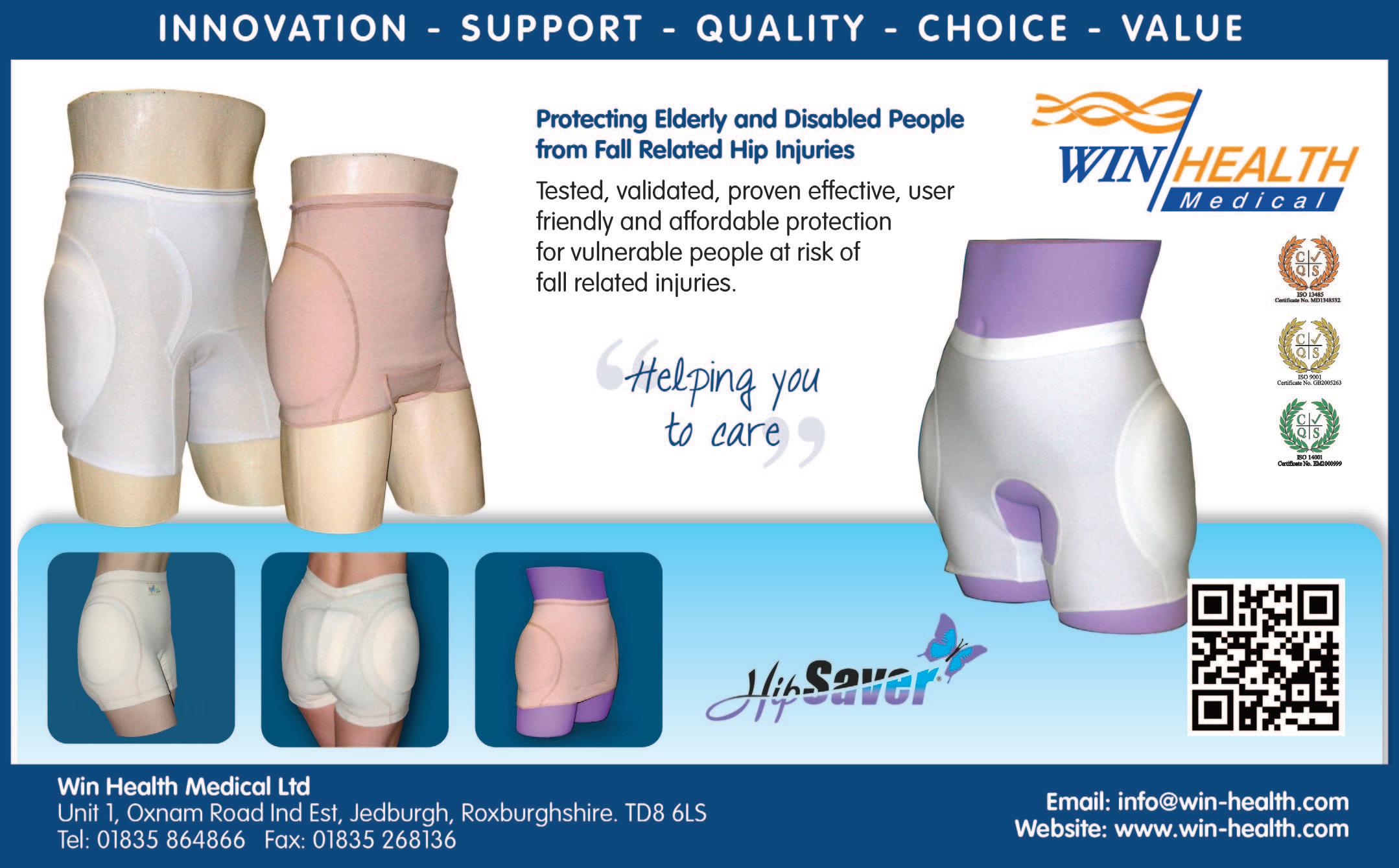
By Bethan Evans, CEO of My Choice Healthcare

The UK care home sector is at a pivotal point, with unprecedented financial pressures forcing providers to rethink the way services are provided.
Rising costs, staff tensions and funding shortfalls are forcing providers to make tough decisions, with potentially farreaching consequences for residents, families and local communities.
If not addressed, this could result in fewer beds available, closures and a reduction in the quality of care available to those most in need.
INCREASING OPERATIONAL
Perhaps the most immediate issue is the shocking escalation of operating expenses.
Utility bills alone have risen, with certain care providers reporting hikes of as much as 500 per cent, putting a major squeeze on budgets that were already under strain.
Increases in food and insurance costs, along with the expense of medical supplies have also added to financial pressures, with the books growing ever harder to balance.
WORKFORCE ISSUES
Workforce issues are another major obstacle. Care workers are the lifeblood of the sector, but recruitment and staff retention have been longstanding problems for many in the sector.
The sector has traditionally had low pay relative to the work carried out by staff. The gap between the National Living Wage and the typical pay of a care worker has narrowed, and it has become more difficult for providers to offer competitive pay.
Trained staff are transferring to other employment where remuneration is higher and working conditions might be perceived as less demanding. A recent survey found that 95 per cent of providers believe increasing pay would have the most impact on boosting numbers of staff. But with financial concerns mounting, increasing salaries on a blanket scale is a battle uphill.
SERVICE REDUCTIONS AND MARKET WITHDRAWALS
The pressures have already led to service reductions across the sector. Around 43 per cent of providers have had no option but to close parts of their operations or hand contracts back to local councils as their finances have grown unsustainable.
It is even more of an issue for smaller providers, with half of those said to be considering leaving the market altogether. This is a concerning trend, as it means less options for families that wish to offer highquality care for their loved ones and a further burden on an already stretched healthcare system.
Funding remains an issue. While efforts have been made to increase financial support, providers report that fee increases by local authorities are not keeping pace with inflation.
Last year, council tax rate rises failed to match the 9.7 per cent rise in the National Living Wage, and many care homes are struggling to support even the most basic running costs.
The funding-cost gap is putting huge pressure on providers, many of whom are having to make the choice as to whether to cut back services, slim down staff or shut up shop.
There are solutions that could help stabilise things and provide longterm sustainability as well as address issues within the sector.
An initial priority would be to implement a funding system which allows a sustainable fund and makes provision for paying for good quality care.
There should be assurances for providers that funding will be adequate and ongoing so they can better plan ahead into the future.

Policymakers will need to collaborate closely with providers in order to fix these financial issues and create a long-term strategy that will help residents receive care that they value and deserve.
Workforce investment is another important factor. Care workers must be valued as key workers, with packages that reward them for the crucial work they do.
Along with pay increases, career development prospects and improved terms and conditions of employment must take priority to make the profession more attractive to future candidates.
Without a stable and well-supported workforce, the standard of care will continue to decline, contributing further to the issues the industry currently faces.
Innovation and efficiency also need to come further into play. Technology can be utilised to make processes more efficient, reduce costs and improve delivery of services.
From digital care planning systems to the use of AI for admin, there are a number of ways technology can relieve pressures on budgets without compromising on quality of care.
Collaboration among providers, the local government and healthcare organisations can also help create shared resources and best practices that serve the industry as a whole.
THE NEED FOR ACTION NOW
The issues facing the care home industry are daunting but not insurmountable.
Current financial pressures require immediate action by policymakers, providers and stakeholders to ensure the long-term sustainability of services.
If nothing is done, the threat of mass closures and service cuts will increase further, depriving vulnerable people of the care that they need.
The time for change is now, to protect the future of care homes and those who depend on them.

With the five year anniversary of the first Covid-19 pandemic lockdown this month, the impact of the unprecedented health emergency is still being felt in the lives of many people aged 50 and over.
A new State of Ageing 2025 report reveals how life expectancy has not returned to pre-pandemic levels while healthy life expectancy has greatly declined.

There are also 213,000 more people aged 50-64 economically inactive now than in 2020, a significant indicator of how the pandemic brought years of employment progress for older workers to a shuddering halt.
The report also details a decline in rates of volunteering by older people in recent years with volunteer numbers struggling to recover since the pandemic.
And while older people are more likely to feel a strong sense of belonging, and satisfaction, with their neighbourhoods than younger people, rates of belonging and satisfaction have continued to decline among 50 to 64 year olds since 2020/21.
The findings add compelling evidence for the need of a Commissioner for Older People and Ageing in England – a proposal recently recommended by the parliamentary Women and Equalities Committee that also has the backing of more than 80 organisations and the vast majority of the general public.
Dr Carole Easton OBE, Chief Executive at the Centre for Ageing Better, said:
“The Covid-19 pandemic was disruptive in so many ways to our everyday lives and many older people are still counting the cost to this day.
“What our State of Ageing 2025 report shows is since the pandemic, older people’s contribution to our economy and wider society has been diminished to a significant degree. People in their fifties, sixties and beyond are being deprived of the opportunity to help businesses and the economy grow, are missing out on opportunities to help their communities flourish through volunteering and ultimately, are losing precious years to ill-health and dying
prematurely.
“These trends can no longer be considered just temporary blips that will resolve themselves. Unless we take specific action, the negative impact of the Covid-19 pandemic will continue to limit the potential of our ageing population to the detriment of all of society, the economy and our country.”
“A Commissioner for Older People and Ageing is urgently needed for England to ensure that government policy-making considers the long-term needs of our ageing population and helps to deliver a national age-friendly strategy that gives a voice to the groups and issues that are currently marginalised, as well as focusing on reducing inequality in later life.”
Dr Aideen Young, Senior Evidence Manager at the Centre for Ageing Better and co-author of the State of Ageing 2025 report, said: “Our new State of Ageing report clearly shows that the disruption created by the Covid-19 pandemic has not gone away for many older people whose lives aren’t as rich and rewarding as they were before everything changed in March 2020. We cannot turn the tide without a concerted and targeted effort to create a more age-friendly society that enhances everybody’s independence, inclusion and wellbeing in later life.”
“Government, both national and local, other public bodies, employers and individuals all have a role to play. But if we really want those efforts to be coordinated, efficient and maximised, then we really need a Commissioner for Older People and Ageing in England who can be the focal point for helping deliver this vital change to our country.”
“As well as appointing a Commissioner for Older People and Ageing in England, to match the role already long-established in Wales and Northern Ireland, we are calling on the government to provide every local authority with sufficient resources to become an Age-friendly Community and for all local and strategic authorities to appoint an elected member to act as a champion for ageing and older people.”
Karuna Manor Care Home, a leading provider of culturally sensitive elderly care, proudly hosted the inaugural session of its Spiritual Dementia Café last month, a unique initiative designed to support individuals living with dementia and their families through a holistic, faithbased approach. This initiative, supported by the renowned Hare Krishna Temple, Watford, has already made a profound impact on residents, caregivers, and the wider community.
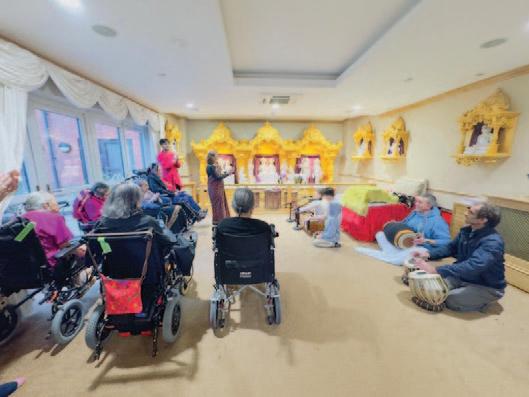
The Spiritual Dementia Café provides a serene and uplifting environment where individuals affected by dementia, along with their caregivers, can find solace, support, and engagement through spiritually enriching activities. The first session saw residents and guests participate in music therapy, guided meditation, devotional singing (kirtan), and storytelling from sacred texts, all tailored to provide comfort, stimulation, and a deep sense of connection for attendees.
Reflecting on the event, Ruth Kigaa, Home Manager at Karuna Manor, shared, “The response to the Spiritual Dementia Café has been overwhelmingly positive. Many of our residents found peace and joy through the devotional music and meditation, which brought back fond memories and a deep sense of belonging. We are dedicated to providing holistic care, and this initiative beautifully integrates spiritual well-being into dementia support. Seeing our residents smile and engage so meaningfully was truly heartwarming.”

The Hare Krishna Temple, Watford, widely known for its community outreach and dedication to spiritual service, played a crucial role in the event’s success. Temple devotees led soulful kirtans and storytelling sessions, creating an atmosphere of warmth, joy, and deep spirituality.
Hema, a long-time devotee of the Hare Krishna Temple, expressed her enthusiasm for the initiative: “At the Hare Krishna Temple, we believe that spiritual nourishment is essential at every stage of life. The Spiritual Dementia Café is a wonderful opportunity to bring devotion and joy to those affected by dementia. Through bhajans, kirtan, and storytelling, we aim to create a soothing atmosphere where individuals feel connected to their faith and culture. Seeing the happiness and comfort these sessions bring is truly heartwarming.”
Family members of residents who attended the event also shared their gratitude, with one attendee commenting, “It was so touching to see my father engage with the prayers and music. He seemed more present and at peace than I’ve seen him in a long time. This initiative is truly a blessing.”
Following the success of the first session, Karuna Manor Care Home is pleased to announce that the Spiritual Dementia Café will now be a regular offering, with sessions planned Bi-monthly. The next gathering is scheduled in April, and the home welcomes residents, families, and members of the wider community to participate.
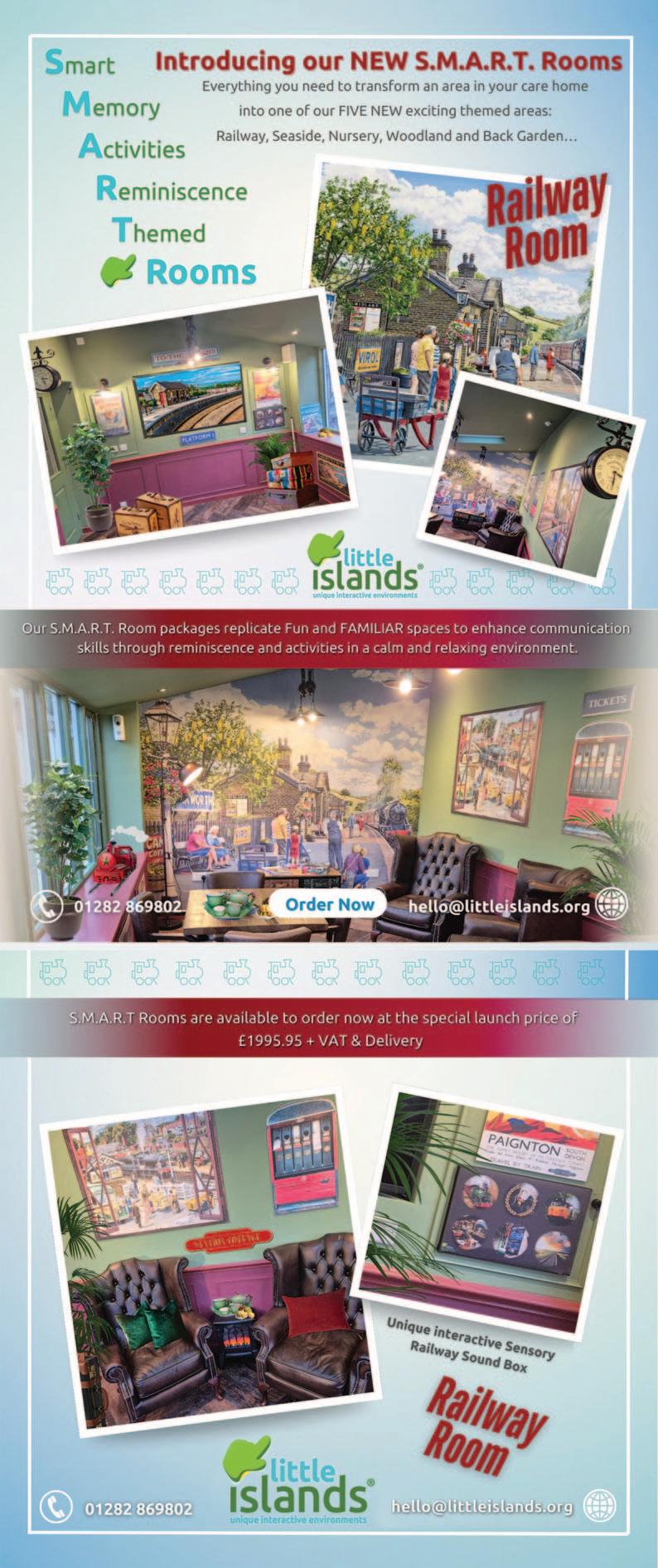
The Social Care Foundation (SCF) has unveiled a new advisory council to inform a much-needed public and political debate on the UK’s care crisis.
The distinguished panel includes Nadra Ahmed CBE, Professor Martin Green OBE and Professor Vic Rayner OBE and will focus on innovative and achievable solutions to the problems facing the care sector. The advisory council also welcomes Caroline Abrahams CBE; Dr Jane Townson OBE; Karen Hedge; Jeremy Richardson, Bill Morgan; Daniel Casson; Sam Monaghan; James Tugendhat and Lionel Zetter.
One of the priority objectives of SCF’s advisory council will be to help the Casey Commission conclude its work as quickly as possible by pro-
Social Care TV continue to fly the flag for highest quality online training for Health and Social Care, after unwavering commitment to excellence within the sector for over 25 years.
Their widely-used health and social care specific courses - produced and edited in-house - are expertly designed to make learning engaging, informative and, therefore, highly effective for learners.
Accredited by CPD, training with Social Care TV is quality assured, comprehensive and relevant.
As one of the leading online training providers in the health and social care sector in the UK, they supply training for local authorities, recruitment agencies, care home groups and other health and social care organisations.
Their feature-rich Manager platform has further been enhanced this year with the introduction of several new Manager tools designed to aid with compliance, reporting and trainee management. Features now available include:
• Compliance Dashboard with Traffic Light System

• Downloadable Trainee Matrix
• Custom Bundles
• Trainee Groups
• Bulk Uploads
• Bulk Enrolment Onto Custom Bundles
• Course Enrolment Notifications
• Course Reminders
ducing a series of specific suggestions to improve the UK care system. It will also recommend to the UK government a series of practical changes that could be implemented quickly.
Damian Green, chairman of the SCF, said: “We are particularly keen to avoid a “boiling frog” scenario where standards of care inexorably slip under financial pressure.
“The whole care sector is gripped by the urgency of the need for change, and the Advisory Council will help the Social Care Foundation make the practical case for the changes that ought to be happening now, not in the distant future.”

SCTV regularly release new and updated high-quality courses. Previews for all courses can be viewed at: Courses - Social Care TV (www.social-care.tv/courses/course-details)
To enhance their learners' experience further they have created free, comprehensive subject-specific workbooks which were rolled out across all courses this year. This unique addition provides excellent value and a fully robust training package.
SCTV are delighted to have won several awards over the last 12 months including:
• Best Online Health and Social Care Learning Platform’ – Global Health & Pharma Social Care Awards 2024
• ‘CPD Provider of the Year’ – The CPD Awards
• Social Care Training Provider of the Year’ - Corporate Livewire Innovation & Excellence Awards
Gold standard customer service remains a core staple of the business, with expert support and guidance provided via telephone, email and live chat. They place great importance on the training and development of their customer services team to ensure that they continue

to provide a personal, friendly and knowledgeable service. Their much-loved ‘Care Worker of the Month’ award recognises and rewards the selfless dedication shown by care workers across the UK and they proudly support the Care Workers Charity who aim to advance the financial, professional and mental wellbeing of social care workers.
SCTV believe that high quality training should be accessible to all and offer regular, free courses which include a digital certificate accessible via their website.
The company stands behind a clear mission and set of values which define their ethos and their dedication to both the Care Sector and those within it. These can be viewed at: Mission Statement and Core Values - Social Care TV (www.social-care.tv/about/mission-statement-and-core-values)
Social Care TV are a responsible business, committed to ensuring that their actions have a positive impact on their employees, customers, the wider health and social care community and the environment.
Above all, SCTV consistently strive to make a meaningful contribution to the wellbeing of those being cared for.
For



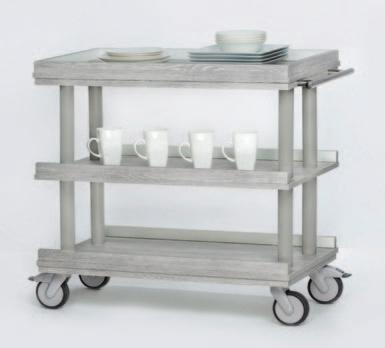







In its 21st Report of Session 24-25, the cross-party House of Lords Secondary Legislation Scrutiny Committee has highlighted concerns about the Government’s plans to tackle the ‘pool’ of care workers who have arrived from abroad but are no longer employed. The report comes after the Committee considered the Home Office’s latest Statement of Changes in Immigration Rules (HC 733).
The Government states that the pool of unemployed care workers has arisen because some employers have failed to provide workers with the hours they were promised, or have subjected them to “appalling exploitation”, including modern slavery. This has led to some employers having their licences to employ overseas workers revoked, leaving the employees jobless.

To address the issue, the Home Office is requiring care providers in England to attempt to recruit from the pool before they can seek to sponsor new recruits from overseas. The Government states that this will assist the workers into employment and will encourage care providers to benefit from a readily available and experienced workforce. Providers will not be obliged to take on workers from the pool and will still be able to sponsor new migrants if no suitable workers are available in the pool.
To help ‘match’ unemployed workers with new employers, the Department of Health and Social Care has established and funded ‘regional partnerships’. Workers losing their jobs will be given contact details for the local partnership, and trusted care sector employers will be also made aware of them. However, a submission to the Committee from the Work Rights Centre suggested that the policy change “is not going to make any material difference”. The Government itself acknowledges that the change “will
not entirely solve the challenges facing displaced care workers” and that there are barriers to the operation of the matching scheme. It is also concerning that the Government appears to have no accurate figure for the number of people in the pool.
The report draws the Statement of Changes to the special attention of the House on the ground that that it is politically or legally important or gives rise to issues of public policy likely to be of interest to the House.
Lord Watson of Invergowrie, Chair of the Secondary Legislation Scrutiny Committee, said:
“Exploitation of care workers has led to a significant pool of migrants living in adverse circumstances, perhaps even experiencing homelessness and destitution. The regional partnerships have so far had limited success in helping them find new employers; even the Government says the performance of the partnerships is “disappointing”. Furthermore, it is worrying that the Government does not seem to have accurate data on the numbers of people affected.
This policy is intended to give the partnership system a boost and, if it does, that would be welcome. However, the Home Office acknowledges that this “will not entirely solve” the problem. The Home Office has said, without providing further details, that it is continuing to explore further ways of supporting those in the pool. The Government should set out what it is doing to understand better the scale of the problem, and what other measures it is considering, or taking, to increase the number of care workers being assisted into new employment.”
Residents at Bradley Hall Care Home in Leicester were treated to an extraordinary day out as they stepped into the world of their beloved Premier League team, Leicester City Football Club.
In a once-in-a-lifetime experience, the group embarked on an exclusive guided tour of the iconic King Power Stadium, immersing themselves in the rich history and electric atmosphere of the club. The adventure began with a close-up look at Leicester City FC’s dazzling trophy collection – a testament to the team’s triumphant legacy in recent years.
The residents ventured through the legendary tunnel leading to the pitch, feeling the rush of excitement as they imagined their football heroes charging onto the field. Residents continued their tour into the press conference room, where the group could almost hear the echoes of post-match buzz and media chatter.

The highlight of the day came when the residents took their seats in the dugout, soaking in the stadium’s vibrant energy and swapping stories of unforgettable matches they have witnessed over the years.
Accompanied by a passionate and knowledgeable tour guide, the group enjoyed fascinating tales about the club’s history, its star players, and the stadium’s evolution. With the freedom to explore at their own pace, the residents found the experience both relaxing and deeply engaging.
For many, the tour of Leicester City FC’s King Power Stadium was a heartwarming blend of nostalgia and new discoveries. It rekindled the Bradley Hall residents’ passion for football in an unforgettable way.
The visit gave them a meaningful chance to connect personally with their local team. It also allowed them to relive cherished memories while creating lasting new ones.
David Donnisthorpe, Bradley Hall resident, stated: “I had such a lovely time! It took me back to my younger days when I used to go and watch the Leicester games.”
Sarah Clark, Bradley Hall Care Home Manager, said: “It is so important to ensure our residents still lead full lives, whether this be revisiting past times or creating new experiences. We are so lucky to be able to enrich lives in this way. The smile on the resident’s faces makes everything worthwhile.”

By Simon Kearsley, CEO of bluQube
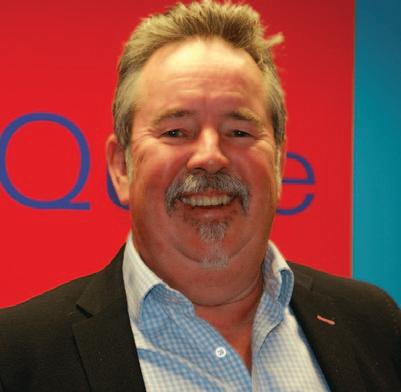
The UK’s hospice sector is under extraordinary financial strain – and the cracks are widening. With government funding covering, on average, only 30% of hospices' total costs, many are reducing core services, laying off staff, or preparing for possible closure. One in five providers has already started cutting care due to rising costs, and the message is increasingly clear: this is not a temporary challenge. It’s an ongoing funding crisis.
While the government’s £25 million emergency hospice fund was welcomed by many, the need for such a bailout highlights how fragile the system has become. Financial pressures are not new – but they are becoming more acute, and more widespread. What’s happening in the hospice sector reflects a broader reality facing care homes and health organisations across the UK: underfunding, rising operational costs, and a lack of the financial infrastructure needed to weather these challenges.
The emergency funding package has helped delay the worst for some, but it does not provide long-term stability. For most hospices, that support has already been absorbed by surging energy bills, insurance premiums and staff costs. At the same time, charitable income – a critical funding stream for many hospices –continues to decline.
The result is a sector stuck in reactive mode, without the financial visibility to plan, pivot, or protect its services. It’s not just about money; it’s about the systems used to manage it. Many care organisations are still working with outdated finance tools – or in some cases, manual spreadsheets – to run multi-million-pound operations. That lack of agility increases risk and leaves decision-makers without the insight they need to respond to rising pressures.
Modern finance systems are no longer a luxury. In today’s climate, they are essential to survival. Cloudbased platforms such as bluQube allow hospices and care homes to view their financial health in real time –not just at month-end. Budget holders can track costs as they happen, reallocate resources quickly, and spot inefficiencies before they become problems.
At a time when every penny must be accounted for, automation reduces admin overhead, eliminates manual errors, and enables organisations to operate with far greater efficiency. Finance teams can spend less time chasing invoices and more time delivering strategic insight.
Weldmar Hospicecare is one organisation that has already taken this step. By digitising its financial operations with bluQube, it achieved a 20% cost saving and dramatically reduced the time spent on manual finance tasks. That means more time and resource focused on patients and families – and less on administrative burden.
Financial pressure doesn’t stop at budgeting. Payroll and compliance requirements are growing more complex – and missteps are costly. For hospices already dealing with staff burnout, recruitment challenges, and regulatory obligations, the additional burden of managing these processes manually is unsustainable.
A modern finance platform can integrate with HR and payroll systems, automating key processes like tax, pensions, and reporting. This reduces errors, supports compliance, and gives teams back valuable hours. In a sector where staff are stretched thin, removing friction from back-office functions can make a meaningful difference.
It’s not just about protecting the bottom line. It’s about protecting the people behind the care.
TIME TO REFRAME FINANCIAL
The current crisis is forcing the sector to ask difficult questions. How do we continue delivering quality care with unpredictable funding and growing costs? How can we adapt in real time, not after the fact? And how can we make every resource stretch further?
What’s happening in hospices now could easily become the future for many care homes – unless there’s a shift in approach. Financial transformation isn’t just for large corporations or tech firms. It’s a necessity for every care organisation that wants to remain sustainable and focused on frontline delivery.
At bluQube, we’ve seen the difference financial visibility can make. Organisations equipped with real-time data and automation are more resilient, more responsive, and ultimately more capable of protecting their services.
Short-term relief will always have its place – but long-term sustainability demands smarter systems and better decisions. Now is the time for care providers to prioritise financial infrastructure as the foundation for operational strength and, more importantly, patient care.
Bramwell Care Home, part of the Runwood Homes Group, recently hosted a heartwarming celebration for one of its residents, marking an incredible 66 years of marriage with a romantic threecourse dinner at the home’s Cute and Cosy Café. The event took place on 2nd March, bringing together family members and staff to honour this special milestone.
Home Manager Mable, shared the significance of such celebrations, stating, “At Bramwell, we believe in family celebrating their memorable time together. We ask our residents about their special days - birthdays, anniversaries—and make sure they are treated and celebrated in a meaningful way.”
The initiative stems from a heartfelt desire to reunite couples who may be separated due to care needs. Often, one spouse resides in the care home while the other remains at home, making it difficult to celebrate such important occasions. Bramwell Care

The pobroll® is the invention of Pat O’Brien, a physiotherapist, Moving and Handling trainer, and Conflict Management tutor with over two decades of experience in care homes and nursing homes
Care home managers often face challenges in delivering intimate care while balancing efficiency and managing costs, particularly when these essential tasks provoke behaviours that can be challenging to safely manage. Traditional methods—especially for bed-bound residents—often lead to lengthy processes and frequent linen changes, driving up costs and consuming valuable staff time. The pobroll® provides a transformative solution that supports dignified care, achieves significant cost savings, and reduces the need for additional staffing.
The pobroll® is an innovative bed-bathing wrap specifically designed to enhance comfort and dignity during personal washing for individuals who require in-bed care. Centred on the resident’s experience, it minimizes distress by providing sensory comfort. Crafted with two layers of high-quality cotton-terry toweling and a waterproof layer in between, it delivers a soothing, calming experience while keeping the bed completely dry. Sized for a standard single bed, the pobroll®’s dual-layer design offers warmth and a sense of security and privacy, allowing residents to maintain comfort and dignity during bed-based bathing routines.
BOOSTING COST
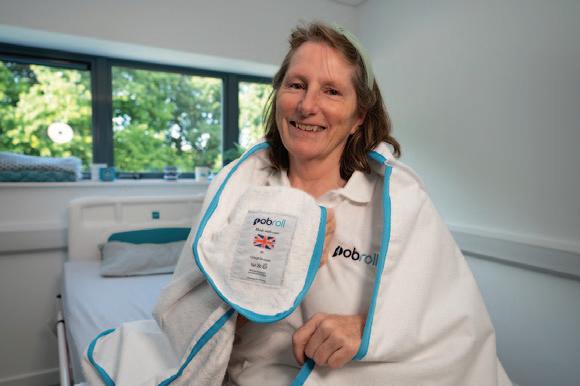
The pobroll®'s waterproof design enables caregivers to provide a complete wet wash without the risk of soaking the bed, minimising the need for frequent linen changes. This leads to fewer laundry loads, reducing labour and utility costs, as well as wear on linens. By reducing logistical tasks, caregivers have more time to focus on direct resident care, enhancing productivity overall. Additionally, reduced reliance on disposable wipes results in further cost savings and supports environmentally sustainable practices. With its durable, reusable design, the pobroll® maintains hygiene standards and allows for extended use across multiple residents. As care homes face increased pressure to adopt sustainable practices, the
Home sought to bridge that gap by offering intimate dining experiences to bring loved ones together.
During the celebration, the couple dressed up for the occasion and enjoyed a beautifully prepared meal, complete with a glass of wine of their choice. The atmosphere was filled with joy and nostalgia as their extended family joined in to share the moment.
The event left a lasting impression on those in attendance. One family member expressed their gratitude, saying, “We had an enjoyable meal with excellent service—such a lovely day. The whole family felt very welcomed.”
As Bramwell Care Home continues their tradition of making residents feel cherished, this anniversary celebration stands as a shining example of how small gestures can make a world of difference in creating meaningful moments.
pobroll® provides an effective solution that supports both economic and environmental goals.
Managing resident agitation—particularly for those with dementia—often requires specialised training in restraint techniques. The pobroll® significantly reduces the need for physical intervention by providing a warm, secure covering that alleviates resident distress. This gentle approach minimizes aggressive or defensive reactions, reducing the number of staff needed for these interactions. As a result, facilities can potentially lower staffing levels without compromising care quality, yielding substantial cost savings. Additionally, reduced dependence on physical intervention decreases training costs associated with restraint techniques. By simplifying the process of intimate care, the pobroll® reduces the need for specialised training, making onboarding smoother and lowering turnover-related training expenses.
The pobroll® supports compliance with restraint reduction guidelines, helping facilities minimise documentation burdens and regulatory liabilities linked to physical interventions. This non-invasive solution improves safety for both residents and caregivers, fostering a culture of dignity and respect that boosts satisfaction among residents and their families.
CONCLUSION: A VALUABLE ASSET FOR QUALITY CARE AND COST MANAGEMENT
For care homes, the pobroll® represents a strategic investment, offering measurable savings by reducing reliance on disposable products, lowering laundry and training costs, and enabling efficient staffing. Most importantly, it prioritises resident dignity and comfort, setting a high standard for compassionate, personcentred care. For facilities seeking to enhance financial performance and care quality, the pobroll® is an invaluable addition to their resources.
see
page.
Councils have warned that there is just 12 months to avert a financial catastrophe for local authorities, with £6bn in special educational needs and disabilities (SEND) deficits set to be placed on their balance sheets in March 2026 unless government takes action.
These ‘unmanageable’ deficits have been rapidly growing for years as demand and costs for SEND services has soared. Since 2020 councils have been given accountancy immunity, meaning they do not have to include these giant and growing deficits in their budgets.
But that accountancy trick – called the statutory override – is due to end in March 2026.
The County Councils Network (CCN), which represents England’s largest councils, says if government does not urgently address this issue and if these deficits are placed onto council budgets in 12 months’ time, it could trigger a wave of bankruptcies.
A survey carried out by the CCN found that if the override ends in March next year with the deficit placed onto budget books, 18 county and unitary councils will be insolvent overnight: half of its member councils. A further six would follow in 2027, bringing the total to 24 councils.
Research by CCN has shown that these deficits are being driven by councils spending record amounts on SEND services as a result of an explosion in young people in receipt of Education, Health and Care Plans and the costs of specialist school placements. These cost on average £58,000 per pupil: seven times higher than placing a child with an EHCP in a non-special school.
Nationally, the number of young people on EHCPs has soared from 240,183 in 2015, when government introduced reforms which widened eligibility, to 575,973 in 2024.
At the same time, SEND deficits which have been kept off councils’ books due to the statutory override have ballooned in tandem with increased demand, and are set to more than double in just a 24-month period.
These deficits were estimated to be £2.4bn nationwide last March by the Association of Local Authority Treasurers and the Society of County Treasurers, and are in line to rise to £5.9bn by the time the override runs out in March 2026.
County and unitary councils account for half of that national figure – amassing deficits of £2bn last year, which are projected to increase to £2.7bn by the time the override runs out.
Despite the government announcing it was to reform the SEND system with a white paper promised, it has not given local councils clarity on how it intends to manage these gigantic deficits.
In a November policy paper, the Ministry of Housing, Communities and Local Government said it would set out government’s plans for the future of the statutory override in December’s provisional Local Government Finance Settlement. But when the settlement was published, it only stated that ‘the government intends to set out plans for reforming the SEND system next year’.
But with less than 12 months now on the clock, the CCN says it is urgent that government provides immediate clarity to councils and a national solution on how the Treasury intends to manage councils’ high needs deficits.
Cllr Kate Foale, Special Educational Needs and Disabilities Spokesperson for the County Councils Network, said: “The clock is ticking to March 2026 and we are now just twelve months away from what would be a financial catastrophe for local councils if these unmanageable SEND deficits are placed onto local authority’ budget books.”
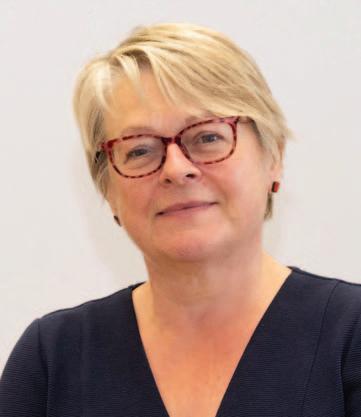
“If that happens, half of England’s largest county and unitary councils will be insolvent overnight and virtually every upper-tier council across the rest of England will tell you that the prospect of having to address and pay down these deficits would risk their financial sustainability.”
“We know that the government has committed to reforming the SEND system, which is a vital step in the right direction, but the future of the statutory override is not a can to be kicked down the road. We need urgent clarity on how the government intends to manage these deficits, including a national solution to the issue. We also would like to know how addressing these deficits will fit into the government’s reform agenda, bearing in mind that solving this financial crisis will only ever be one part of the solution to the wider
SEND crisis”
Moors Manor care home in St Leonards recently presented Ellingham Inclusive water ski and wakeboard with a cheque for £1250 to purchase an adapted seating ski to provide water skiing experiences for people with disabilities.
The grant had been awarded by Barchester’s Charitable Foundation, a charity that helps older people and adults with a disability or mental health problems across England, Scotland and Wales by offering grants to help people connect or re-connect with others in their local community.
Gemma our General Manager went to Ellingham Waterski and Wakeboard Club to present the cheque and to see the water ski the money had purchased.
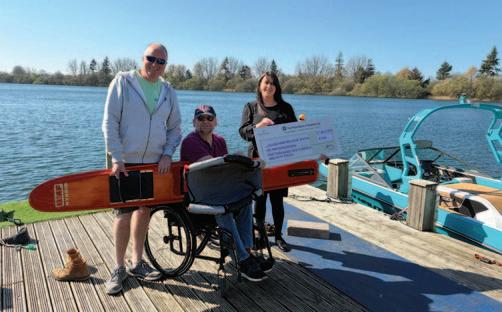
We met with volunteer Adrian and regular attendee Ben who has spent many an afternoon on the water.
Adrian Yates, Volunteer, said “With having this adapted ski we are now able to offer the opportunity to waterski for those individuals with a disability. We now hold a couple of sessions each month for people to come along too”.
Gemma Chalkley, General Manager at Moors Manor Care Home, said: “We are always keen to show as much support as we can to local charities. This charity is very close to the home and to be able to help fund equipment which enables more people to enjoy this activity is wonderful. We are now going to see which residents at the home would like to enjoy this activity.
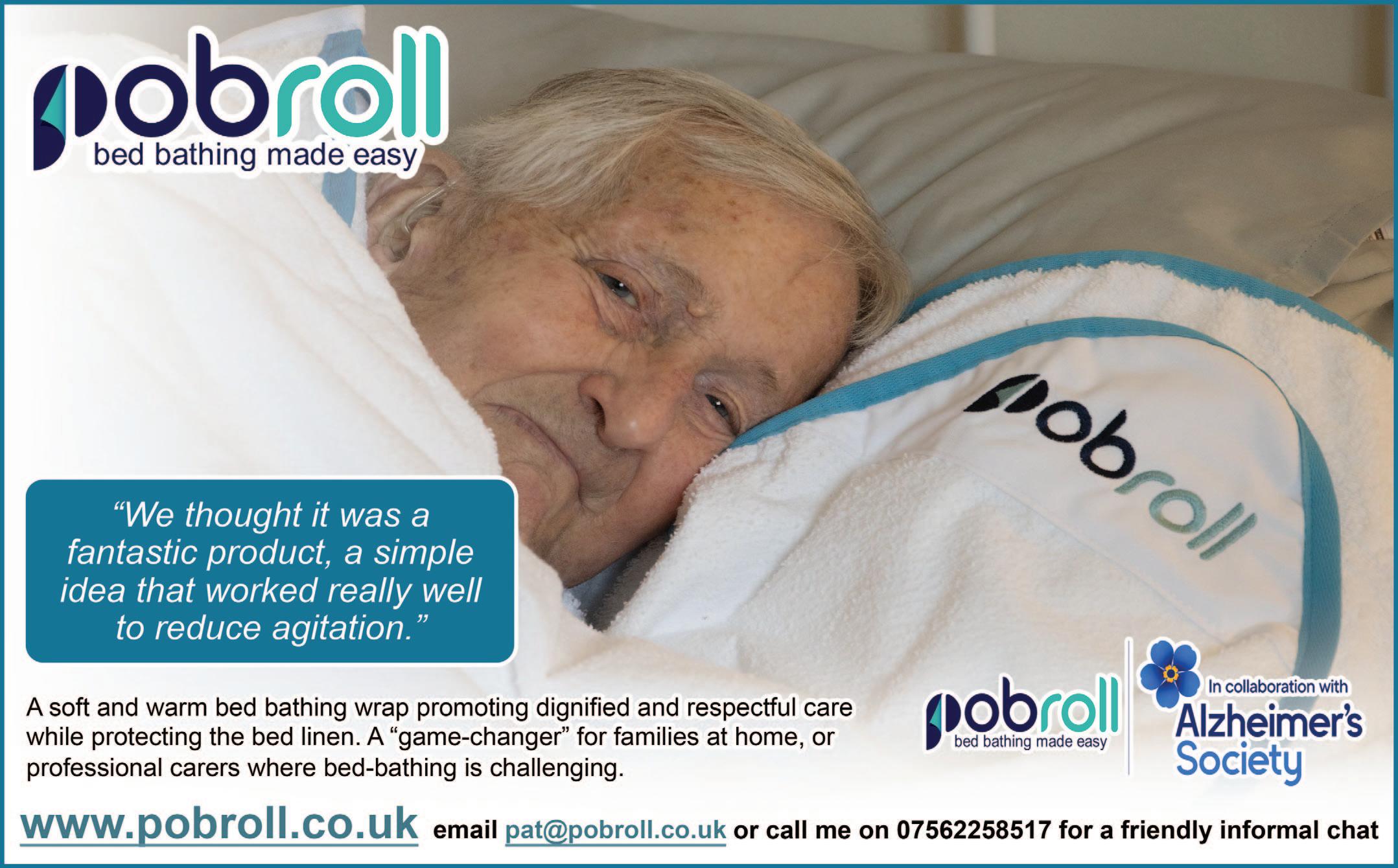
Chancellor Rachel Reeves’ Spring Statement on March 26, 2025, has intensified concerns within the UK’s social care sector, spotlighting the enduring issue of underfunding and the looming financial strains poised to affect millions who rely on these essential services.
Chronic underfunding, combined with the government’s recent decision to increase Employer National Insurance Contributions (ENICs), is pushing, sector leaders say, the sector closer to breaking point. Despite efforts from the House of Lords to shield care providers from these additional costs, the government has moved forward with measures that could have devastating consequences for millions relying on care services.
The Nuffield Trust has warned that social care has been “once again hung out to dry,” as the government’s decision to raise employer NICs will significantly increase the financial burden on care providers.
Nuffield Trust Senior Policy Analyst Sally Gainsbury said:

“Today’s (March 26) announcements have added to the already substantial pressures being felt in the health service. They mean that the day-to-day health budget for next year will grow by less than 2% in real terms, after adjusting for the impact of national insurance increases in the NHS. This compares to a long-term average of nearer 3%.”
“The government has highlighted opportunities for savings made to central administration costs to be reinvested into the front line, such as through dismantling NHS England. It’s absolutely right to drive down duplication and waste when the health service is under such pressure. But these savings are unlikely to deliver anything like the boost to funding needed to keep up with population demand.”
“Over the last decade and a half, successive governments have repeated the same mistake of underestimating the level of funding growth required to keep up with growing patient needs and expectations, resulting in chaotic last minute top ups to the budget. This has already happened for the budget for the current financial year, which had to be supplemented with an extra £800m for the NHS just four months after the Chancellor’s autumn statement.”
“Adult social care has once again been hung out to dry. Today’s statement confirms the absence of funding to cover extra costs, which we estimate will amount to £2.8bn from Employer National Insurance Contributions and minimum wage increases for care providers. This will likely lead to many providers going bust or reducing services, meaning people will suffer from less choice or poorer quality care.”
“The government has promised long-term reform of adult social care with the upcoming Casey Commission. The newly announced Transformation Fund offers billions of extra funding for reforming public services, but it’s unclear whether any of this will be used for desperately needed changes to adult social care. Today’s worrying financial outlook risks jeopardising the sector before Baroness Casey’s feet are even under the table.”
David Ashton-Jones, Chief Executive at Homes Together said:
“The government’s Spring Statement may focus on the economy, but it overlooks the chronic underfunding of social care, which puts millions at risk. Care providers need sustainable funding to continue delivering highquality services. Ongoing financial uncertainty from local authorities, rising National Insurance costs, and welfare cuts add further strain on the sector.”
“With 3.2 million families set to be affected by benefit reductions, many vulnerable individuals will struggle to access care, pushing even more pressure onto an already stretched system. Without urgent action, the funding shortfall will leave care providers unable to meet rising demand, especially in areas like Harrogate, where specialist care is crucial. We need sustainable investment to ensure people with complex needs receive the support they require without adding further pressure to local health and social care services.”

“Private care providers are already stepping in to fill the gaps left by underfunded public services, but we cannot do this without government support. Without realistic funding, long-term investment, and protection for those reliant on benefits, we risk a capacity crisis that could threaten the entire sector.”
Liz Jones, Policy Director at NCF commented:
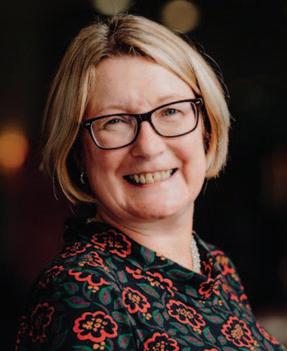
“Since taking office following the General Election result last summer, the government has reiterated its messages around cost-savings, balancing budgets and making difficult decisions. We have since seen the “catastrophic impacts” of the increases to Employer National Insurance costs passed by the government this week despite the best efforts of the House of Lords which Nuffield Trust describe as social care having “once again been hung out to dry”. All this combined means that we arrive at the Spring Statement with trepidation.”
“It is clear that the statement today, on top of the welfare reform announcements last week will create far reaching impacts on the millions of people who rely on care and support services every day to live good lives, many of whom are supported by our not-for-profit members. There is nothing in this statement for the many organisations across the adult care and support sector working hard every day to provide care and support services to help people live fulfilled lives.”
Despite repeated calls from care sector leaders for sustainable funding social care continues to be treated as an afterthought in government spending plans.
The failure to exempt social care providers from the ENICs increase once again highlights the government’s lack of commitment to securing the future of care services. Dr. Jane Townson OBE, CEO of the Homecare Association, has expressed deep concern, warning that without urgent support, many homecare providers will struggle to stay afloat.
Laura Davies, Chief Operating Officer at The Good Care Group, said:
“Today’s spring statement was yet another missed opportunity from the government to invest in social care. Demand for care is currently at a record high, and pressure on the healthcare system is reaching breaking point resulting from a lack of adequate investment, and decades of cuts.
“The Lords’ attempted amendments to the National Insurance Contributions Bill was a clear signal that the sector is in desperate need

of relief. Without urgent long-term funding, the recent hikes will only add to these pressures.
“While Secretary of State for Health & Social Care, Wes Streeting just this week announced the NHS plan will see funds allocated to social care, there must be more clarity on the timing and roll out of this proposed investment.
“With care providers facing increased costs, unregulated care could soar due to these care providers being less impacted by training or compliance costs. This could increase the risk of inadequate care, as there is also no requirement for background checks on staff at unregulated care agencies.
“It is not only older people who are affected. The government’s confirmation of stricter qualification criteria for PIP payments, and the freezing of universal credit incapacity benefits, could have a profound impact on people’s standard of living and ability to fund their care. Also, while the government confirmed earlier this year it would be providing a boost to the Disabled Facilities Grant for home adaptations, the upper limit for individual payments hasn’t been increased since 2008. It’s vital the government prioritises long term solutions for the sustainability of care and communities, rather than continuing to take drastic measures to make short term savings and kicking long-term sustainability of the care system into the long grass.”
Dr Jane Townson of The Homecare Association said:
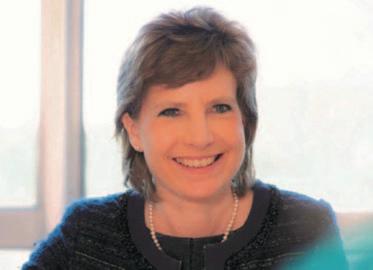
“The government talks about change, yet we see the same neglect of social care – only now, with even higher costs. By refusing to exempt care providers from the increase in Employer National Insurance Contributions (ENICs) while failing to uplift local authority funding to meet increased costs, the government is driving homecare services towards collapse.”
“We are being forced to face a grim reality – cut care, slash quality, restrict pay, or close the doors of services. The consequences of this will be felt by thousands of older and disabled people will, by families forced to give up work to care, and by an NHS already under extreme pressure.”
The Homecare Association highlights decisions in the Autumn Budget 2024 have added about 10% to provider costs. Yet today’s Spring Budget makes no attempt to mitigate this or to close the £1.8 billion homecare funding gap that exists.
“We keep hearing about ‘home first’ and ‘fair pay for care workers’, but this Budget blows a hole through both,” Dr Townson continued. “You can’t have fair pay without a fair price for care. You can’t keep people at home without sustainable services to support them.”
The Association’s newly published Minimum Price for Homecare 2025-26 sets the hourly cost of delivering regulated homecare in England at £32.14 – the minimum needed to meet legal obligations and pay careworkers fairly. Shockingly, only 1% of local authorities currently pay rates that meet even the 2024-25 minimum.
“We support Labour’s aspiration to invest more in social care for better outcomes and better value, but so far, that promise is rhetoric, not reality.”
“Without urgent action from this government, the UK risks the collapse of homecare services. The time for lip service is over. We need investment – now.”
Dame Jennifer Dixon, Chief Executive of the Health Foundation, said:
"The fiscal outlook requires difficult choices, but the decisions taken in today’s Spring Statement will hit some of the most vulnerable people the hardest and risk damaging the nation's health and future prosperity.
“Reforms to the welfare system include proposals to cut and freeze the health element of Universal Credit and restrict eligibility for Personal Independence Payments. The government’s own impact assessment projects that this will leave 3.2m families worse off and 250,000 more people in relative poverty by 2029/30, which can further erode their health and ability to work.
“It is important to support more people to stay in work and reduce economic inactivity through fundamental reforms to improve health.

Welcome measures in last week's welfare reform green paper aiming to prevent people from being forced to leave employment due to ill health risk being undermined by cuts to benefits that will leave many people worse off, in worse health and less able to return to work.
“On the NHS, the Chancellor highlighted improvements in reducing waiting lists. The focus now shifts to the Spending Review and the long-term reforms that will be set out in the forthcoming 10-year-Health Plan. However, swingeing cuts to NHS bodies, including the abolition of NHS England, will cause huge disruption at a critical point. It’s not too late for the government to step back from the brink and find a less disruptive way of achieving their objectives than embarking on a distracting top-down reorganisation of the NHS.
‘Social care was notable by its absence from the Chancellor’s speech. It is deeply disappointing that calls to support the sector with the additional costs of increases in National Insurance contributions and the National Minimum Wage have largely been ignored. This will heap further pressure on a struggling sector and risks reducing people's access to publicly funded care. The Social Care Commission’s work to develop a long term plan for reforming social care cannot come soon enough.”
Sarah Woolnough, Chief Executive of The King’s Fund said: ‘While today’s statement was not a definitive moment for NHS spending, the Chancellor’s announcements, and the economic headwinds that drive them, will have consequences for people’s health.
‘The Office for Budget Responsibility's accompanying assessment of today's spring statement reveals that 'unprotected' departments outside of health, education and defence will need to be cut from next year’. Such cuts could have knock on effects on people's health, and demand for health and care services.
‘The NHS is not an island. There are a range of public services that impact our health, as they determine things like the quality of housing, access to green space, and availability of transport. Similarly, the extent to which the NHS can help keep the nation healthy will impact on demand for some other areas of public spending.

‘To this point, the disability benefit reforms announced last week, are in part reliant on health and care services being in place to support people back to good health. As it stands, many of those NHS services are not routinely and reliably available across the country.
‘The upcoming Comprehensive Spending Review(CSR) will provide more detail in June. And when the inevitable difficult choices are made, we hope that the plan to improve the nation’s health does not get knocked back by fiscal decisions in other areas.’
Researchers in Newcastle have been awarded £1.6 million to develop a network which will support people living with dementia by connecting existing technology and services.
The Technology Empowered Dementia Independence (TEDI) Network Plus has been funded through the UKRI Engineering and Physical Sciences Research Council (EPSRC) and the National Institute for Health and Care Research (NIHR), in partnership with the Alzheimer’s Society.
Professor Dame Louise Robinson, at Newcastle University, will work with colleagues at Northumbria University and the University of Cumbria, as well as NHS Trusts and a wide variety of stakeholders across the North East and North Cumbria (NENC) region, including NortHFutures – a digital health hub for the North East and North Cumbria.

With the highest proportion of people living with dementia per head of population in England, as well as significant socio-economic challenges, digital inequalities, and rural accessibility issues, the NENC region will provide the ideal location to develop and test this new approach.
As the largest integrated care system in England, serving over 3.1 million people, the region provides a unique opportunity to demonstrate how a connected life with dementia, supported by technology, can become a reality.
Professor Dame Robinson, Professor of Primary Care and Ageing; Regius Professor of Ageing, Newcastle University, said: “Through the TEDI network, we aim to widen access within our region to existing technologies for families living with dementia and the professionals supporting their care and also facilitate the codevelopment of new technologies.
“Newcastle University already co-leads a dementia plus network on Inequalities in dementia care and through TEDI, we will explore the role of assistive technologies in as a solution to such care inequity.”
Over the next three years, TEDI Network Plus will focus on three key objectives. The first is to identifying gaps in the current system by mapping out the life course of a person living with dementia in the NENC region. This will highlight interactions with services such as hospital admissions and help pinpoint areas where technology and data-sharing could enhance support.
The second objective is to develop and test new solutions, with funding and support provided for collaborative projects between people with dementia, family caregivers, social care providers, healthcare professionals, and researchers. A core team of designers, developers, and dementia experts will work to create user-friendly and effective technological solutions.
The final aim of the project is to improve access to technology, with local technology hubs trialled across
NENC to provide individuals with hands-on opportunities to explore, borrow, and receive guidance on assistive technologies. Held in accessible, community venues, these hubs will ensure that people with dementia and their caregivers can access tools that meet their specific needs, helping them maintain their independence for as long as possible.
TEDI Network Plus will also collaborate with other EPSRC-funded Network Plus initiatives to explore how their technological innovations can be integrated into dementia support systems.
Professor Charlotte Deane, EPSRC Executive Chair, said: “Dementia is a major challenge in the UK and globally. As people are living longer, the number of people living with dementia is increasing.
“With most people wishing to remain at home, we are investing in research that could lead to new technologies and innovations that will help keep people safe and independent.
“These networks will bring together a wealth of expertise from across academia, healthcare, charities and, crucially, people with lived experience to find solutions that will lead to healthier and more fulfilling lives for those affected by dementia.”
Network partner Alzheimer’s Society has been funding ground-breaking dementia research and innovations for over 30 years, including world-leading research that has shaped care and support for people with dementia across the UK.
Professor Fiona Carragher, Chief Policy and Research Officer at Alzheimer’s Society, said: “One in three people born today will develop dementia in their lifetime. Research will beat dementia, and innovative networks like these will play an important part in helping people living with dementia today, and in the future, live independently for longer.”
Minister of State for Health, Karin Smyth, said: “Dementia is a cruel and heartbreaking disease, not only for those living with it, but for the families and friends who often watch their loved one become a shadow of the person they once were.
“Backing these groundbreaking technologies won’t just help people with dementia – it’ll transform their lives, giving people the freedom to stay in their own homes, around the people they love.
“Moving care out of hospitals and into communities isn’t just smart healthcare – it’s about giving people independence. Britain will be at the forefront of dementia innovation, backing cutting-edge research and rolling out life-changing technologies that deliver real results for patients and families.
“This is exactly the bold thinking we need at the heart of our Plan for Change.”
This Spring, Recreo VR is offering care homes an exciting opportunity to enhance resident wellbeing through the power of Virtual Reality (VR). By signing up for one of our 24-month Recreo Theatres packages, you’ll receive a free VR headset and staff training.
Our platform provides person-centred, budget-friendly activities that are fun, engaging, and accessible, especially for residents who are bedbound or socially isolated. Co-created with Alzheimer’s Society and individuals with dementia, our service empowers staff to deliver personalised reminiscence and one-to-one sessions that promote memory recall and connection.
Our VR headsets have been recognised as good practice by the Care Quality
Commission (CQC), further validating their impact on care. Regular use of Recreo VR has a proven positive effect on wellbeing, with residents reporting increased activity, engagement, and social connection, often leading to a reduction in the need for PRN medication.
Whether combating loneliness, promoting relaxation, or enhancing cognitive health, VR offers a non-pharmacological solution to enrich care and elevate quality of life. Don’t miss out! Take advantage of this exclusive offer and see how VR can transform your care home experience.
For more information, visit recreovr.co.uk. Or contact us at info@recreovr.co.uk or 01482 526940.
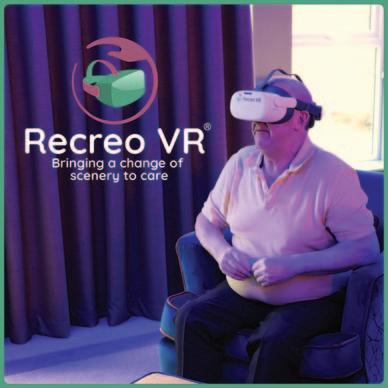
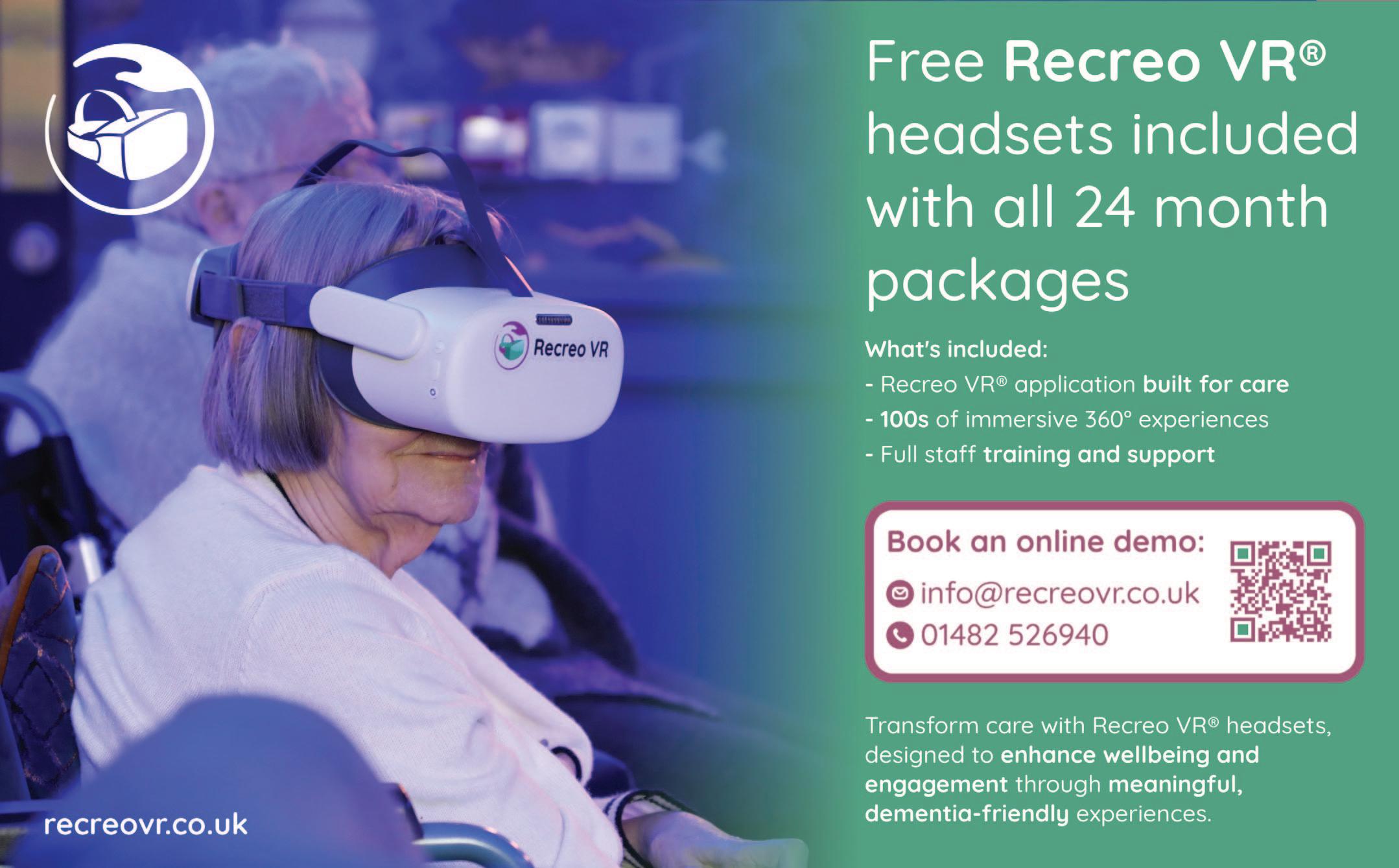

Following last month’s Swallowing Awareness Day. Dominique St Clair Miller, Speech and Language Therapy Director, Cygnet Health Care (www.cygnetgroup.com), has shared her reflections on how we can support individuals living with dysphagia, and how we can all get involved with swallowing awareness and choking prevention.
Picture this:
You are sitting around a table with your closest family and friends; everyone is chatting and the room is filled with laughter.
The aromas of your favourite meal fill the air; your tummy rumbles and your mouth starts filling with saliva. “Hmmm… can’t wait to eat!” you think to yourself.
Moments later, the food is brought to the table. Each person is served a beautifully presented portion of what’s been cooked... and without another though, you all ‘tuck in’. You savour the first mouthfuls, compliment the person who cooked and carry on enjoying the delicious meal and great company.
Now picture this:
This time, when your portion of food is served, it doesn’t look like everyone else’s and somehow, you don’t feel as excited to eat it. But you know you must eat so that you don’t lose weight.
You focus, trying to block out the chatter and laughter, taking care not to overload the fork - you concentrate on chewing thoroughly before you swallow. You swallow a second time to make sure your mouth is clear.
You cautiously take your next mouthful. Someone asks: “you enjoying that?” but you daren’t answer whilst you have food in your mouth, because the last time you did that, you started violently coughing…
In fact, you daren’t join in any conversation for the same reason. Instead, you sit quietly and think about chewing every mouthful, taking your time, so much so that by the time you finish your meal, your food is cold and everyone is patiently waiting for dessert to be served.
This is the reality for millions of people living with eating, drinking and swallowing difficulties (dysphagia –pronounced “dis-FAY-juh”). For them, snack times and mealtimes can feel more of a chore, less sociable, the food less appealing and at times the experience can be scary.
But it doesn’t need to be this way. So, today, this Swallowing Awareness Day 2025, we want to help you think about what we can do to make mealtimes as comfortable, enjoyable and safe as possible for those living with dysphagia.
HOW COMMON IS DYSPHAGIA AND WHO IS AFFECTED BY IT?
Dysphagia is more widespread than you might think. Here are some key statistics:
• In one study, up to 30% of people in a mental health population showed signs of dysphagia
• Up to 78% people who have had a stroke experience dysphagia
• Up to 94% people living with Alzheimer’s disease develop difficulties swallowing
• 93% people with a traumatic brain injury will experience dysphagia following the injury
• 40-50% of adults with learning disabilities experience swallowing difficulties
Despite these numbers, dysphagia is often overlooked, leading to serious health risks if not properly managed.
THE IMPACT OF DYSPHAGIA ON HEALTH AND WELL-BEING
1. Physical Health Risks
Dysphagia isn’t just about difficulty swallowing - it can have life-threatening consequences:
• Choking and aspiration – Food or liquid can enter the airway, increasing the risk of choking or pneumonia
Malnutrition and dehydration – Struggles with eating and drinking can lead to weight loss, weakness, and a weakened immune system
Frequent hospitalisations – Aspiration pneumonia is a leading cause of hospital admissions for people with dysphagia
2. Emotional and Social Impact
Mealtimes are a social experience, but for people with dysphagia, they can be frustrating and isolating:
• Anxiety about choking can make people fearful of eating Avoidance of social meals can lead to loneliness
• Loss of independence when needing help with feeding can be disheartening
Frustration as a result of food restrictions - missing out on favourite meals
The right support can help people feel safe, confident, and included at mealtimes.
10 TIPS FOR SUPPORTING PEOPLE WITH DYSPHAGIA AT MEALTIMES
Whether you’re a caregiver, family member, or healthcare professional, these 10 simple steps can improve the dining experience for someone with swallowing difficulties:
1. Create a calm and comfortable setting, offering suitable seating
A relaxed environment with minimal distractions helps people focus on eating safely. Simply switching down the volume or switching off the TV or radio can help. Others may benefit from eating and drinking with fewer people around them.
Wherever possible, encourage the person to sit upright on a dining chair and at a dining table to ensure the best position for eating, drinking and swallowing. If an upright position is not achievable for an individual, seek advice from an SLT, OT and physio to ensure the best possible but sustainable position is achieved.
2. Follow the recommended food and drink textures
Speech and language therapists (SLTs) provide personalised eating, drinking and swallowing (EDS) guidelines - always follow this guidance to optimise safety when eating and drinking.
Be sure you are familiar with the descriptors for the diet or fluids that has been recommended for the people with the eating, drinking and swallowing needsWhen food or drink is served, use the approved IDDSI testing methods to ensure these correctly to match the necessary consistency.
3. Provide the appropriate and recommended level of supervision and support
Typically, someone with eating, drinking and swallowing needs may benefit from - or even require - a level of supervision or support when eating and drinking and this will be outlined in their EDS guidelines. However, communication is a key part of providing effective support. Be sure you are aware of what instructions or prompts you may need to provide to the person before, during or after eating and drinking.
Use a clear but calm and reassuring tone.
4. Encourage slow eating and smaller mouthfuls
Rushing can increase risk of aspiration and choking. Encourage small mouthfuls, thorough chewing, and slow pacing of eating and drinking.
5. Watch for signs of difficulty
Look for signs and symptoms that would suggest that the person is not managing their food and drink. Report and document any signs of difficulty you notice. Request an assessment or review from the Speech and Language Therapy if needed.
6. Keep nutrition and hydration in mind
If a person requires a modified texture diet or thickened fluids, make sure you monitor oral intake. Weight loss (and therefore malnutrition) and dehydration are potential secondary risks so make sure the person is weighed regularly and ensure they are offered frequent and enjoyable hydration options / drinks.
7. Use adaptive equipment if needed
Special cups, straws, and cutlery can help people to control the volume of food or drink they take with each mouthful and well as to eat and drink more independently.
8. Prioritise dignity and promote choice
Even with dietary restrictions, involve the person in meal choices to ensure food remains enjoyable, aligned with dietary and cultural considerations.
If the person misses something in particular in their diet, it is likely that this can be reintroduced in a safe and / or risk-assessed manner.
9. Maintain your knowledge & awareness and follow specialist advice
Stay up-to-date with your mandatory dysphagia training and make the most of IDSSI resources which have been produced as part of the Choking Awareness and Prevention Campaign. Your mandatory training and additional educational resources are designed to provide you with the knowledge and information you need to provide effective support to people with dysphagia.
10. Make mealtimes a positive experience
Eating should be about more than just nutrition. A calm, reassuring and inclusive atmosphere can help reduce stress, help people pace themselves when eating and drinking and improve appetite.
SPREADING AWARENESS AND TAKING ACTION
Dysphagia is more than just a swallowing problem - it’s a serious condition that affects health, well-being, and quality of life. But with awareness, compassion, and the right support, we can make a real difference.
The residents and staff at Elm Bank care home in Kettering were delighted in welcoming local school children from St Peter’s School, Kettering, to their home for a magical afternoon of spring songs. It was an afternoon that allowed the residents to immerse themselves in the joy of spring and all that it has to offer.
Residents were very excited to have beautiful young voices echoing throughout the home spreading spring joy to all. The residents enjoyed an afternoon of singing along with songs that they knew and reminisce about when they were young and at school. It was a beautiful afternoon that was perfect to start celebrating the changing of the season. The pupils also delighted the residents with their new instrument, the ‘pBuzz’, for many of the residents it was the first time that they had seen the

instrument and heard it being played.
Resident Hilda said, “It was lovely, to see all the children and to hear them sing so wonderfully, they all looked so smart and listening to them was lovely, I can say for all that it was certainly enjoyed.”
Marvellous Bindura, General Manager said,
“It is always lovely to invite the local school children in at this time of year, and to hear them sing their songs to us all is simply beautiful. It means so much to the residents and all the staff, it allows for the young and the old to mix and the wonderful experiences are shared. I believe as do we all here at the home it is crucial to create links with our local schools and within the community to continue for our residents to remain a part of the community, it enriches the lives of all in many ways.”
The delivery of Care Services in the Falkland Islands has taken a giant leap forward with the official opening of Tussac House, the Islands’ first purpose-built care facility.
Tussac House will provide an extra care facility to members of our community in a new state of the art building bringing together technology and person-centred care to enhance our residents’ independence.
The construction of Tussac House was carried out by RSK Falklands Ltd on behalf of the Falkland Islands Government (FIG) working from a design by ONE Creative environments.
Tussac House will provide a focal point for Care Services for the community with the building consisting of 27 extra care apartments (two of which are bariatric), 10 single en-suite rooms for individuals with higher levels of care and support needs and two short term suites for respite-care.
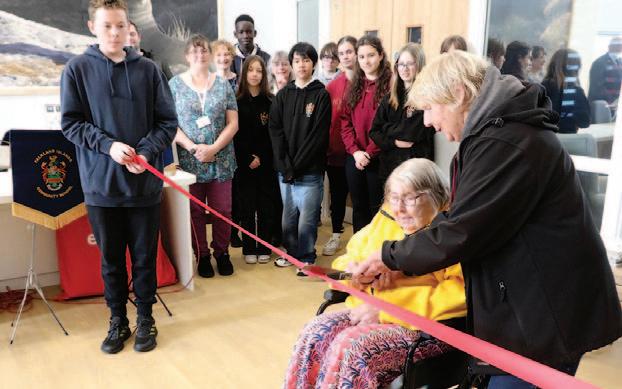
Together with the associated staff and ancillary services the facility and service is designed to be adaptable to the changing needs and abilities of the individual. The opening of Tussac House, alongside the investment of recent years in Care Services, has allowed for the care needs of the vulnerable members of our community to be better met, now and into the future. Member of Legislative Assembly John Birmingham, portfolio holder for Health and Social Services, also commented: “The official opening of Tussac House is a milestone in the progress of care services provided to our community. It’s a day when we can all be optimistic about the future services that will be provided not only on-site here in Tussac House, but also as the hub of all things connected to care in the community”.
Unpaid carers in employment on a low income will benefit from a welcome rise in the earnings limit on Carer’s Allowance, allowing them to earn up to £2,340 more per year.
From 7 April 2025, working carers can earn up to £196 per week after certain deductions, the equivalent of 16 hours at the National Living Wage, and continue to claim Carer’s Allowance. This is an increase of £45 compared to the previous earnings threshold of £151.
Charity Carers UK is welcoming the change, which is the largest increase in the earning limit for the benefit since it was introduced in 1976. It will allow 60,000 more carers to access Carer’s Allowance, providing vital income for those juggling work and care. However, the charity is also concerned about changes to Personal Independence Payments (PIP) outlined in the Government’s welfare reform green paper. As PIP is a ‘gateway’ benefit impacting eligibility for further support for carers, this will see 150,000 people lose their Carer’s Allowance by 2029/30.
Carer’s Allowance, the main benefit for carers, is available if you spend at least 35 hours a week looking after someone who is disabled,
ill or elderly. The increase to the earnings limit this month will help thousands of carers – whose earnings were previously above this amount – to access Carers Allowance for the 1st time.
Carers UK has long been calling for the earnings limit to be tied to the National Living Wage so that carers do not have to reduce their hours as the earnings limit fails to keep up with increases to the National Living Wage. The charity says regulations to formally tie Carer’s Allowance to the National Living Wage must follow.
The earnings limit increase will help carers in the labour market to stay in work and increase their earnings potential. However, for those who are unable to combine work and care, Carer’s Allowance – the main carers’ benefit – remains the lowest benefit of its kind. From 7 April 2025, it will rise by 1.7% from £81.90 to £83.30 per week, which is less than the price of a first-class postage stamp.
Government plans for welfare reform could also mean less people are eligible for Carer’s Allowance in the future. There are an estimated 1.2 million carers living in poverty across the UK. Research from Carers UK has found that 42% of carers receiving Carer’s Allowance are strug-
gling to make ends meet and 90% of carers do not think this benefit offers sufficient financial support.
Helen Walker, Chief Executive of Carers UK, said: “Unfortunately, we are looking at a game of two halves. Last year in the 2024 Autumn Budget we welcomed news that the limit on Carer’s Allowance would rise, which is a much-needed step forward, helping carers in employment on a low income to increase their earning potential.”
“We know that the earnings limit is a barrier to taking on more work for carers. Some have cut back hours, switched jobs or even given up work completely. This will make a notable difference to many, but these changes now take place against the concerning backdrop of new welfare reforms announced in the 2025 Spring Statement.”
“Carers’ benefits are long overdue for reform. We welcome the rise in the earnings limit whilst acknowledging that many carers remain under huge financial pressure, including those who are not able to combine caring with paid work due to the intensity of their caring role. A full review of Carer’s Allowance, including the eligibility criteria, is needed urgently to ensure it provides adequate, long-lasting support.”
We are thrilled to announce that THE CARER will be producing a special digital supplement to commemorate Victory in Europe Day (V-E Day) on May 8. This historic occasion marks the unconditional surrender of Germany’s military forces to the Allies in 1945, bringing an end to the conflict in Europe during World War II.
Over the years, we have been honoured and privileged to share incredible stories from care homes and their residents from across the UK—stories of heroism, resilience, and dedication from residents who served our country in times of conflict and need. From D-Day to Remembrance Sunday, awards and honours these personal recollections have been a
testament to the courage and sacrifices of a remarkable generation.
To mark this momentous anniversary, we are calling on care homes to send in as many resident stories as possible, accompanied by photos, to help us create a bumper V-E Day supplement. Whether it’s firsthand memories of May 8, 1945, stories of service, or reflections on what V-E Day meant to them, we would love to share and celebrate these treasured accounts.
Submit your resident stories and photos to veday@thecareruk.com
Let’s come together to honour and preserve the legacy of those who witnessed this historic day.

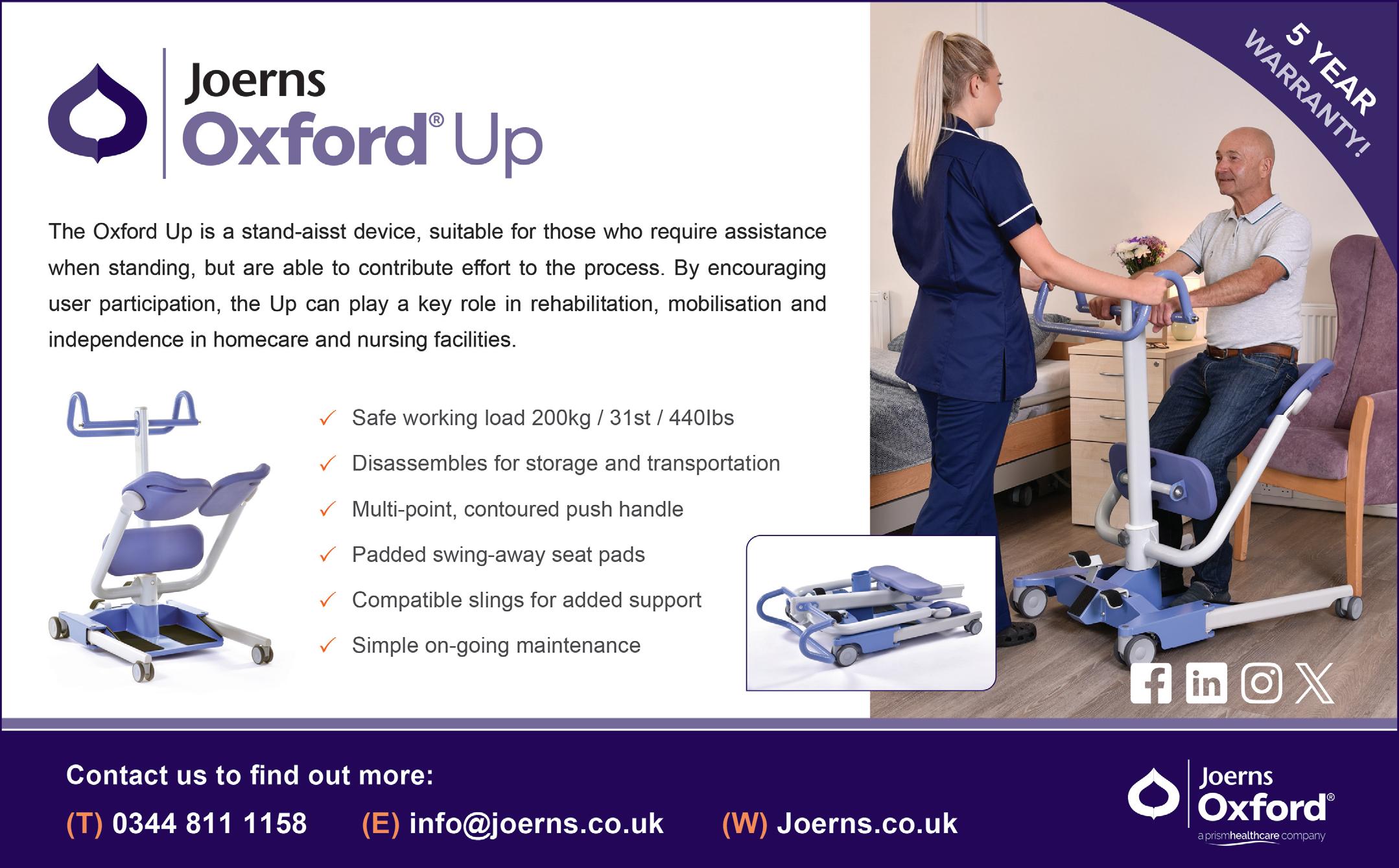
The British public are deeply unhappy with the National Health Service –just 1 in 5 people (21%) in 2024 said they were satisfied with the way the NHS runs. That’s according to analysis of the latest British Social Attitudes survey (BSA) published today by the Nuffield Trust and The King’s Fund. Satisfaction has plummeted by 39 percentage points since the months before the pandemic.
6 in 10 people (59%) said they were ‘very’ or ‘quite’ dissatisfied with the NHS in 2024, a sharp rise from 52% in 2023. This is the highest level of dissatisfaction with the health service since the survey began in 1983. The survey, carried out by the National Centre for Social Research (NatCen) in September and October 2024, is seen as a gold-standard measure of public attitudes in Britain.

The Nuffield Trust and The King’s Fund say that just 12% of people were satisfied with A&E waiting times and 23% with GP waiting times. People are unhappy about waiting times even if they are satisfied with the NHS overall, regardless of age, political affiliation or nation. NHS staffing and spending are also worrying the public. Only 11% agreed that “there are enough staff in the NHS these days”. While a strong majority (69%) said the government spends too little or far too little on the NHS, only 14% agreed that “The NHS spends the money it has efficiently”. If forced to choose, the public would narrowly opt for increasing taxes and raising NHS spending (46%) over keeping them the same (41%). Only 8% would prefer tax reductions and lower NHS spending. Despite low satisfaction with services, there remains strong majority support for the founding principles of the NHS: that it should “definitely or probably” be free at the point of use (90%), available to everyone (77%), and funded from general taxation (80%). However, the percentage of people saying that the NHS should “definitely” be available to everyone has decreased from 67% in 2023 to 56% in 2024.
Other findings from Public satisfaction with the NHS and social care in 2024 include:
• There is a divide between generations, with satisfaction lower and falling in younger age groups. While the proportion of people who were satisfied rose slightly between 2023 and 2024 for those aged 65+ from 25% to 27%, among those under 65 it fell significantly from 24% to 19%.
• A significantly higher proportion of people in Wales (72%) were dissatisfied with the NHS compared to 59% in England and 60% in Scotland (the difference between England and Scotland is not statistically significant).
• Public views of A&E services have worsened dramatically, with satisfaction falling from 31% to just 19%, and dissatisfaction rising from 37% to 52%. These are the worst figures on record by a large margin and make A&E the service with the lowest satisfaction levels for the first time.
• Satisfaction with GP services continued to fall, mirroring the trend over the last few years, with 31% of members of the British public satisfied with GP services, compared with 34% in 2023.
• Satisfaction with NHS dentistry has continued to collapse. As recently as 2019 this was at 60%, but it has now fallen to a record low of 20%. Dissatisfaction levels (55%) are the highest for any NHS service asked about.
• Inpatient and outpatient hospital care remains the part of the NHS with the highest levels of satisfaction, with 32% satisfied and only 28% dissatisfied.
• Satisfaction with social care remains worryingly low. In 2024, only 13% of respondents said they were ‘very’ or
‘quite’ satisfied with social care. 53% of respondents were ‘very’ or ‘quite’ dissatisfied.
For the first time, people who support the Reform party have been included as a separate category in the analysis instead of being part of the ‘other parties’ group, to reflect the party’s increased share of the election vote.
Supporters of the Reform party were less likely to be satisfied with the NHS (13%) than supporters of the other main parties. They are also less likely to believe in the founding principles of the NHS.
Report author Bea Taylor, Fellow at The Nuffield Trust said:
“Just five years after the British public were called on to “Protect the NHS” at the start of the pandemic, these findings reveal just how dismayed they are about the state of the NHS today. We found that every group in Britain is dissatisfied with access to vital services such as A&E and GP appointments.
“The government says the NHS is broken, and the public agree. But support for the core principles of the NHS – free at the point of use, available to all and funded by taxation – endures despite the collapse in satisfaction. Harnessing this support and fixing the foundations of the NHS must be central to the government’s forthcoming reform programme.”
Dan Wellings, Senior Fellow at The King’s Fund said:
“The latest results lay bare the extent of the problems faced by the NHS and the size of the challenge for the government. While the results are sobering, they should not be surprising. For too many people the NHS has become difficult to access: how can you be satisfied with a service you can’t get into?
“In 2010, seven out of ten people were satisfied with the NHS – it is now down to only one in five. The scale of the decline over the last few years has been dramatic. The results show that people do not want a different funding model, but they do want the NHS to start working for them again and they want it to have the staff and the money it needs to ensure that happens. The public are also clear that the NHS needs to get better at spending the money it does get more efficiently.
“The government’s focus on bringing down hospital waiting lists may address one area of the public’s concerns, but this year’s BSA shows that all areas are flashing red, particularly A&E. Voters are impatient for change, and Ministers will need to demonstrate rapid improvement, but that should not come at the cost of the bigger, whole-system reforms that are needed to create a truly sustainable health service. These results will form the baseline from which the new Labour government’s reform plans to ‘fix’ the NHS will be judged.”
In an accompanying foreword to the report, Nuffield Trust and King’s Fund Chief Executives Thea Stein and Sarah Woolnough say that “The government now finds itself walking a fine line between meeting public demands for rapid improvements on waiting times and avoiding the pitfall of throwing more money – of which there is virtually none – at a system in need of deeper reform.”
The Chief Executives argue that ministers will need to meet public demand for improving A&E, GP appointments and dental care, but they should not lose sight of the much bigger prize of longer-term, sustainable reform focused around shifting care from hospital and moving the NHS from a sickness to a health service.
Care provider Signature Senior Lifestyle has celebrated the official ‘topping out’ of its latest purpose-built development: Signature at Hornchurch, located in the London Borough of Havering.
Set to open in Spring 2026, the three-storey building will feature highquality private apartments, inviting communal spaces, and dedicated leisure facilities, including dining areas, a cinema, a hair salon, and therapy rooms. Signature at Hornchurch is primed to set a new benchmark for care, offering tailored residential, nursing, dementia and respite care in a sophisticated and supportive setting.
The ‘topping out’ ceremony marked a significant construction milestone, symbolising the completion of the building’s main structure. Signature Senior Lifestyle’s colleagues were joined by partners from the Elliott Group, the construction company delivering the project, along with representatives from the wider project team, including PRP Architects, Mecserve, Clark Smith Partnership, and Fed3 Projects Limited.

Steve Gardner, Acting CEO at Signature Senior Lifestyle, commented: “Signature Senior Lifestyle and Elliott Group share a commitment to excellence, and together we are creating what we believe will be the finest care home in the area. This partnership reflects our shared values of integrity, quality, and community focus. We look forward to welcoming both our new colleagues and residents in early 2026, providing exceptional care in an outstanding environment designed to offer comfort, independence, and peace of mind.”
Speaking at the ceremony, Noel Elliott, CEO of Elliott Group UK, reflected on the event: “As we celebrate this achievement, our focus now turns to the next critical phase of the project, ensuring that we maintain the highest standards of quality as we move towards completion. This care home will provide a much-needed, modern, and comfortable living environment for its residents, and we are proud to be working with Signature Senior Lifestyle to bring this vision to life.”
Access Health, Support and Care (HSC) is pleased to announce the appointment of Anisa Byrne as General Manager for Access Care. With extensive product and leadership experience, along with a deep-rooted connection to the care sector, Anisa is set to drive innovation and service excellence in care delivery.
Anisa’s connection to care is personal. Growing up in the West Midlands, she watched her grandparents run care homes with dedication. Her mother, while raising five children, worked tirelessly in the sector—taking last-minute shifts and balancing the emotional and physical demands of care work. These experiences shaped Anisa’s deep understanding of the challenges and sacrifices care professionals face every day.
Commenting on her new role, Anisa shared, "Care has always been an integral part of my family’s story. I’ve seen firsthand the dedication care professionals bring to their roles, and the challenges they face daily.
“It’s not just a job—it’s about being there for people when they need it most. That’s why I’m proud to take on the role of General Manager for Access Care."
Anisa is a strong advocate for the role of technology in improving the care sector. “We’re at a critical juncture in this industry. Technology isn’t the only solution, but it’s the most powerful tool we have to improve efficiencies, reduce carer burnout, and free up valuable time to focus on delivering care.

“With growing demand and funding limitations, making every resource count has never been more vital. Done right, technology can integrate seamlessly into the lives of those receiving care, granting greater independence and reassurance to them and their families.
“The future of care isn’t about replacing human compassion but enabling care professionals to do what they do best – providing the support and empathy that make all the difference.”
With over 20 years of global business experience, Anisa has led strategies across multiple sectors, driving growth through marketing communications, proposition management, regulatory compliance, and project delivery.
Steve Sawyer, Managing Director of Access Health, Support and Care, remarks, “I am delighted to be strengthening our leadership team with such a dynamic leader, who understands the care sector and is passionate about our mission to give care providers the freedom to deliver person-centred care services.
“Anisa’s appointment reinforces Access HSC’s commitment to innovation in care. Under her leadership, Access Care will continue to empower care teams with technology that enhances both care delivery and the lives of those receiving it.”

From 2019-2023, My Home Life England, which is part of the School of Health & Medical Sciences at City St George’s, University of London, led the pioneering social action project Care Home Friends and Neighbours: Intergenerational Linking.
The initiative linked together more than 4,000 young people aged 5–14 from schools and youth groups with over 2,000 older adults living in care homes across England. It was delivered in partnership with The Linking Network and a network of 11 local organisations.
With at least 230 schools and care homes taking part, it was the largest intergenerational project of its kind. It bridged generational divides, boosted wellbeing and brought friendship, purpose and joy to communities across England.

Eighteen months after the original funded project ended, follow-up research from My Home Life England reveals sustained engagement between schools and care homes, development and embedding of the Intergenerational Linking model, and the long-term value of intergenerational connections in social care and education settings.
WIDENED REACH
My Home Life England interviewed seven of the local organisations and all continue to deliver Intergenerational Linking, with about 50% of the original school-care home partnerships still active. This is despite the fact that, for the majority of organisations, Care Home FaNs: Intergenerational Linking was their first time delivering intergenerational work. Beyond maintaining the existing relationships, brand new partnerships between schools and care homes have emerged, extending the project’s impact to new audiences.
“There’s an appetite from care homes and there’s been appetite from schools… loads of schools wanted to get involved.”
ENHANCED IMPACT
The original project took place through the COVID-19 pandemic and so face-to-face connections were limited. With the easing of restrictions, interactions have shifted from virtual to face-to-face, fostering deeper and more meaningful relationships. Simple, person-led activities linked to seasonal events make an easy starting point. Sessions designed as a shared experience between younger and older people continue to be the most effective, as they invite conversation and working towards a common goal.
“You have a different conversation when you’re doing something together, or making something together. It’s that reciprocity and equality which is really important. There’s a bond and connection and joy that comes from working together. A connection between the younger and older person – a shared interest.”
SUPPORTING
Intergenerational activities have been cited as evidence of quality and good practice in Care Quality Commission reports, Ofsted inspections and Religious Education frameworks, further recognising their impact and embedding them into the lives of schools and care homes. Many of the local organisations have successfully gained additional funding for intergenerational work and have also incorporated intergenerational practice into their organisations’ visions, emphasising its strategic importance.
“The tangible benefits to older people are enormous and very obvious. Linking with younger people provides that connection, that kind of anti-loneliness, that’s so important. As an organisation that is dedicated to supporting older people’s mental and physical wellbeing, it clearly is a no brainer that we should be investing in that.”
POWERFUL MUTUAL BENEFITS
The follow-up research reaffirms the profound impact of intergenerational connections seen in the original project. Schools and care homes continue to engage due to the widespread mutual benefits for both
younger and older people, as well as the community engagement benefits and strengthened reputations for the institutions themselves.
These benefits include:
For older people: Social interaction, enhanced quality of life and wellbeing, opportunities for knowledge exchange, joy and renewed sense of purpose.
For younger people: Skill-share opportunities, active citizenship, friendship, excitement and exposure to different life experiences.
“One chap had joined the care home recently and hadn’t smiled. He didn’t want to be there, didn’t like it… Then, after visiting the children, he was smiling and chatting and talking.”
Each of the 11 local organisations originally appointed a project lead, known as a ‘broker’, who facilitated the school-care home links. A significant learning from the project’s 2023 evaluation was that this intermediary broker role played an essential role in keeping the relationships afloat.
While some links have developed to be self-sustaining, the broker role continues to be fundamental to the successful delivery and sustainability of Intergenerational Linking. Brokers are still providing pro-active support, valuable guidance and maintaining momentum when schools and care homes face unexpected challenges, such as staffing changes, a lack of funding and limited capacity in over-stretched workplaces. In these circumstances, the brokers are the driving forces behind a link, ensuring that younger and older people can continue to meet.
“We step back a bit because want the links to take ownership, but at least we can still advise them on what to do, and if they struggle then we would help them. I think the brokerage role is still absolutely crucial, definitely.”
The follow-up study reveals that the broker role has evolved to represent a trainer in intergenerational best practice – modelling the conditions for the most effective, impactful linking. This model would benefit from more support, to equip teachers and care home staff with the knowledge, skills and confidence to drive forward meaningful Intergenerational Linking. Also important is brokers working alongside fellow organisations for whom intergenerational practice is a key priority. Continued investment and recognition in policy frameworks can help to further expand the reach and impact of intergenerational initiatives.
IN SUMMARY
The original investment into intergenerational practice between schools and care homes has led to sustained impact. This is evident in the continued relationships, the new connections and opportunities, the development of the model as it grows, the recognition in inspection frameworks, and the embedded intergenerational practices across schools, care homes and local organisations. Intergenerational Linking continues to deliver wide-ranging benefits to younger and older people, to schools and care homes, to local organisations and wider communities, enriching lives, fostering understanding, and facilitating a stronger, more integrated society.
To see the full research, please visit: Sustained connections: The lasting impact of Intergenerational Linking between schools and care homes - My Home Life England
Care Home FaNs: Intergenerational Linking was originally funded through the #iwill Fund. The #iwill Fund is made possible thanks to £66 million joint investment from The National Lottery Community Fund and the Department of Digital, Culture, Media & Sport (DCMS). The Dunhill Medical Trust acted as a match funder for the project.
Meadowbrook care home in Bishop’s Stortford has celebrated a significant milestone in the recovery of 94-year-old Douglas ‘Doug’ Cambourne; a former airplane engineer who sadly suffered a stroke in 2024. A lifelong enthusiast for aviation and military history, Doug was taken on an inspirational tour of the Imperial War Museum in Duxford; home to much of the historic aircraft he had once worked on.
The stroke left Doug with severe mobility issues; requiring a motorised wheelchair and two carers to get around. It also dampened his confidence and sense of independence – a tough reality for a man who spent decades repairing aircraft for the British aviation fleet. Throughout his recovery, Doug’s greatest wish was to walk again through his favourite museum.
Realizing the importance of this goal, staff at Meadowbrook rallied to help make his dream a reality. They designed a personalised rehabilitation programme to help Doug regain his strength and mobility. During his visit, Doug was able to stand from his wheelchair and walk short distances with assistance; an achievement that months earlier seemed impossible.
Reflecting on his journey, Doug described the experience as “life-changing”:
“I never thought I’d be able to walk again, but the encouragement and patience from the team gave me the confidence to keep going. The trip to Duxford was incredible, I felt like myself again.”
Molly Harvey, Personal Trainer at Meadowbrook, praised Doug’s determination and resilience, saying:
“From the first session, he pushed himself beyond his comfort zone, and each
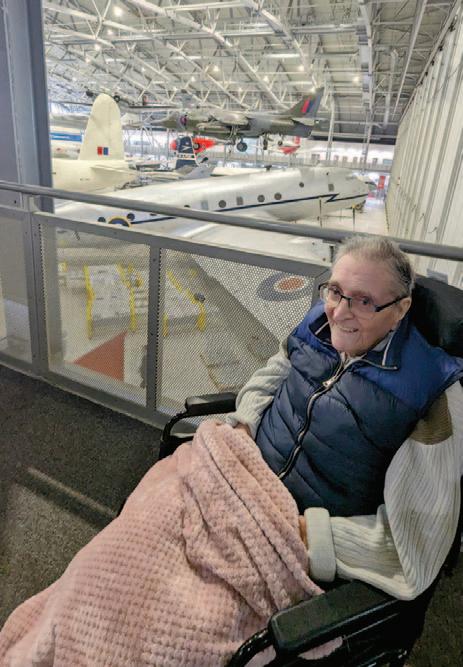
week, we saw his confidence grow. It wasn’t just about the physical improvements; it was about giving him back his independence and joy. Seeing him walk again and enjoy a day out doing something he loves is what person-centred care is all about.”
The specialist exercise programme was carefully tailored around his unique goals and capabilities. It involved a mix of lower-body strength training, core stability work, and assisted walking sessions. Progress was also closely monitored so the routine could be continuously adapted to ensure safety whilst steadily improving endurance.
By combining a structured recovery programme with meaningful personal ‘milestones’ along the path, the team hoped to restore both Doug’s physical capabilities, and his self-belief. This person-centred approach to rehab and recovery is an integral part of every home in the Connaught Care Collection; including Meadowbrook.
Says Stephen Orwin, Life Enhancement and Wellbeing Coordinator across the group: “Doug’s journey from recovery to walking again serves as a reminder that with the right support, motivation, and care, anything is possible. At Connaught Care, we want to prove that age and physical setbacks don’t have to define a person’s future. It’s truly been a privilege working with Doug, and whilst there is still a long way to go to full recovery, we’re all massively proud of the progress he’s made so far”.Doug’s career as an engineer spanned several years, during which he contributed to aircraft maintenance and mechanical engineering for the British aviation fleet. His work involved ensuring aircraft were in top operational condition, playing a crucial role in keeping military planes and helicopters in the skies. He has been living at Meadowbrook care home since the home opened in December 2024.
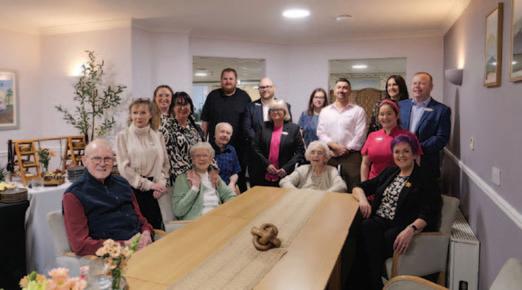
A new inspection ratings system for care services will come into effect across Wales on 1 April, with the aim of improving transparency and supporting people in making informed decisions about care.
Hallmark Tŷ Porth Luxury Care Home welcomed Minister for Children and Social Care, Dawn Bowden, for the official launch. The event was attended by Minister Dawn Bowden, residents, team members, members of the national press, and representatives from Hallmark’s regional team
All care homes and domiciliary support services across Wales will be given ratings and most required to display them at their premises and online, following an inspection.
The ratings will reflect the quality of care across four key themes: Well-being;Care and Support; Leadership and Management; Environment.
Each theme will be judged as being excellent, good, requires improvement or requires significant improvement.
The Welsh Government consulted on inspection ratings for care home services and domiciliary support services last year.
The new system has been developed in close collaboration with care providers and commissioners across Wales and will help drive high quality stan-

dards across care services.
Care Inspectorate Wales (CIW) will support services through the implementation of the new system. Ratings will be clearly shown in inspection reports, on CIW’s website and on posters for the service provider to display.
Over the coming months, more and more services will be displaying their ratings, however it will take up to two years for all relevant services to be inspected and given their ratings.
The new system represents an important step change in supporting continuous improvement.
Minister for Children and Social Care, Dawn Bowden said:
“Care services throughout Wales have a crucial role in looking after people. For many of them, a care service can also be their home, where they live and thrive, and we want to keep ensuring they receive the best possible care.”
“These ratings will enable people to make important decisions in choosing what’s right for them and support their well-being.”
“They will also enable service providers to pinpoint their strengths as well as areas for growth and development.”
“I want to thank the sector for their work in helping us develop the system.”
Chief Inspector at Care Inspectorate Wales, Gillian Baranski said:
“This new ratings system will help people make informed choices about care services while supporting providers to continuously enhance the quality of care they deliver.”
“Most care in Wales is good care. Ratings will highlight what is working well and support improvement where needed across Wales.”

• We specialise in the sale and purchase of quality used wheelchair accessible vehicles and ambulances.
• They can be bought as seen or refurbished and sign-written to your own requirements.
• Fully serviced, new mot & warranty
• Engineers inspection supplied if required.
• Free delivery service available
• All buses comply with new legislation
• Lease hire and purchase available
• Always large stock of accessible vehicles Tel:


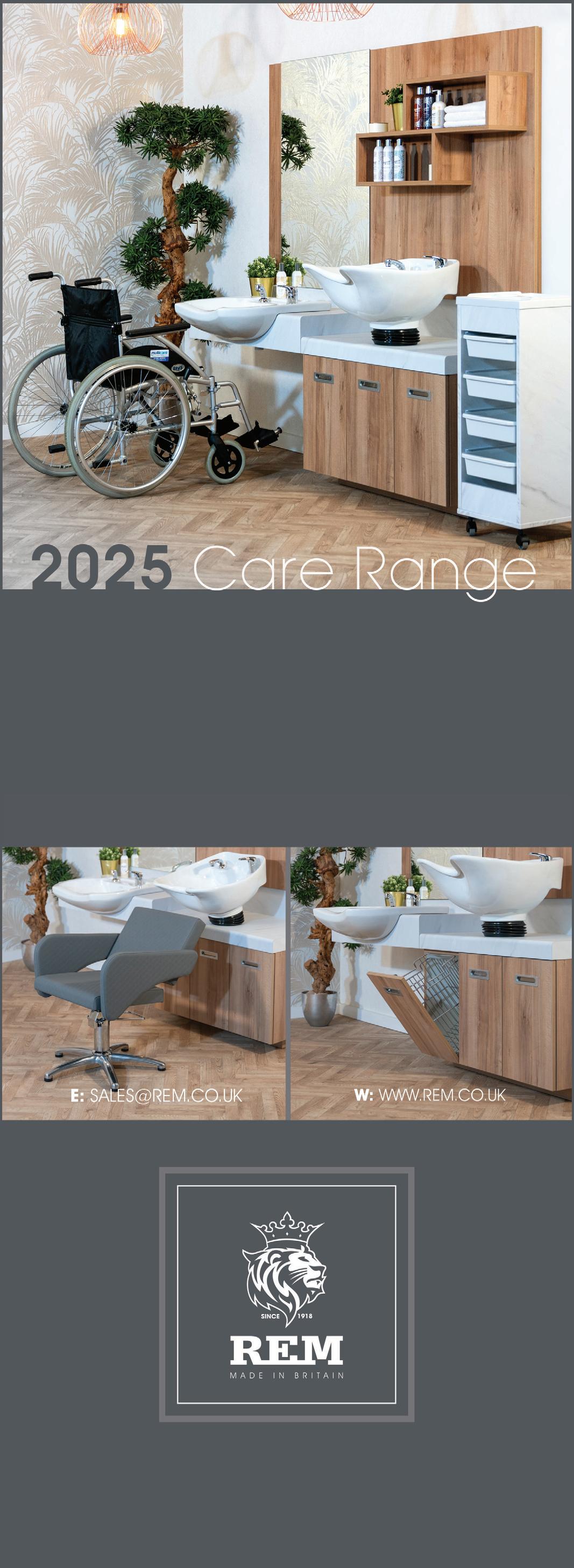
REM have been manufacturing furniture for the Hair & Beauty Sector for over 100 years and are now considered to be one of the largest manufacturers in both the UK & Europe. Understanding the growing requirement for Care & Residential Home Salons, REM’s Design Team have produced the Pendle Care Range for the Small, Compact Care Home Salon.
A charity which has provided care for vulnerable people in Wales for 40 years has closed because of a social care funding crisis.
Cymryd Rhan (Taking Part) had been using its reserves to prop up its service – but those reserves have now run dry and the charity ceased operating yesterday (Monday, March 31).
The charity supported vulnerable people to stay in their own homes, easing pressure on the beleaguered NHS.
The Llanidloes-based charity provided support for about 2,000 people in various parts of Wales including Flintshire, Wrexham, Ceredigion, Merthyr and Powys.
But over recent years the organisation says it’s been forced to hand back its care contracts to councils because it wasn’t being paid enough to provide the standard of support required.
And now the charity is closing because of the funding headache –with bosses saying: “enough is enough”.
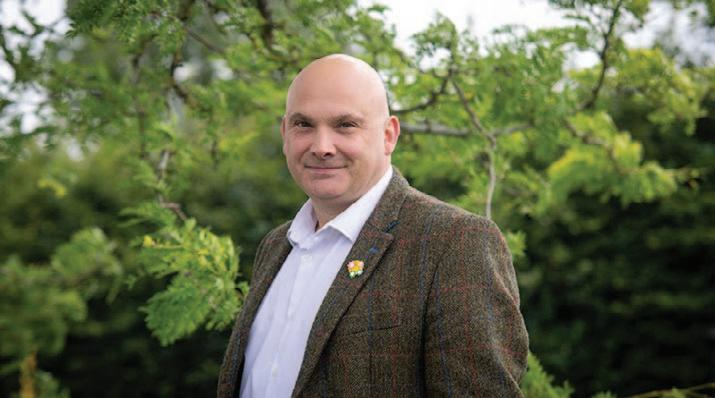
Chief executive Nick Evans said jobs would be lost and the care of hundreds of vulnerable people the charity had on its books would be transferred to alternative groups.
He said: “We’ve been in Wales for 40 years and the charity was originally set up by a group of parents whose sons and daughters had finished their special education and were struggling to find opportunities beyond their education.
“In the last year we had about 300 individuals that we have supported.
“We have massively reduced, but we were running at around a couple of thousand people at the height of our work.
“Our decision to stop is because we can no longer live with the fact that people’s choices and the controls they have around their lives are being interfered with because of the attitude by which funders and commissioners are going about their daily business.
“We are being placed in a position to live with underfunding but also to meet the same expected requirements under the regulations of quality and monitoring.
“So Cymryd Rhan has decided enough is enough because we can no longer guarantee our ability to do the right thing for people.
“So, the decision and the recommendation I made to our board of trustees is that we should stop, it’s as simple as that.”
Mr Evans, who has led the organisation for 10 years, said the charity had been working to find alternative groups which can support the 300 people it had on its books.
He said: “We have found alternative options for a lot of those people and we have been strengthening our volunteers as well.
“Others are trying to find alternatives as well, so there’s a bit of a mixed bag there.”
He said jobs would be lost as the charity folds.
Mr Evans said: “In the last two years we had about 146 staff, but we had a wave of handing back those contracts and a lot of the staff transferred to the new providers.
“Right now, we’re down to about 25 staff. Out of that, 20 are transferring to another provider and there will be five posts made redundant.”
Mr Evans said the funding problems came to the fore a few years ago when the charity had to hand its contracts back to Wrexham Council or risk going bust.
The charity said at that time the fees paid by the council were so low that it faced an annual loss of more than £100,000 if the contracts carried on.
Mr Evans said: “We have been for about a year working closely with a number of commissioners, but in
reality this started for us back in 2023 over the fiasco with the Wrexham contract.
“We then decided that we were going to continue to trade and adjust things where we would chase more grants.
“So we tried again to adjust our business model based on what people were needing in their communities – but it is just too unpredictable.
“We started handing back and giving notice on contracts towards the end of last year with an explanation as to why we were doing that.
“We have basically been transferring everything back and as from Monday we stop trading.”
He said the closure of the charity is another worrying development in the Welsh social care sector.
Members of the Care Forum Wales campaign group have been warning the impact of National Insurance and wage increases as well as how much councils were prepared to pay for care will affect the sustainability of many organisations and care homes within the sector.
Mr Evans said the social care sector was facing huge financial challenges.
He said: “This decision that we have taken isn’t just because we have spat our dummies out and thrown our toys out the pram because we want more money.
“It’s far deeper than that. We’ve spent the last few years really engaging with the local authorities in bringing about the changes that people keep talking about of needing a reform in social care.
“So we have changed our own organisation and delivery methods to meet those challenges and share that learning with the local authorities, but they themselves continue to behave in the same way. “
The charity’s chair of trustees Freda Lacey said the way contracts were structured made it difficult for the organisation to know what it would be paid for delivering its service in the long term – meaning there was constant financial uncertainty.
She said: “In terms of business modelling we’ve always chased the long-term contracts with the councils, we’ve always looked at their seven-year contracts with a three-year extension so we have a business model with stability.
“The problem with the annual uplift fee is those contracts are year-on-year, you can’t control, influence or know what those uplifts will look like into the next year.
“Every year when you come into January you start asking the question about the uplifts.
“You can see there’s an increase in staff salaries coming in terms of Real Living Wage increases, operational delivery costs are increasing as well, but you are at the hands of the local authority to decide what they are prepared to give you.”
Mario Kreft MBE, the chair of Care Forum Wales, said: “The news that Cymryd Rhan is being forced to call it a day is tragic but sadly all too predictable given the chronic underfunding of the social care sector.
“It defies logic that a local authority expects a charity, or indeed any care provider, to operate at a loss.
“There are severe legal and financial implications for any trustees who accepted such operating conditions and we completely understand why Cymryd Rhan felt they had no choice but to bow out of their contracts. It is completely unsustainable to have to subsidise social care services commissioned by a council.
“Regrettably, Cymryd Rhan’s situation is not an isolated case. We have long warned of an unjust postcode lottery of fees with local authorities and health boards, with an ever widening North-South divide which has seen local authorities in North Wales paying irresponsibly low fees.”
“In the meantime, care homes, nursing homes and care providers across Wales are closing or withdrawing from contracts because they simply cannot afford to continue at the current levels of funding.”
In the run-up to their Spring concert, the staff and residents at Sanctuary Care’s care home in Coventry, are delighted to celebrate their much-loved choir, the Lammas Ladies.
Formed in 2022 by activities coordinator Toni Carrigan, the choir has become an integral part of life at Lammas House Residential Care Home, bringing residents together through the power of music.
Toni was inspired to start the choir to support a very shy resident, who was an opera singer in her younger days, to connect with her fellow residents.
With gentle encouragement, she agreed to sing, and when several other residents joined in, the Lammas Ladies Choir was born. Since then, the choir has flourished, giving residents such a sense of belonging and achievement.
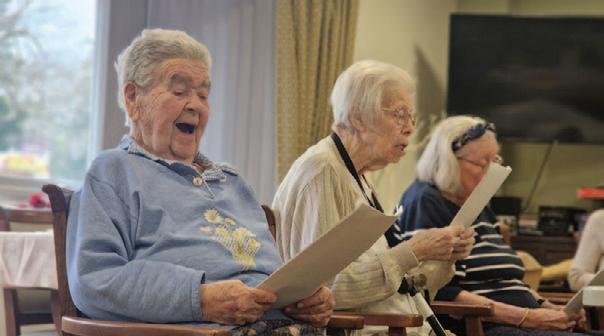
Toni explains: “It’s so wonderful to hear them sing, we practice every week, come rain or shine. We per-
form concerts for loved ones, with the residents always choosing which songs we sing.
“Singing is so good for you. Our choir is a very special part of Lammas House, and it’s amazing to see the joy it brings to everyone involved.”
At the moment it is only the ladies of Lammas who are enthusiastic about the choir, but they are always open to the men joining in, although for now, they are happy to be a very willing audience.
Jayne Walker, a proud member of the choir who has been living at Lammas House for over a year, shares her experience:
“I really enjoy singing – it’s my thing! I’m just happy when I’m singing because it feels so natural.”
The choir not only provides an opportunity for residents to express themselves musically, it serves as a powerful tool for reminiscence. Many members don’t even need song sheets, because they have grown up with this music.
of their dedicated
but
and currently works as a healthcare assistant at Southgate Beaumont Care Home Barchester Healthcare. Regina started painting in lockdown and her work is inspired by the beauty in nature and the story it has to tell. Her stunning work was enjoyed by all residents, staff and members of the community. Some residents with less mobility requested their own private exhibition with the artist in their rooms.
Helen said “I
and
to see this beautiful exhibition. We had wine and delicious refreshments it was a great success!” Zoe Grindley, Activities Coordinator at Southgate Beaumont said: “Art is very popu-

lar with everyone who lives at Southgate Beaumont. It’s part of our every day. We have the most amazing Mural in our reception, which is over 300 years old and we host a number of art related activities including a monthly art lecture with the fantastic Dr Mark Banting. The art exhibition is a very special event for us and we are honoured to be able to display the beautiful artwork created by Regina and share with residents and the local community. Hosting events like these brings the outside world in and really transports residents into another world.”
Regina said "These breath-taking landscapes were imprinted in my memories and inspired me to create my paintings today. I discovered that painting is the right tool for me to express all my colourful memories from my childhood and to share them with you. I hope that my paintings will remind people of the beautiful gift of life that could harmonize us with wonderful nature."
For more information on the Monthly Art Lecture and other events contact Southgate Beaumont on 0208 882 9222.
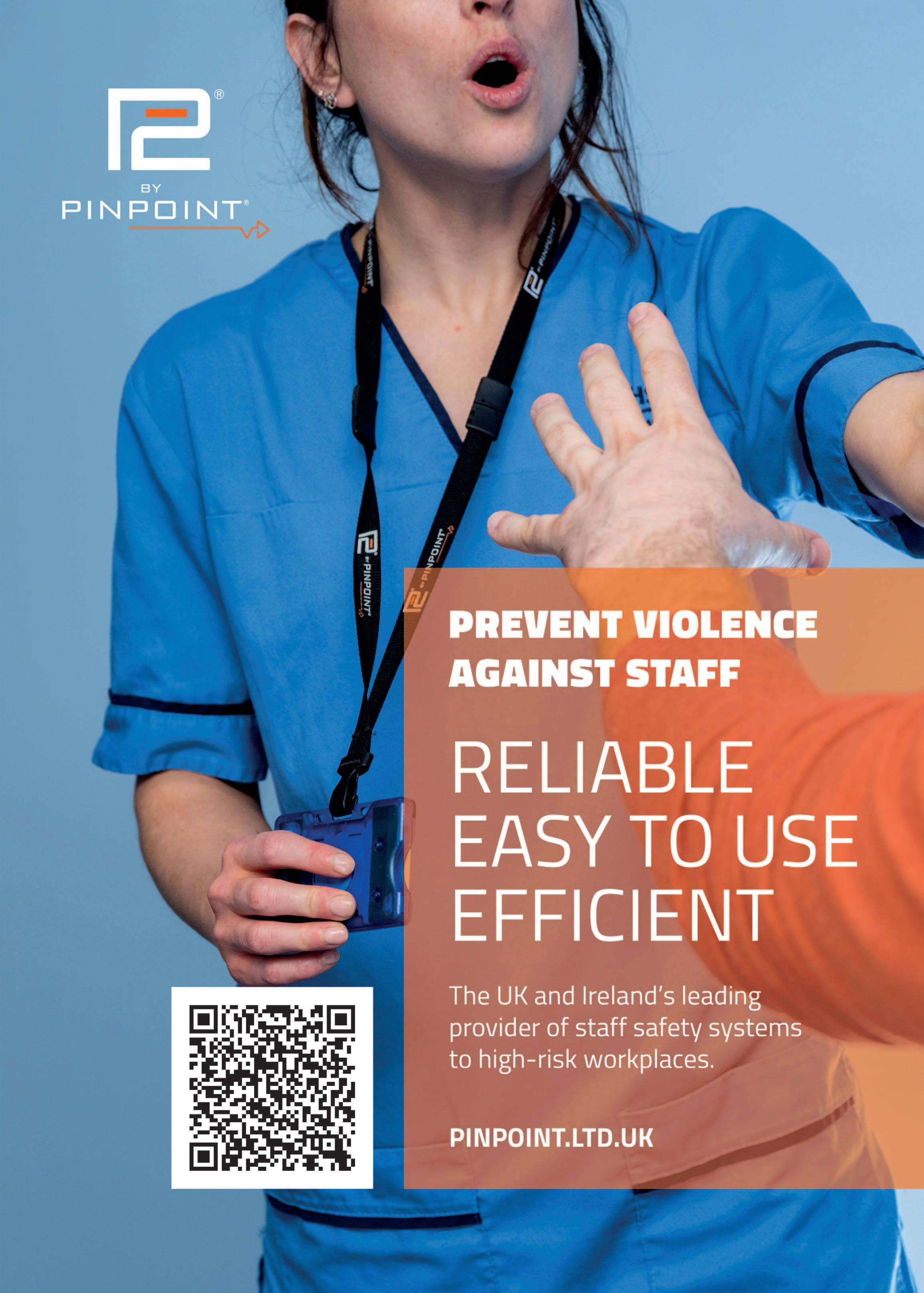

The private or independent healthcare sector is largely made up of hospitals and clinics which are run independently of the National Health Service [NHS]. They are normally run by a commercial company, although some of these are also run by charities or other non-profit organisations.
Private Healthcare sites may also include mental health facilities, rehabilitation centres, care homes and many other types of site specific facilities.
Despite Covid-19 being the overwhelming healthcare concern in the UK and Worldwide since early 2020, Legionnaires' Disease prevention must remain a key concern to Private Healthcare providers.
A significant recent example of a Legionnaires' Disease incident involved BUPA and the associated consequences of local Legionella risk management failings - https://www.bbc.co.uk/news/uk-england-essex-44483283
LEGIONELLA REGULATION AND GUIDANCE
In common with all non-healthcare businesses, private healthcare operators have a duty of care to protect residents, staff, visitors and anybody else who may be affected by their undertaking from foreseeable risks to their health, safety and wellbeing.
All Health estates are assessed against a set of legal requirements and governance standards – the associated principles of health and safety are enshrined within the Health and Social Care Act 2008 [Regulated Activities], Regulations 2014 and specifically Regulation 12[2][h] and Regulation 15 of the Act. Failure to comply with the aforementioned ‘Regulation’ or ‘Act’ is an offence and as such the CQC have ‘enforcement powers’ to ensure compliance to accepted standards. Such enforcement powers include: issuing time-defined warning notices, prosecution and cancelling a provider’s registration – removing its ability to provide regulated activities.
Despite Legionella risks being ever present for providers, extensive guidance is available. Health Technical Memorandum [04-01] sets out the standards for water safety within health estates by acknowledging within its three parts [A, B and C] the regulatory requirements of the Health and Social Care Act as well as the role of the Health and Safety Executive [HSE] for the safe management of healthcare estates.
There are many commercially run private healthcare sites and the skills and competencies of staff within these varying sites may well be adequately specialised and relevant to ensure good water hygiene management practices are implemented, alternatively, staff may also have a more general managerial skill set and be unlikely to possess a specialist knowledge in water systems safety. So, can we simply identify the measures within a checklist to provide assurance both individually at site level and at a more strategic level? Regardless of the level of care or the standards to be applied, the key to managing Legionella risk is the implementation of the following five steps, as advocated under the HSE’s Approved Code of Practice [ACoP] L8:
1. Appoint a manager to be responsible for others;
2. Identify and assess sources of risk [i.e. carry out Legionella risk assessments];
3. Prepare a scheme to prevent or control risk [i.e. a water safety plan];
4. Implement, manage and monitor the scheme of precautions;
5. Keep records of the precautions.
In their most skeletal form, the aforementioned five steps are no less fundamental to an individual property or organisation’s safe operation today than when initially documented in earlier editions of ACoP L8. The document elaborates on these points whilst also detailing specifically the nature and make up of a ‘Written Scheme’ or in healthcare parlance, the ‘Water Safety Plan’: For preventing or controlling the risk from exposure;
Written by Peter Gunn, Senior Consultant, Water Hygiene Centre (www.waterhygienecentre.com)
Ensuring proper implementation and management;
• Specifying measures undertaken to ensure that it remains effective.
BS8680:2020 WATER QUALITY – WATER SAFETY PLANS – CODE OF PRACTICE
More recently BS8680:2020 Water Quality – Water Safety Plans – Code of Practice has been issued to provide unequivocal recommendations and guidance on the development of a Water Safety Plan [WSP]. The standard is intended to be used as a code of practice to demonstrate current good practice and compliance and private healthcare providers should now be looking to integrate the document’s evolutionary approach into their own water compliance system.
HOW TO REDUCE THE RISK OF LEGIONELLA?
Private Healthcare providers may also follow a basic checklist for reducing the risk from Legionella [and other waterborne pathogens] in association with the aforementioned HSE and DoH guidance:
1. Have specifically appointed person[s] responsible for Legionella [water safety] control;
2. Ensure the current Water hygiene risk assessment is available at local level, understood by the appropriate manager[s] and with a management plan in place to act on any findings;
3. Ensure a logbook system is in place detailing the site’s communication pathway, planned preventative maintenance tasks undertaken and frequencies, including records, contingency measures and any other relevant information. Note: the logbook system should be appropriate to the site it concerns;
4. Ensure all identified relevant person[s] have sufficient legionella training and experience to be able to carry out the role competently and other relevant staff are trained to be aware of the importance of their role in controlling Legionella;
5. Keep hot water hot and circulating at all times: 55°C - 60°C throughout the entire hot water system;
6. Keep cold water cold at all times. It should be maintained at temperatures below 20°C throughout the system to all outlets [this may not be possible when the ambient temperature is high, but every effort should be made to ensure that cold water entering the premises and in storage remains as cold as possible];
7. Run all outlets including showers in all areas [healthcare or otherwise] for several minutes to draw through water [until it reaches the temperatures stated in points 5 and 6)] at least twice a week [or daily if augmented care area] if rooms are unoccupied, and always prior to occupation;
8. Keep shower heads/hoses, taps and other facilities dispensing water clean and free from scale;
9. Clean, drain and disinfect hot water generators on an annual basis;
10. Clean and disinfect all water filters regularly, as directed by the manufacturer, at least every three months;
11. Inspect water storage tanks and visible pipe work routinely. Ensure that all coverings are intact and firmly in place, and disinfect with 50mg/l chlorine and clean based on condition;
12. Ensure any TMV’s installed are suitably inspected and maintained on a 6 monthly basis;
13. Identify any ‘other’ system via the current water risk assessment and ensure relevant PPM tasks are implemented;
14. Ensure that when carrying out system modifications or new installations they do not create pipework with intermittent or no water flow, and disinfect the system following any work;
15. Keep records of all water systems reading such as temperature, pH and chlorine concentrations and ensure they are checked regularly by the appropriate manager;
16. Consider and undertake microbiological sampling to aid demonstration of monitoring compliance and safe water systems.
*The aforementioned checklist is not exhaustive and is more appropriate for smaller sites. Healthcare sites of significant size would require a significantly more detailed approach.
In summary, we may ask ourselves if we have learnt our lesson since the mid-1970’s when Legionnaires' Disease first came into public consciousness. Simply put, despite the wealth of straightforward health and safety advice both from regulators such as the Health and Safety Executive, learned societies and other Healthcare industry bodies, this largely avoidable disease continues to be a concern for Estates and Facilities Managers and occupiers alike.
A resident at an Altrincham home says the secret to a long life is to “live a quiet and simple life”
Denis Hilton lives at MHA Handsworth and celebrated his 104th birthday with close family and friends.
He has been living at MHA Handsworth for over three years and the home decked out the conservatory with birthday balloons and banners. The home has also arranged for a singer to come in, who sang various songs from the 60’s as well as happy birthday.
Prior to moving into the home, Denis lived in Bury with his late wife and worked as an upholsterer.
MHA Handsworth provides residential care for 43 residents. Charlotte Fowke, activity coordinator said: “Denis is a very relaxed and laid-back
character and didn't want a huge fuss for his birthday.
“Denis was aware of the fact it was his birthday and was happy to see his family and friends.
“He is very close to his two nieces Andrea and Karen, who both came in on his birthday to see him.
“Denis spends a lot of time in the conservatory, so we decided to dedicate that space to his birthday.
“He received quite a few cards from friends and family and really enjoyed his day.
“I asked him what his secret to a long life is, and in typical Denis style he replied, you have to live a quiet and simple life.”

The highly anticipated Care Show London 2025 is set to return to Excel London on 30 April – 1 May 2025! This premier event is more than just an exhibition; it’s a vibrant community gathering dedicated to celebrating, inspiring, and advancing the care sector.
Free to attend for those who work for a social care provider (including but not exclusive to care homes, nursing homes and domiciliary care), in addition to healthcare, allied healthcare, NHS, public sector professionals, chefs, catering professionals, architects and interior designers, Care Show London 2025 will bring together over 3,500 care professionals from across the UK. The event promises to be a celebration of shared dedication, filled with opportunities to network, learn, and enjoy the company of like-minded individuals who share your passion for delivering exceptional care.
Over the course of two days, attendees will have the chance to immerse themselves in a CPD-accredited conference programme, hosted across 6

dedicated theatres. This comprehensive line-up will offer a 360-degree view of today’s social care landscape through a variety of formats. The programme covers key themes including quality, compliance and collaboration, workforce development and wellbeing, funding, business management and sustainability, catering and nutrition, and technology and innovation Explore the expansive show floor, showcasing over 200 key suppliers ranging from leading names to pioneering start-ups making waves in the sector. Attendees will have access to a wide array of innovative products and services, including digital solutions, care equipment, waste management services, recruitment platforms, training programs, financial services, textiles, and more. It’s the perfect opportunity to discover fresh ideas and tools that will enhance your care services and streamline operations.
advert on page 12.
Following the overwhelming success of last year’s inaugural event, Adept Care Homes is proud to announce the return of ‘The Big Dementia Talk’, a virtual event open to all at the start of Dementia Action Week 2025.
This insightful event, hosted by Karen Middleton, Adept’s Dementia Manager, aims to provide valuable information on dementia care, helping families, caregivers, and communities better understand and support those living with dementia. Attendees will also have the opportunity to participate in a live Q&A session, ensuring their most pressing questions are answered by experts in the field.
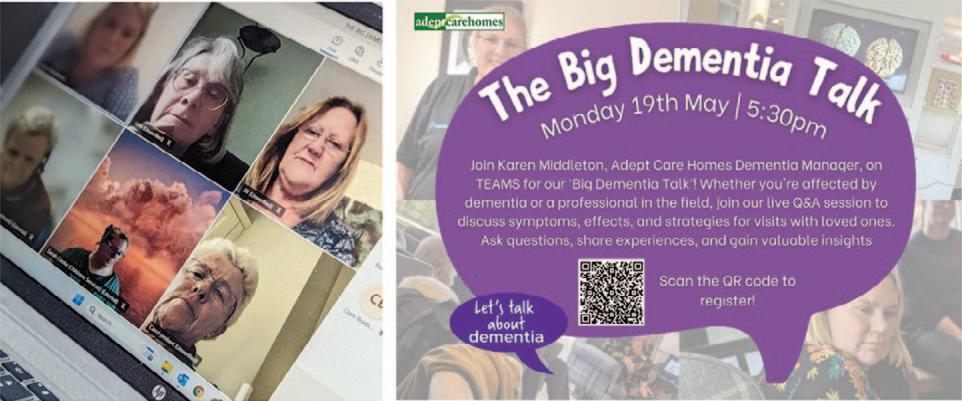
cation to delivering outstanding dementia care and improving the lives of residents and their families.

WHY IS DEMENTIA CARE SO IMPORTANT?
With dementia affecting millions worldwide, initiatives like The National Dementia Strategy focus on developing services that meet the needs of all individuals, regardless of age, ethnicity, or social status. Adept Care Homes is dedicated to delivering personalised, compassionate dementia care, ensuring every resident receives the tailored support they deserve.
Adept Care Homes is a leading provider of specialist dementia care, known for its highly trained and compassionate teams. By focusing on the individual needs of each resident, Adept Care Homes creates nurturing environments where people living with dementia can thrive. Their commitment to excellence has been recognised nationally, as they are proud finalists in the National Care Home Awards 2025 for Best in Specialist Care: Dementia Care. This recognition underscores its ongoing dedi-
Throughout Dementia Action Week, Adept Care Homes will be hosting a variety of engaging and meaningful activities across our homes to support residents, families, and the wider community. From Time for Tea dementia cafés, where people can connect over a warm cup and conversation, to Singing for the Brain sessions, designed to spark joy and reminiscence through music, there will be plenty of opportunities to get involved. Residents will also enjoy the calming presence of pet therapy visits, along with a range of other enriching activities aimed at enhancing well-being and raising awareness of dementia care.
JOIN THE CONVERSATION
The Big Dementia Talk is free to attend and open to anyone interested in learning more about dementia care. Whether you are a family member, caregiver, or healthcare professional, this event offers an invaluable opportunity to gain knowledge, share experiences, and connect with others.





The government should mandate the rebalancing of NHS funding towards primary and community services and overhaul existing hospital-focused performance targets in order to deliver its reform plans for a sustainable NHS, according to a new report from The King’s Fund.
The health and care charity is calling on the government to rebalance NHS spending towards primary and community care to make sure those services are able to provide the care and treatment the public need to stay healthy. This could be achieved through returning hospital spending to below 50% of the NHS budget over the medium term. The report authors also call on ministers to review the current, hospital-focused targets regime that they find hinders progress towards a more sustainable NHS that reduces people’s need for hospital treatment in the first place.
The King’s Fund has argued that the 76-year-old NHS is stuck in 1948 with a model of care based on patients getting sick, being patched up and sent home.
Latest figures show that 1 in 4 people in England live with one or more long-term conditions, many of which will never be cured but will require constant management and support. To meet this shift in patient need, the NHS needs to focus far more on services in the community, such as GPs, district nurses, pharmacies and occupational therapists, that support people to stay well and independent, not just those that treat them when they are acutely unwell.
The Labour government has committed to shifting the focus of the NHS towards primary and community services as one of its three ‘big shifts’ which will be delivered through the NHS 10 Year Health Plan, due to be published this spring.
This new report builds on previous research by The King’s Fund which found that over the past 30 years successive governments have failed to deliver this ambition of moving more ‘care closer to home’. Researchers at the charity studied past failed attempts to shift focus to primary and community services, analysed national and international research into what others have done to shift how health services are delivered, and interviewed national policy-makers and frontline healthcare leaders. The authors set out what this government needs to do differently to succeed this time, outlining the key policy ‘levers’ available to the Secretary of State for Health and Social Care if he is to deliver this change.
The authors highlight NHS funding flows that prioritise hospitals, and urgent challenges such as A&E waiting times and planned care backlogs becoming the priority for politicians and crowding out more fundamental improvement. This focus of money and attention on hospitals contributes to a vicious cycle of patients struggling to get appointments with their GP, risking their condition deteriorating and having to seek urgent help from already over-stretched acute hospitals.
The proportion of NHS spending allocated to acute hospital services has risen over the past decade, from 49% in 2010 to 58% in 2021. Over the same period the proportion spent on primary care has declined, decreasing from 28% to 18%. The King’s Fund is recommending the government rebalance the proportion of NHS spending on primary and community care to drive the shift towards delivering more care in the community, such as steadily reducing hospital spending to below 50% of the NHS budget.
The report authors also urge ministers to urgently review existing hospital waiting-time targets, arguing that the government’s dominant focus on reducing waits for elective care will distract from the much bigger prize of shifting to a more community-focused system.
The authors conclude that ‘what’s measured is what matters’ in government policy: current national targets overwhelmingly focus on hospital and emergency care, leaving little incentive for health care leaders to prioritise community-based services. As part of delivering this shift, ministers should address the current lack of meaningful national metrics for primary and community services, establishing a new, robust national data set to create accountability for delivering more care in the community.
Additionally, the authors warn that the government’s recent decision to cut integrated care board (ICB) operating costs by a further 50% this year risks perpetuating the dominance of hospitals in how health and care services are planned and delivered and will make the shift from hospital to community even harder to deliver. Ministers must ensure that local health and care leaders still have sufficient resources to drive the necessary changes.
Beccy Baird, Senior Fellow at The King’s Fund and co-author of the report, said: ‘The structure and focus of the NHS has failed to keep pace with changes in disease and ill-health. Hospitals in England are wellplaced to support the most acutely unwell, but too often they are treating patients that could have had their condition better managed in the community. An increasing number of us are living with long term health conditions that require regular, ongoing support. Boosting out-of-hospital services can help avoid the need for hospital treatment, meaning better care for patients and better value for tax-payers.
‘For ministers to succeed where their predecessors have failed, they will need to take bold action. History tells us that warm words and soft ambitions won’t cut it – delivering this change will require hard targets, including the mandated rebalancing of funding towards primary and community services. Rebalancing NHS funding away from hospitals may sound counter-intuitive, and may even face some public criticism, but the truth is that the long-term solution to our over-crowded hospitals lies in boosting out of hospital services.’
The report recommends a number of other actions ministers in the Department of Health and Social Care (DHSC) can take to deliver the shift from hospital to community, including:
• urgently reform adult social care: Without reform of the ailing social care system, the ambition of ‘care closer to home’ cannot be fully realised. The government should accelerate the timeline for its commission on adult social care to ensure social care services can effectively support the shift towards more community-based care.
• empower local leaders with financial flexibility: An estimated 19% of GP funding is tied up in ‘micro’ funding incentives that only pay when a specific task is completed. Government and NHS England should allow GP practices more flexibility to spend funding on what matters to patients in their area. They should also allow ICBs greater autonomy to direct funding towards community services and remove restrictive financial constraints.
• invest in infrastructure & technology: Community-based health services suffer from outdated technology and insufficient estate capacity. The report calls for capital investment to bring tech and kit up to date in primary care and changes to perverse financial rules that prevent better use of public sector estate.
Family members from Catherine House and Frome Nursing Home recently came together for a day out at Southwick Country Park. The visit wasn’t just about meeting animals—it was about two local care homes coming together, enjoying conversations, and continuing familiar routines, much like neighbours catching up over a weekend.
NEIGHBOURS CONNECTING OUTDOORS
The day gave everyone a chance to connect in a relaxed setting. Ruby, one of the family members from Catherine House, took a real interest in the Highland cows. She shared her knowledge as a past farmer, with others and offered a helpful reminder to be mindful of the cows’ horns. Simple moments like this reflect how conversations and connections continue, wherever you are. Glenda, another family member, brought a bit of humour to the outing. She joked about how one of the turkeys would be just right for the Christmas table, sparking chats about family traditions and home-cooked meals. These shared conversations offered a chance for laughter and light-hearted connection.
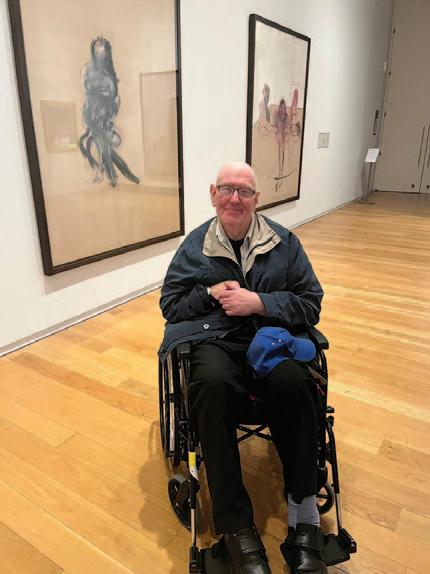

CURIOSITY AND CONVERSATION
One highlight of the day was coming across a Valais Blacknose sheep, an animal that led to plenty of discussion about what it could be. Moments like this show how curiosity and conversation are always part of life, whether that’s chatting about animals, past experiences, or the world around us.
CONTINUING LIFE TOGETHER
Outings like this aren’t just about getting out and about—they’re about continuing everyday life, spending time with others, and keeping those neighbourly connections strong. For some, especially those living with a Dementia, moments with animals can be calming and engaging.
Bringing two care homes together for shared experiences like this reflects the focus on community, choice, and keeping life familiar. It’s about making sure everyone can continue to enjoy simple pleasures, whether it’s meeting new people, exploring the local area, or enjoying conversations that feel like home.
Wednesbury care team make residents lifelong wish come true of visiting Dublin to view iconic artwork
A resident living at HC-One’s Dovedale Court Care Home in Wednesbury, West Midlands, had his wish come true of travelling to Dublin to visit the 7 Mile Art Gallery to view the range of art masterpieces on display.
Gordon Small, aged 71, who moved into Dovedale Court in July 2013, expressed to members of the care team at Dovedale Court his lifelong desire to go to Dublin, especially to visit the 7 Mile Art Gallery. Gordon has always been fascinated with art. The Home Manager at Dovedale Court coordinated the visit and planned to surprise resident Gordon on his 72nd birthday on February 28, with a short-day trip away to Dublin to make his wish come true to visit the art piece at the gallery. Kerry
Marston, Unit Manager at Dovedale Court and Vickey Reynolds, Senior Care Assistant at Dovedale Court accompanied Gordon on the trip. In addition to visiting the art gallery, Gordon enjoyed sampling scotch and having a gamble at the bookies. Dawn Allen, Home Manager at HC-One’s Dovedale Court Care Home, said: "Thank you to the care team for making Gordon’s wishes come true of going to Dublin to visit the 7 Mile Art Gallery to view the range of art masterpieces.
“Gordon is such a character, and he was blown away by the support and effort the staff had made to grant his wish. Gordon is already talking about where he’d like to go on his next adventure."
Caring for a loved one is a journey of commitment, love and dedication, but it also comes with profound challenge and responsibility.

Whether it’s elderly relatives, individuals with dementia, people with disabilities, or those with complex medical needs, ensuring their safety – especially in emergencies – is a constant concern. Your priority is always their safety and well-being. But what happens when you can’t be there?
If a person with dementia wanders, will responders know who they are and who to contact? If someone with epilepsy, diabetes, or a severe allergy experiences a medical crisis, will 昀rst responders have the right information to act quickly and safely?
MiCode, a British-made, NHS-backed innovation, understands these concerns. It offers a simple yet powerful solution designed to bring peace of mind to carers and protect those they love.
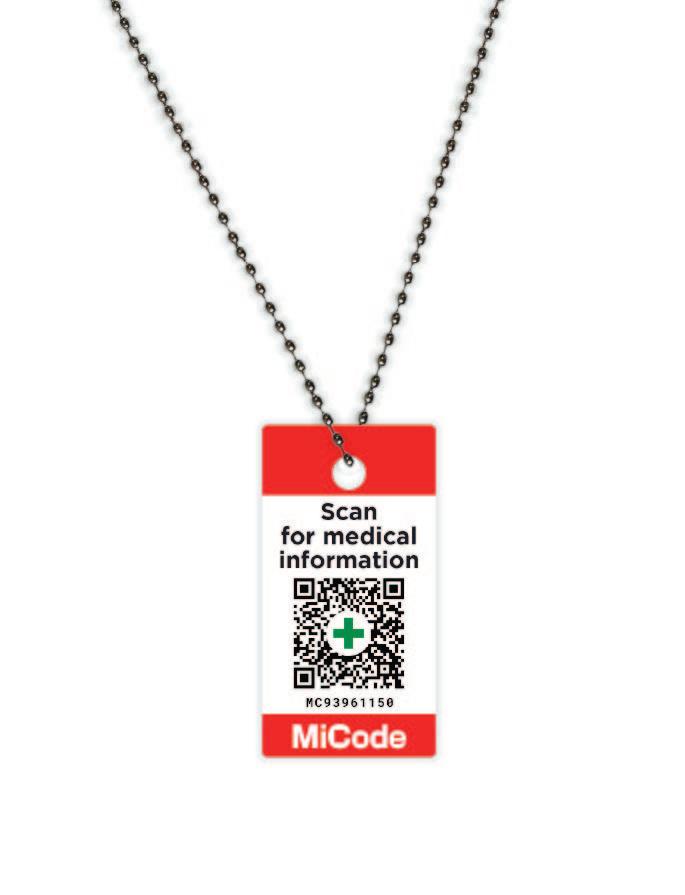
A Carer’s Story at the Heart of MiCode
MiCode wasn’t conceived in a boardroom; it was born from a place of love and necessity. Professor James Ohene-Djan, a leading technologist from Goldsmiths, University of London, and his sister Professor Louise Brown developed MiCode after witnessing the challenges faced by their brother, Anthony, who lived with multiple sclerosis (MS).



As Anthony’s condition progressed, communicating his medical needs became increasingly dif昀cult. James and Louise saw 昀rsthand how a lack of instantly accessible medical details could put vulnerable individuals at risk. They used their expertise to create MiCode – a simple, effective, and affordable way to ensure people always have their vital medical information at hand. It’s a solution built by carers, for carers.
What is MiCode, and How Does it Help?
MiCode is a secure QR code system that provides immediate access to essential medical and emergency contact information. Unlike traditional medical ID bracelets, which can only hold a few words, MiCode acts as a digital lifeline and allows 昀rst responders, paramedics, and you to access a complete, up-to-date medical pro昀le in seconds.
Each MiCode securely stores:
• Emergency contacts: Ensuring the right people are called 昀rst – including you.
• Medical conditions: Allowing paramedics and carers to make informed decisions.
• Allergy and medication details: Preventing potentially dangerous treatment errors.
• Care instructions: Supporting continuity of care across different carers and settings.
• Instant translation: Ensuring accessibility in diverse communities and while traveling abroad.
Designed for Real Life, Backed by the NHS
MiCode is a proudly British company, using cutting-edge British technology to enhance safety and ef昀ciency in healthcare. It has been developed in close collaboration with the NHS, with a particular focus on supporting children, older adults, and individuals with complex care needs.
Unlike many healthcare solutions that require expensive subscriptions or complicated apps, MiCode has been designed to be:
• Affordable: At just £2 per month or £20 annually, MiCode is accessible to individuals, families, and care organisations.
• Easy to use: No apps, logins, or complicated passwords—just a simple scan with any smartphone.
• Practical for real-world emergencies: Whether at home, in a care facility, or traveling, medical and emergency details are always accessible.
MiCode can be seamlessly integrated into daily life, making it a 昀exible and convenient tool for those receiving care, their families, and professional caregivers.
• Wearable options: MiCode can be worn as a bracelet, pendant, or keyring, ensuring it is always available in an emergency.
• Mobile integration: MiCode can be displayed on a mobile phone screen for instant access.
• Cards and stickers: Ideal for placement in wallets, on mobility aids, or in homes, ensuring carers and emergency responders can retrieve information immediately.
• Clothing and pre-printed items: MiCodes can be integrated into uniforms, lanyards, and ID badges, making them particularly bene昀cial for care home residents and individuals prone to wandering or confusion.
Unlike many digital health systems that require Wi-Fi, apps, or login credentials, MiCode is designed to work instantly with any smartphone camera. This makes it particularly useful for those who may not be comfortable with technology or who need a reliable, always-accessible solution.
For family carers, MiCode provides invaluable peace of mind. If something happens and you are not present, you can trust that 昀rst responders will have all the necessary information to provide the best possible care and contact you immediately.
For professional carers and care companies, MiCode ensures:
• Faster emergency response – Information is available instantly, without the need to search through 昀les or records.
• Improved communication between care teams – Every carer and responder has access to the same critical information, ensuring consistency in care.
• Reduced risk of medication errors – MiCode provides real-time medication details, preventing dangerous mistakes.
• Lower operational costs – At just £20 per year per person, MiCode is an affordable alternative to complex digital health record systems.
MiCode is already being adopted by care homes, assisted living providers, and NHS services, contributing to a safer and more ef昀cient care environment.

MiCode Can Save Lives
Emergencies happen when least expected. Being prepared can mean the difference between life and death.
For families, MiCode offers reassurance that their loved ones are protected, even when they are not around.
For carers, it is a simple, affordable, and lifesaving tool that ensures 昀rst responders and healthcare providers have immediate access to accurate medical information.
For care companies, it is a scalale, costeffective solution that enhances patient safety, reduces risk, and improves communication between care teams.
And for those who rely on care, MiCode is a lifeline—ensuring that in any emergency, help arrives quickly, accurately, and ef昀ciently.
MiCode isn’t just technology; it’s a way to empower you, the carer, and protect the ones you love.

Learn more and 昀nd out how MiCode can bring peace of mind to your caring journey at micode.uk.
View an Explainer video for Carers at https://tinyurl.com/cr6mu8cd
People with dementia can enjoy productive and rewarding working lives in the digital era, contrary to the widespread stereotype that dementia is incompatible with the use of modern technology, according to new research from the University of Bath.
The study – Working lives with dementia: A digital futures perspective – argues that the digital revolution risks exacerbating inequalities amongst those with diverse needs but that organisations can and should develop, adapt and deploy digital technology and the working environment to help those with dementia to continue in employment.
“The bottom line is that we have an ageing population and workforce in which dementia will feature and which should, and can be, accommodated by the judicious use of digital technology and adapting working conditions. The reality is, this is not dealt with in any meaningful way right now – there are very rarely strategies in place,” said Dr James Fletcher of the University of Bath School of Management.
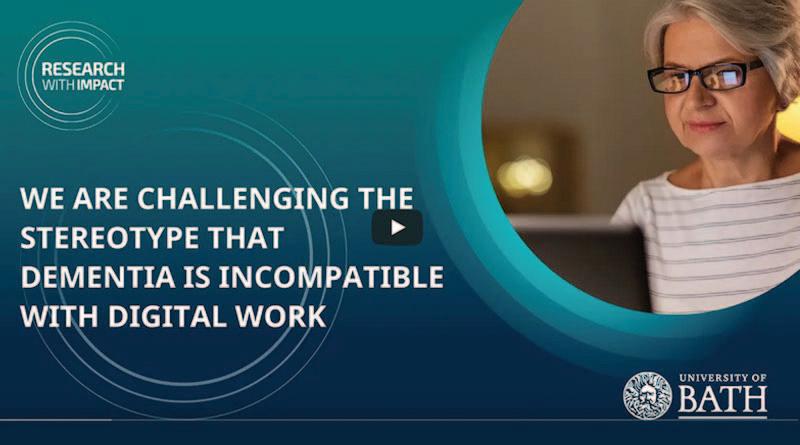
“There is widespread prejudice that those with dementia cannot cope with, or benefit from, digital technology, and they often get bundled into the same category as the oldest people. But it’s worth putting some perspective on this – an experienced 60-year-old employee with early stage dementia will have grown up through the digital, internet and social media revolutions – and with the right support, they will still have much to offer,” Dr Fletcher said.
The study was published as the UK government announced its welfare reform plans, part of which is to encourage more disabled people into work. Dr Fletcher said he hoped the research could be a useful example of the prospects and challenges of fulfilling that goal.
Dr Fletcher noted that quite simple adjustments to the working environment, such as improving workstation lighting, using appropriate fonts and colour schemes, and providing workers with calendars, voice activated controls, and automatic reminders could make a big difference for somebody diagnosed with
dementia.
“And AI offers really interesting opportunities – it is superb at solving many of the problems faced by those with dementia, such as finding words, organising text and putting words in the right sequence. Couple that with the potential offered by hybrid working for those with dementia, and you can see the benefits for both employees and companies,” he said.
Dr Fletcher and his co-researcher Dr Olivia Brown argue that dementia is not inherently disabling and that its impact depends heavily on the environment and surroundings in which an employee is operating. Employers might consider, for example, that an employee with dementia may be able to access a building with a swipe card but may be foiled if access relies on codes that they have to remember.
“We need to approach this in the way we already respond to people with diverse needs, which is already familiar to most employees. Also, there is a misplaced tendency to see a dementia diagnosis in black and white terms when the reality is, the effects can vary day-to-day and hour-to-hour depending on environment and relationships,” Dr Brown said.
Dr Fletcher said that employees could suffer tremendous stress from a dementia diagnosis and disclosing this to their employer, with some developing strategies to conceal their condition. He said that, while we lack good statistics, it appears that the ‘vast majority’ of those diagnosed with dementia go into unemployment, often unwillingly.
“There are many who could stay in the workforce and don’t. And this is not just an issue for older people –growing numbers of younger people are being diagnosed,” he said.
The researchers noted that dementia is often considered to be a post-retirement phenomenon, but estimates suggest that 9% of the 35.6 million people worldwide with dementia are under 65 years of age, with around 370,000 new cases of young onset dementia annually.
WATCH THE FULL VIDEO HERE
Residents at Alex Wood House care home in Cambridge have had a wonderful time reminiscing, thanks to the Royal Mint Museum’s ‘Museum in a Box’ project. This time, the care home chose to borrow the Decimalisation Box, bringing back memories of the significant monetary changes that took place in 1971.
Home Manager Julie Fuller shared, “Our residents really enjoyed the Queen’s Jubilee Box a couple of years ago, so we decided to try the Decimalisation Box this time.
“We are always on the lookout for something new or different for our daily lifestyles sessions. It has been a wonderful opportunity for reminiscing.”
The interactive nature of the box allows residents to handle real and replica coins, sparking conversations about their past experiences. A small purse filled with pre-decimal coins helped residents recall fond memories of childhood events, such as receiving pocket money from parents, the excitement of finding a coin from the tooth fairy, or even the tradition of placing a coin into the cork of a celebratory bottle.
Coins have played a significant role in everyday life, and this activity allowed residents to reflect on their past. Many recalled the times when coins were placed in Christmas puddings for good luck, thrown into wells to make wishes, or used for decision-making by flipping heads or tails.
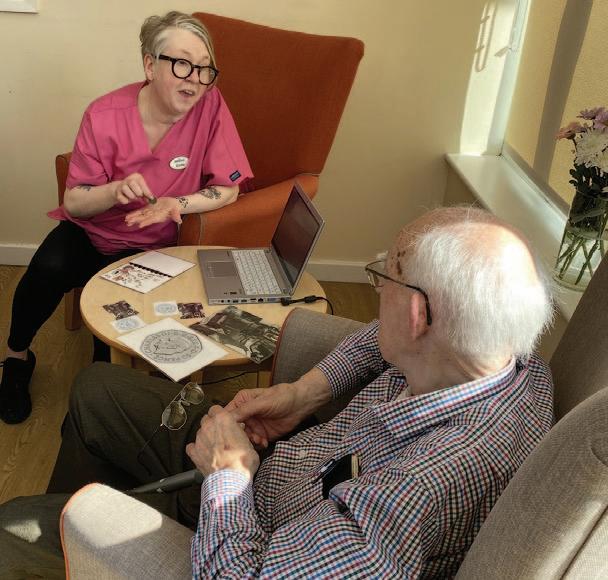
Every coin holds a unique story, and the residents eagerly shared their own personal connections with these pieces of history.
The Museum in a Box is designed to be more than just an educational tool; it is a sensory experience. The collection contains twelve objects, including a replica medal, a miniature Shove Ha’penny Board, and a 1953 Coronation Crown. Each object is fitted with a microchip that, when placed on the accompanying electronic box, plays an audio clip providing historical context and storytelling.
The Royal Mint Museum’s reminiscence project aims to support positive well-being for those in residen-

tial care by offering stimulating and engaging activities. Care homes across the UK can borrow these boxes to run reminiscence sessions, allowing residents to interact with a piece of history in a meaningful way. For the residents of Alex Wood House, the experience has been a heartwarming journey through time, offering laughter, nostalgia, and shared stories.
THE IMPORTANCE OF REMINISCENCE ACTIVITIES
Reminiscence activities play an important role in enhancing wellbeing and can be beneficial in a variety of different ways.
1. Stimulates memory – Encourages recall of past experiences, helping to maintain cognitive function.
2. Enhances wellbeing – Brings joy and comfort through positive memories.
3. Encourages social interaction – Promotes conversation and strengthens bonds with fellow residents and caregivers.
4. Boosts self-esteem – Allows residents to share life experiences, fostering a sense of value and purpose.
5. Improves communication skills – Helps those living with dementia or cognitive impairments to express themselves.
6. Provides sensory stimulation – Handling familiar objects and listening to associated sounds enhances engagement.
7. Connects generations – Creates opportunities for meaningful discussions with team members and visitors.
8. Encourages participation – Offers a structured yet enjoyable activity that residents can actively engage in.
9. Preserves cultural and personal identity – Helps residents maintain a link to their past and shared traditions.
By incorporating reminiscence activities like the Museum in a Box, Alex Wood House provides enriching and meaningful experiences that contribute to the overall happiness and engagement of their residents.
Bushey House Beaumont, a Barchester Healthcare care home, recently celebrated a significant milestone for their beloved chef, Shaun McCluskey, who has completed 15 years of dedicated service. Staff and residents came together to honour Shaun's unwavering commitment to providing delicious and nutritious meals.
Shaun has been a passionate advocate for resident well-being through his culinary expertise. He has been dedicated to creating healthy and tasty meals for the care home residents over the past decade and a half and his sense of humour always brings a laugh to the team.
To commemorate his achievement, Shaun was presented with a
voucher, a prestigious gold Barchester pin, and a bottle of whiskytokens of appreciation for his years of hard work and loyalty.
"Shaun's dedication to our residents is truly remarkable," said Mary Jane, Home Manager of Bushey House. "His passion for cooking and his commitment to providing nutritious meals is evident in every dish he prepares. We are incredibly grateful for his 15 years of service and look forward to many more."
"I'm truly touched by this celebration," said Shaun. "It's been a privilege to serve the residents of Bushey House for the past 15 years. I'm passionate about what I do, and I'm grateful to be part of such a wonderful team."

New survey insights reveal the far-reaching impact caregiving can have on physical and mental well-being, with over half (54%) of caregivers reporting weekly back, joint or muscle pain, and 1 in 5 (19%) experiencing daily stress or anxiety.[i] Dr Dawn Harper shares her tips to help cope.
There are approximately 4.7 million unpaid carers in the UK,[ii] defined as those who provide unpaid care for someone who is ill, disabled, older, has mental health issues or struggles with addiction. However, this figure excludes the many who regularly care for children, neighbours or friends and family needing support beyond the traditional definitions. Carers UK estimates that the number of unpaid carers could be as high as 10.6 million, highlighting a significant lack of personal and societal recognition of what it truly means to provide care.[iii]
A new survey, commissioned by GOPO® Joint Health – a leading supplement proven to reduce pain and stiffness and improve mobility – polled 1,001 self-defined caregivers. The findings reveal the true impact of caregiving on mental, emotional and physical health.
Over one-third (37%) have experienced significant strain, discomfort or injury to their joints as a result of assisting or lifting the person they care for, and almost half (47%) frequently endure persistent aches, stiffness or pain that lingers long after caregiving tasks.i As a result, one-third (32%) rely heavily on pain medication, putting their own long-term health at risk.
The mental toll of caregiving is profound, with almost half (46%) of caregivers feeling emotionally drained by the relentless stress it brings. One in seven (13%) rely on support services for their well-being, while nearly half (44%) experience loneliness or isolation at least once a week, often facing the demands of caregiving alone.
Despite these challenges, almost half (49%) of respondents cannot remember the last time they practiced self-care, admitting that their own needs always come last.i While caregivers devote themselves to others, acknowledging the importance of self-care, and setting aside time for their own well-being is vital.
Dr Dawn Harper, formerly a caregiver to her mother, NHS doctor for over 30 years and author of ‘Live Well to 101’, comments: “Caregiving is a labour of love, but the selfless nature of the role puts many caregivers at serious risk of poor health. As a GP I see first-hand the impact that caring can have on both physical and mental ill health. To continue supporting others, it’s vital to care for yourself first. Just like the safety advice on an aeroplane – put on your own oxygen mask before helping others. Prioritising your own wellbeing ensures you have the strength, resilience and capacity to provide the care your loved ones need in the long-term.”
Dr Dawn Harper provides her top tips to support caregivers’ health and well-being: Seek support from peers: “It can be easy to lose your identity when providing care, so it’s important to connect with peers who are in a similar situation. If you are unable to leave the house often, online forums or virtual coffee sessions can provide an outlet to enable you to open up to someone who understands exactly
what you’re going through. Their acceptance and understanding can be a great way to support your emotional health and leave you feeling less alone.”
Schedule self-care: “Caregiving often leaves little time for personal well-being, but self-care isn’t a luxury, it’s a necessity. Schedule self-care just like any essential appointment and if you’re struggling to find the time, start with small manageable breaks of just 5-10 minutes and commit to doing one thing that makes you feel recharged. This could be as simple as having a cup of tea in silence or reading a few chapters of your favourite book.”
Build your mental resilience: “Mental resilience helps caregivers manage stress, maintain emotional balance and continue providing care without burning out. Incorporate techniques such as mindfulness, deep breathing, yoga or meditation, all of which can be practiced in as little as 15 minutes. If you are struggling with your mental health, make sure to reach out to mental health helplines or listening services, or discuss your feelings with your GP or pharmacist.”
Prioritise your physical health: “Caregiving is a physically demanding role, and these survey findings reveal the true toll caregiving can take on your physical health. Protect your joints and posture by using proper lifting techniques when assisting with mobility, and address any aches and pains early to help prevent chronic conditions from appearing later down the line. A joint health supplement such as the galactolipid, GOPO, a compound derived from rose-hip, may be of great benefit, with research indicating that it can effectively relieve joint pain.[iv] The natural anti-inflammatory properties of GOPO make it a viable replacement to pain killers,iv without the risk of harmful side effects, and a sustainable way to manage pain long-term.”
Extensive studies involving over 400 patients with chronic pain conditions, such as osteoarthritis, have shown that GOPO® produces significant and consistent pain relief and improved joint function. In one study, 8 out of 10 patients reported a significant reduction in pain after just 3 weeks of GOPO®.[v]
GOPO® Joint Health is available from Boots, Amazon, and independent chemists and retailers nationwide. Visit www.gopo.co.uk for further information.
[i] GOPO® Joint Health survey on 1,001 caregivers in the UK. January 2025.
[ii] The Kings Fund. 2024. What are unpaid carers, who are they and how often do they provide care? Available at: https://www.kingsfund.org.uk/insight-and-analysis/data-and-charts/unpaid-carersnutshell#:~:text=According%20to%20the%202021%20Census,females%20from%20the%202011%20Census. (Accessed: January 2024). [iii] Carers UK. 2023. Annual Report 2022-2023. Available at: https://www.carersuk.org/media/ynfpnjwk/carers-uk-annual-report-22_23 (Accessed: January 2025).
[iv] Winther, K et al. “A powder made from seeds and shells of a rose-hip subspecies (Rosa canina) reduces symptoms of knee and hip osteoarthritis: a randomized, double-blind, placebo-controlled clinical trial.” Scandinavian journal of rheumatology vol. 34,4 (2005)
[v] Winther, K et al. “A powder made from seeds and shells of a rose-hip subspecies (Rosa canina) reduces symptoms of knee and hip osteoarthritis: a randomized, double-blind, placebo-controlled clinical trial.” Scandinavian journal of rheumatology vol. 34,4 (2005)
[vi] Rein E, Kharazmi A, Winther K. A herbal remedy, Hyben Vital (stand. Powder of a subspecies of Rosa canina fruits), reduces pain and improves general wellbeing in patients with OA – a double-blind, placebo-controlled, randomised trial. Phytomedicine 2004.
[vii] Christensen R et al. Does the hip powder of Rose canina (rosehip) reduce pain in osteoarthritis patients? – a meta-analysis of randomised controlled trials, Osteoarthritis Cartilage (2008)
[viii] Schwager J, Richard N, Wolfram S. Anti-inflammatory and chondro-protective effects of rosehip powder and its constituent galactolipids GOPO Poster presentation at the World Congress of Osteoarthritis (OARSI) 2008
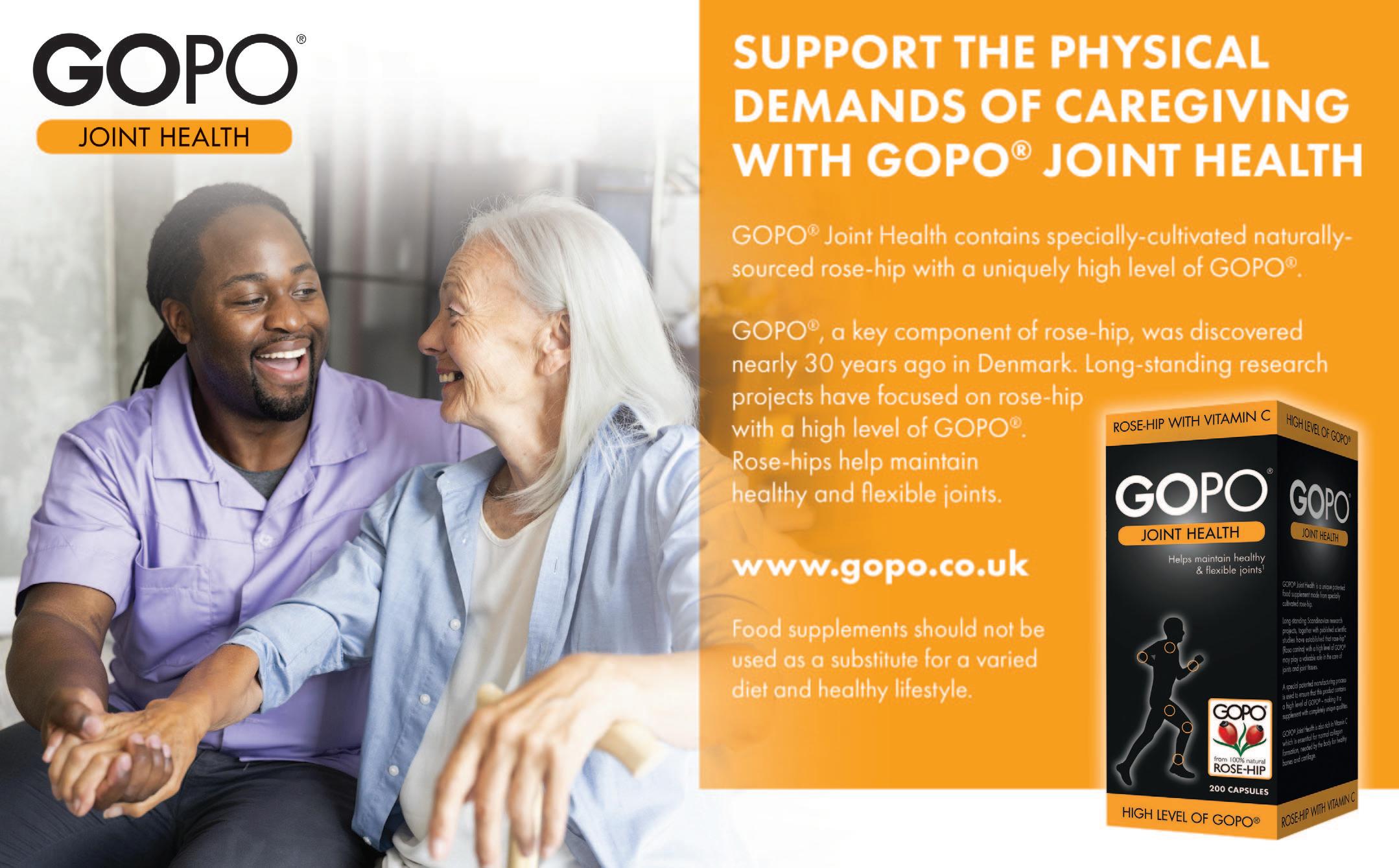

A delightful intergenerational friendship has blossomed at HC-One Scotland's Murrayfield House Care Home, in Edinburgh, where residents are swapping stories, wisdom, and encouragement with students from Erskine Stewart’s Melville School through an inspiring pen pal initiative.
The letter exchange has sparked joy and nostalgia, with residents sharing tales from their rich lives and offering heartfelt support to their young correspondents. Four Murrayfield House residents have become pen pals with students aged 15-16, who are currently studying for their exams.
Murrayfield House residents Nanna Bell, Morna Stewart, Jean Walker, and Rita MacDonald have enjoyed exchanging letters with the students, sharing life stories, words of encouragement, and thoughtful insights. The students have also gained a window into the past and a boost of encouragement as they tackle their studies.
Murrayfield House resident Jean Walker, who is a former teacher and headteacher at Clarebank School in Edinburgh, spent her life dedicated to education and nurturing young minds. Jean earned her teaching qualifications from Moray House School of Education and Sport at the University of Edinburgh and would go on to leave an indelible mark on countless young minds.
She fondly recalls cherishing her experiences teaching students with disabilities and the memories of camping trips. This heartwarming initiative has not only bridged the gap between generations but also filled Murrayfield House with a renewed sense of connection and purpose.
Fiona Truesdale, HC-One Scotland’s Murrayfield House Care Home Manager, stated:
“Our residents have thoroughly enjoyed corresponding with their pen pals, and it has been heartening to see how much this interaction has enriched their lives.”
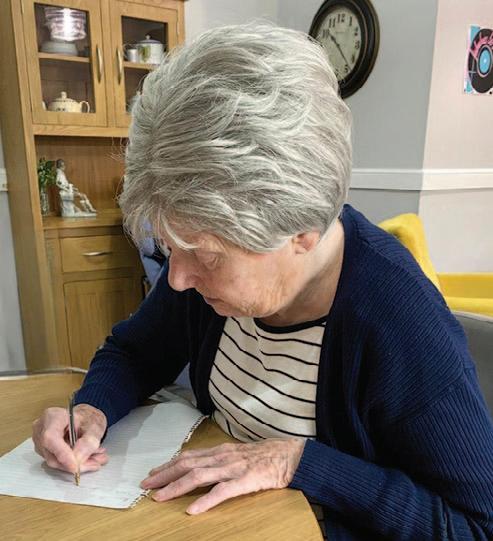
Residents of Bushey House and members of the local community were deeply moved and enriched by the powerful testimony of Holocaust survivor John Fieldsend, 93, who shared his remarkable story of survival and resilience.
John Fieldsend, author of "A Wondering Jew," recounted his harrowing experiences of escaping the Holocaust. Born in Czechoslovakia in 1931, John's early life was disrupted by the rise of Nazi persecution, leading to a perilous journey to safety.
John shared his escape through the Kindertransport, a rescue effort that brought thousands of Jewish children to safety in Britain. John also spoke about the impact of anti-Jewish prejudice and his ability to find resilience and build a meaningful life
which included discovering faith as a Christian.
John's personal account was a moving experience for all present. There were few dry eyes as the Holocaust survivor read out a letter received from his parents shortly before they died in the Nazi gas chambers.
"We were honoured to welcome John Fieldsend to Bushey House," said Mary Jane, Home Manager. "His story is a powerful reminder of the importance of tolerance, understanding, and the enduring strength of the human spirit. We are so grateful that he shared his experiences with us."
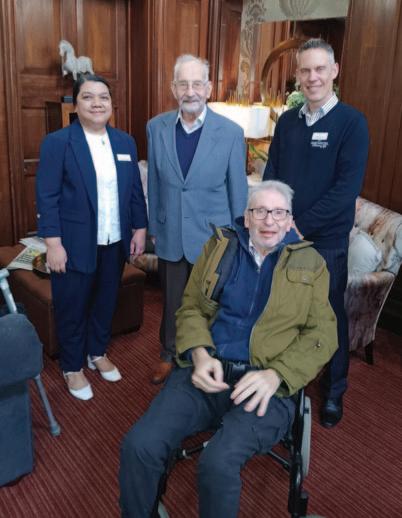
Fashionistas at care homes across the south donned their most colourful and extravagant hats to flag the importance of research into the causes and potential cures of brain tumours.
Colten Care homes in Dorset and Hampshire marked #WearAHatDay with fun activities and community engagement in aid of the charity Brain Tumour Research.
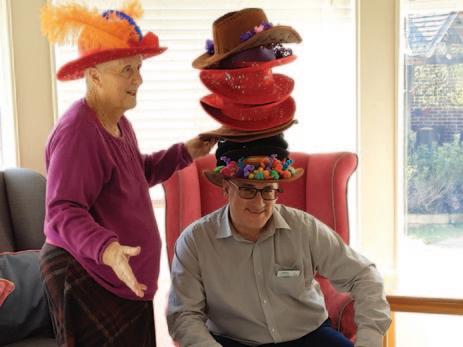

The annual fundraiser saw residents and staff put on hats of all shapes and sizes, take part in hat-making workshops and outdo each other with ‘Royal Ascot’-type creations.
At Abbey View in Sherborne, members of the home’s art club decorated hats for an Ascot-themed tea and race afternoon.
Held on a specially marked out track in the lounge, the racing involved residents posing as jockeys and giving instructions and tips to staff members pretending to be horses.
Ordering proceedings as race caller, in army hat, was David Froud.
Fellow resident Pippa Noyes, a keen horsewoman until her late 70s, spoke of her memories of attending Ascot in years gone by after she won her race.
Pippa, whose ‘horse’ was Housekeeping Supervisor Tracey Stratton, said: “It was mayhem but a lot of fun and everyone looked oh so elegant in their head attire.”
Elsewhere, more than £120 was raised at New Forest home Woodpeckers. Residents there held a six-hour
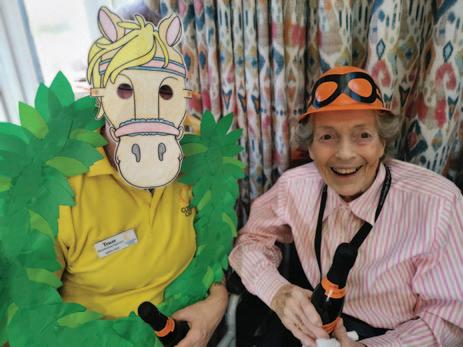
hat swap relay challenge and went on a minibus trip to the coastal village of Calshot wearing fancy head gear. Woodpeckers Companionship
Team Leader Jane Bunker said: “Wearing a hat reminds us of those who have been personally affected by cancer. Wear a Hat Day is a great way to raise awareness and precious funds for research.”
At Avon Cliff in Bournemouth,
residents and staff came together for a hat-making workshop using recycled materials ahead of a parade of the best creations judged by Home Manager Theresa Sales.
As well as brain tumour awareness, the activity supported Avon Cliff’s nominated charity of the year, Wessex Cancer Support.
At Fernhill in Longham, residents worked with children at Hampreston First School in nearby Wimborne to make and display Easter bonnets.
Canford Chase in Poole combined Wear a Hat Day with a community ‘Tea & Togetherness’ afternoon and a horse racing grid game with players invited to don a fancy hat to take part.
Other Colten Care homes hosting community events for Wear a Hat Day included Newstone House in Sturminster Newton and the Winchester homes Abbott Barton and St Catherines View.
According to Brain Tumour Research, brain cancer kills more children and adults under the age of 40 than any other cancer.
St Wilfrid’s Hospice in Eastbourne has taken delivery of two new cuddle beds to enable patients to get closer to loved ones.
The large adjustable medical beds were funded by Helen Stenlake, the Rotherwick Foundation, Hobson Charity, the Fitton Trust and an anonymous donor.
Helen was keen to help purchase the beds after her husband Andy stayed at the hospice for four weeks before he died. “The nurses pushed two hospital beds together so we could get a bit closer, but with pillows stuffed down the gap it wasn’t that close. Although I was grateful just being able to lay down and see him,” she said.
“Then when someone told us that cuddle beds existed, Andy and I talked about it, and he said maybe that's something we could do to make a difference for future patients. It felt like some good could come of his legacy if other people could benefit. And I was happy to help as I don't want Andy to be forgotten.”
Counselling Lead, Ella Williams, came up with the idea of getting a cuddle bed after a conversation with
a patient who felt insecure because her treatment had changed the way she looked.
“Hospice care is about looking after all aspects of a person’s wellbeing, and this includes sex and intimacy. It shouldn’t be a taboo subject. Just because you’re ill doesn’t mean you don’t want to be close to your partner,” Ella said.
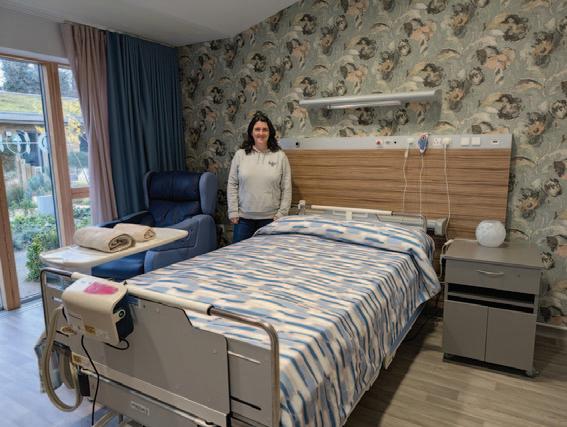
“The beds are also good for family and friends who want to sit close to their loved ones. We’re so grateful to our kind donors who have funded these wonderful beds. They are already making such a difference.”
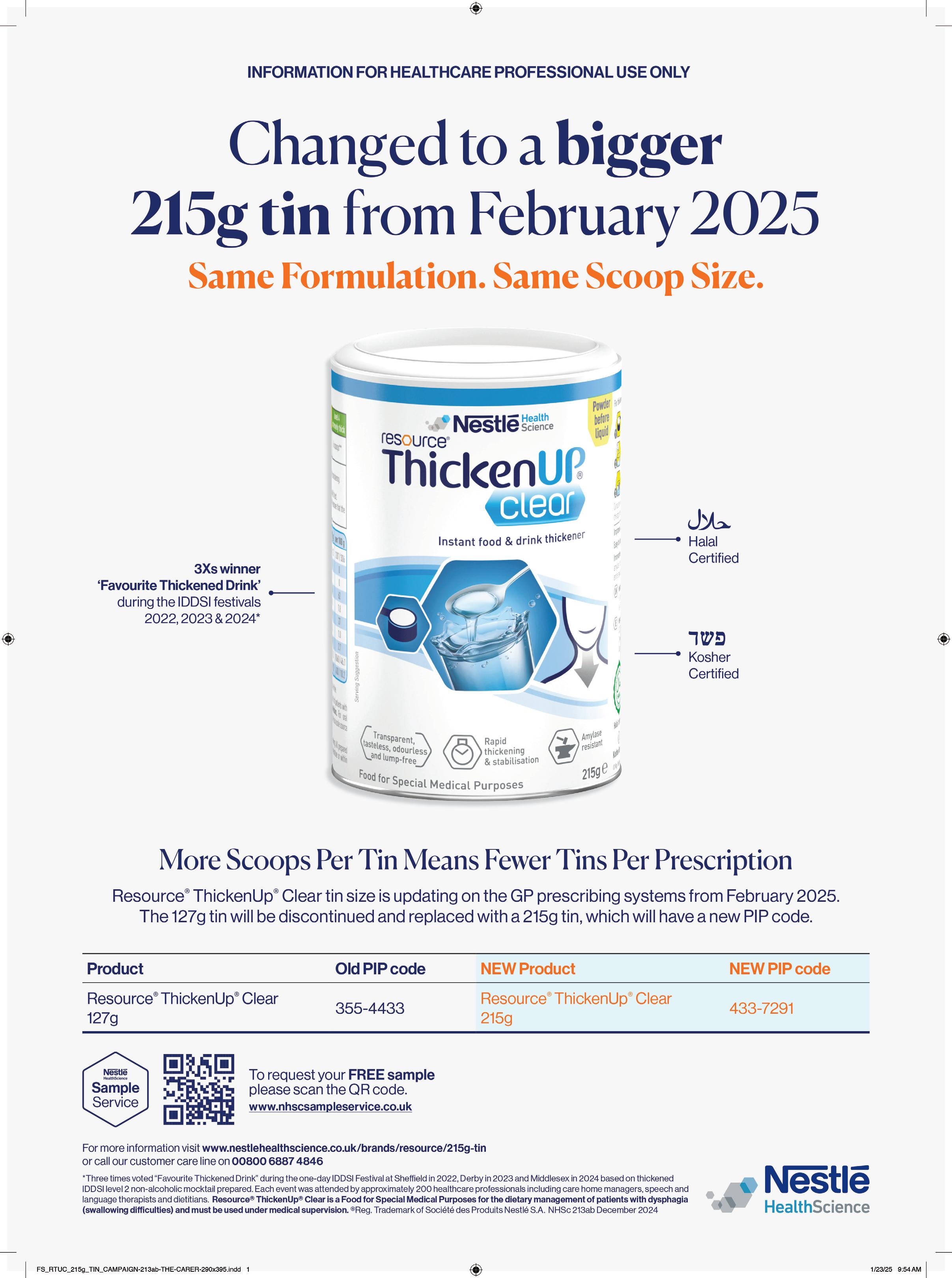


A family business has launched the UK’s first frozen nutritional supplement, ideal for care home residents who may be struggling to eat or drink.
icesupp are 100% plant-based frozen supplements, enriched with key vitamins, minerals, protein and calories, delivered in ice lolly formats to provide an easy-to-consume source of nutrition.

Amy Smith and her partner Robert Upton got the idea when they realised the lack of options for Amy’s father Ray as he struggled to build and maintain his weight during bowel cancer treatment.
Managing a conventional diet was very difficult, and the nutritional supplements available on prescription were unpalatable - too thick and sickly. However, Ray did discover that ice lollies were soothing and easier to consume.
“We were frustrated that the ice lollies Dad was having were just filled with sugar and water, and didn’t provide the nutrition and quality calories that he needed to keep his weight and strength up,” says Amy.
“The idea for icesupp was born – and it became our mission to create something that would combine the nutritional elements of a supplement shake with the more palatable form of a soothing iced refreshment.”
BAPEN’s Malnutrition and Nutritional Care Survey (2023) highlighted that nearly well over half (48%) of adults screened across UK health and care settings were at risk of disease-related malnutrition. This was particularly high amongst individuals with cancer, gastrointestinal conditions respiratory conditions, frailty and neurological diseases – so this is a very real issue for carers and families across the UK.
Following two funding rounds, Amy and Rob worked Reading University’s Food Science Department and a team of specialist advisors including top dietitians, an oncologist and a GP to create their unique, first-tomarket products, which come in two flavours – Mango & Passionfruit and Mixed Berries. 100% plant-based, each 86ml supplement pouch contains 5g of protein, 2.5g of fibre and 150 calories -
helping those who are struggling to eat to build strength and energy. A box of 12 products costs £23.75 from icesupp or Amazon. The products are shipped in ambient liquid form to be conveniently frozen then deliver the soothing sorbet-like iced consistency.
Nick Dutton, of Primrose Bank Care Home, says: "Helping those we care for to maintain and increase their nutritional intake is no easy task, made even more challenging when coupled with other dietary requirements, palliative care needs and the general challenges the care sector faces.
“When we came across icesuspp we were interested straight away. Having seen our own relatives struggling to eat well during palliative care and facing malnutrition and knowing the difficulties faced with different nutritional supplements and changing taste, we knew that a different way to deliver nutrients and flavour was a great idea.
“icesupps taste really good and we have had brilliant feedback from everyone in the home, residents, families and staff alike. We love that they are easy to store and also easy to eat without needing lots of preparation to make them enjoyable like some ONS.
“It’s great to have another tool for our team to use to improve our residents’ lives."


Amy concludes: “We have created an iced supplement that soothes and nourishes, helping to provide a moment of refreshing relief for those in need. Our goal is to help families like ours, who have experienced the devastating effects of dramatic weight loss and malnutrition, which can impact anyone, however those that are particularly at risk include those with an illness like our Dad such as cancer, and those aged over the age of 65, especially if they are in a care home or have been recently admitted to hospital.”
Dietitian Corrine Toyn says: “Malnutrition can be caused by range of factors. In the case of Ray, it was the side effects of the illness and his treatment, which is very common – but we know it is a real issue in care homes, along with dehydration. Oral nutrition supplements have been part of the solution to malnutrition for a while, as long as patients find them palatable and are compliant, but the majority of the ‘ready to drink’ supplements are highly concentrated, with a thick consistency that can be difficult to consume. Improving the flavour, mouth-feel and variety is vital to prevent patients’ taste fatigue, provide choice, and ultimately improve their quality of life. icesupp is such a brilliant idea, created with love and expertise, to respond to a real problem. It’s been incredible to see the reviews from customers, saying that icesupp tastes great and is easy to consume.”
For further information, email info@icesupp.com or visit the website at www.icesupp.com
Heathcare professionals can access the sample service at www.icesupp.com/pages/the-healthcare-professionals-hub

Taylor & Taylor, a group of family-owned residential care homes approached food procurement experts, allmanhall to achieve scalable cost savings and efficiencies to support their growth plans. They needed to ensure no detrimental impact to the excellent quality of their food offering and their residents’ dining pleasure.
Their desire was to achieve a 5% food cost saving and to ensure ongoing effective management of catering budgets and invoicing. Operationally, access to reports and insights were key, as was ease of ordering and management of stock and deliveries.
allmanhall undertook a like-for-like benchmark and identified achievable food cost savings of 11.4% - more than double the initial objective!
allmanhall delivered tech demos of the catering control platform for Taylor and Taylor, ensuring it met their needs and provided training for the team. As well as providing useful operational functionality like stock taking and standing orders, the catering control platform proposed would also give access to management reports and facilitate central billing and conversion of all supplier invoices in to 1 per month. Samples and on-site supplier meetings were also arranged on behalf of the homes, to confirm that the quality was to the required standard.
allmanhall have also supported Taylor and Taylor with the launch of a community engagement event for one of their newest homes.
A few months into the contract, the actual results were found to be an 18% food cost saving! You can watch this short video on You Tube to find out more… www.youtube.com/watch?v=e2QrrmaiG1Y
“From day 1, the care and attention provided by allmanhall has been exceptional. The team truly listen to us, to what our challenges are and are always willing to help in any way they can. Their approach is thorough and responsive, meaning we feel fully supported. Everyone we’ve met from allmanhall has been hands-on, down to earth, genuine and considerate.
We’ve been impressed by the savings we’ve already seen, the flexibility regarding suppliers and by the excellent quality. The consolidation of invoices into 1 per month is a huge win.
We have relationships and contact with people across the allmanhall team – all there to help and to advise or resolve depending on what we need. With challenges around labour shortages and food inflation, this is hugely valued. It frees up the team and gives us peace of mind.
We would wholeheartedly recommend allmanhall’s services to others in the care sector and look forward to continuing to grow our offering and provide outstanding food for our residents, with allmanhall as our trusted partners.”
allmanhall is an owner-managed, award-winning and trusted food procurement partner for care organisations across the UK. We help clients with a range of needs, including cost savings, administrative efficiencies, supplier management, dietetics and nutrition support, and sustainability goals. Get in touch to find out more:
Email: hello@allmanhall.co.uk
Telephone: 01225 745520
Website: allmanhall.co.uk
LinkedIn: @allmanhall

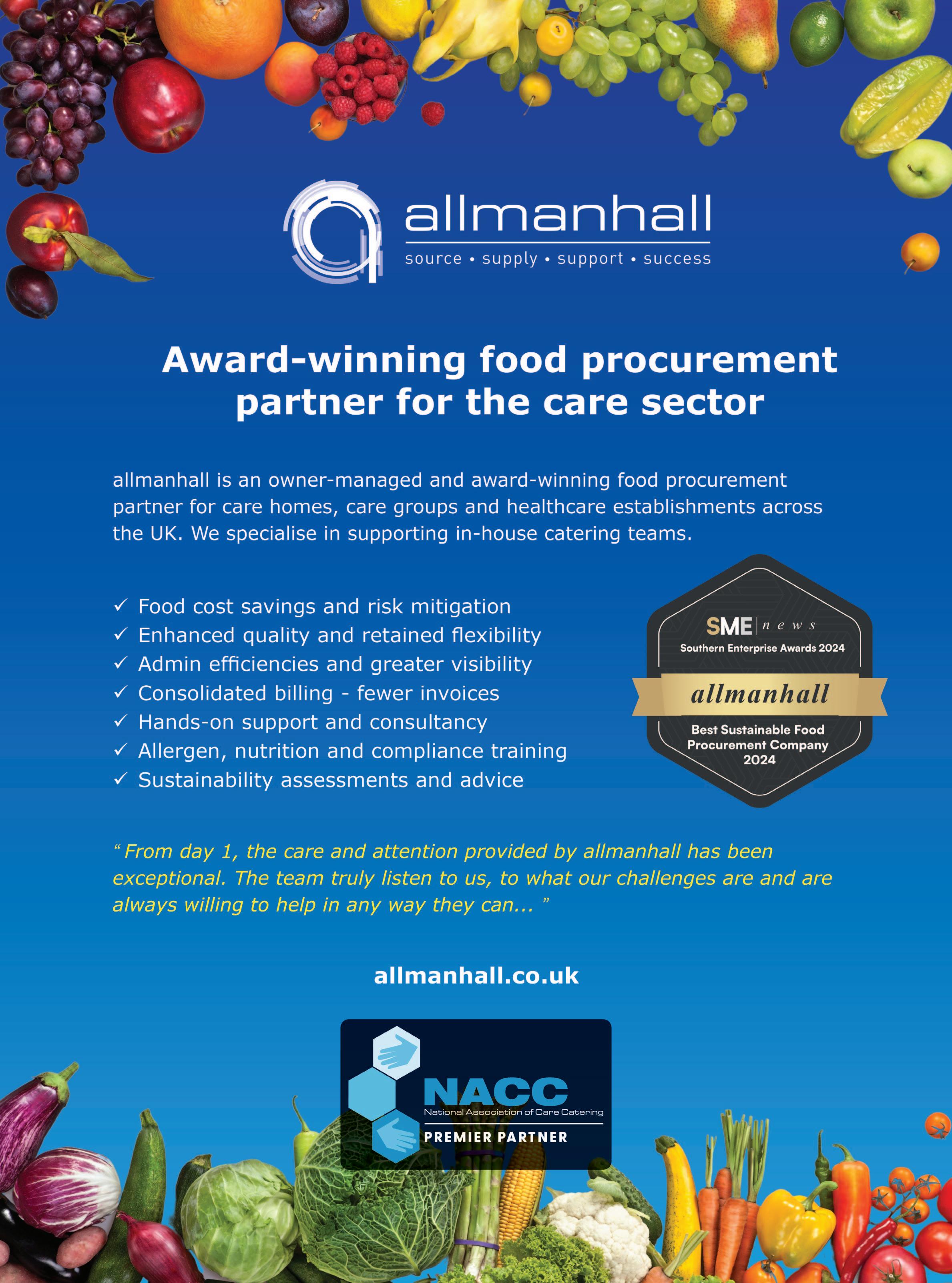
By Derek Aaronson, Founder & CEO of
Hart Home Group (www.harthomegroup.co.uk)

Infection control and prevention are critical components in safeguarding the health and well-being of individuals in medical, commercial, and domestic environments.
For the independent nursing and residential care home sector, maintaining stringent infection control measures is not just a matter of compliance, but a fundamental responsibility to ensure the safety of vulnerable residents. As the world continues to grapple with new and evolving health threats, the importance of infection prevention cannot be overstated.
THE
For nursing and residential care homes, infection control is especially crucial. Residents often have weakened immune systems due to age or pre-existing conditions, making them more susceptible to infections. In such settings, even a minor lapse in hygiene protocols can lead to the rapid spread of pathogens, which can have devastating consequences. Healthcare-associated infections (HAIs) continue to be a significant risk in care homes, leading to longer hospital stays, higher medical costs, and, in severe cases, death.
Therefore, infection control in care homes requires a combination of effective policies, thorough cleaning routines, and specialised equipment. Staff must be well-trained in infection prevention, and robust systems need to be in place to manage outbreaks when they occur. However, achieving a high standard of hygiene in care homes comes with its own set of challenges.
INFECTION CONTROL IN CARE HOMES
THE
Maintaining high levels of hygiene in care homes can be difficult for several reasons. The close proximity of residents, especially in shared rooms, communal spaces, and bathrooms, increases the risk of cross-contamination. Frequent touching of high-contact surfaces such as handrails, doorknobs, and shared equipment can facilitate the spread of germs. In addition, staff turnover and the demanding nature of care work mean that infection control protocols may not always be followed consistently.
The traditional reliance on manual cleaning methods can also be timeconsuming and may not always be effective in eradicating harmful bacteria and viruses. With the rise of antimicrobial-resistant organisms (AROs), which are more difficult to treat, care homes must adopt more advanced solutions to combat the spread of infection.
SOLUTIONS TO ENHANCE INFECTION PREVENTION IN CARE HOMES
The solution to these challenges lies in a combination of better practices, staff training, and, crucially, the use of advanced infection control technologies and equipment. Specialised hospital-grade fixtures, such as antimicrobial door handles, bed rails, and mobility aids, are invaluable in preventing the spread of infection in care homes. These fixtures are designed with non-porous materials that are easy to clean and resistant to microbial growth, ensuring that harmful pathogens have fewer places to thrive.
In addition, the use of touchless technologies is gaining traction in care homes as a way to reduce human contact with frequently touched surfaces. For example, touchless faucets, soap dispensers, and hand sanitisers can significantly minimise the risk of cross-contamination. These innovations not only make it easier to maintain hygiene but also improve the overall user experience for both staff and residents, especially for those with limited mobility.
Innovative cleaning solutions, such as UV-C sterilisation devices, are also helping care homes maintain higher standards of hygiene. UV-C light has been shown to be effective at killing bacteria, viruses, and fungi on surfaces and in the air , providing an added layer of protection that manual cleaning alone cannot guarantee.
The role of design and product innovation in infection control is crucial. Products designed with infection prevention in mind—such as hospitalgrade furniture, non-porous flooring, and antimicrobial textiles—play a crucial role in reducing the potential for cross-contamination in care homes. By choosing products made from materials that are resistant to bacterial growth and easier to sanitise, care homes can significantly reduce the risk of infections spreading.
Mobility aids, including walkers, wheelchairs, and lift chairs, are another area where innovation is making a difference. Many of these products now come with antimicrobial coatings that help reduce the risk of pathogens accumulating on surfaces frequently touched by both residents and staff.
These small changes in the design of everyday equipment can contribute to a cleaner, safer environment for both residents and caregivers. Moreover, the growing use of digital solutions, such as automated temperature monitoring, air quality control systems, and remote monitoring devices, is transforming infection control in care homes. These technologies allow staff to track and manage infection risks more efficiently, making it easier to identify potential outbreaks before they escalate. EMERGING TRENDS: TOUCHLESS TECHNOLOGY AND SUSTAINABLE MATERIALS
As the infection control industry evolves, there are two key trends that are gaining momentum: the integration of touchless technology and the use of sustainable materials. The increasing adoption of touchless systems, such as motion-activated doors and automated sanitation stations, is helping to prevent the transmission of pathogens, especially in hightraffic areas. These technologies not only improve infection control but also enhance the overall user experience by reducing the need for physical interaction, which is particularly beneficial in care settings where residents may have limited mobility or dexterity.
Sustainability is another important consideration in infection prevention. The use of environmentally friendly materials—such as biodegradable cleaning products, sustainable textiles, and recyclable medical supplies— ensures that infection control measures are both effective and responsible. The growing demand for eco-friendly solutions in care homes is part of a larger global movement towards sustainability, where reducing environmental impact goes hand-in-hand with enhancing hygiene standards. Infection control and prevention are vital to ensuring the health and safety of residents in care homes. While the challenges of maintaining hygiene in these environments are significant, the solutions are becoming increasingly effective with advancements in technology and product innovation. From hospital-grade fixtures and antimicrobial mobility aids to touchless technology and sustainable materials, these innovations are helping to reduce cross-contamination and improve overall safety. As the sector continues to evolve, adopting these innovations will be key to enhancing infection prevention protocols and safeguarding the health of vulnerable individuals across nursing and residential care homes. Through a combination of best practices, innovation, and thoughtful design, care homes can create a safer, cleaner, and more resilient environment for residents and staff alike.
How can buyers of cleaning chemicals find sustainable solutions that are also effective and safe to use. The Cleaning & Hygiene Suppliers Association (CHSA) has published a White Paper designed to help: The Evolution and Regulation of Cleaning Chemicals.
Buyers and end users of cleaning chemicals want environmentally sustainable, safe and effective cleaning chemicals. Environmental mes-
sages can be seductive, particularly when coupled with highly competitive prices. In the regulated arena of cleaning chemicals, it is difficult to produce products that are effective, have a minimal impact on the environment and are sustainable. It takes years of investment and testing to get the products right and clear the regulatory hurdles. It’s not surprising, therefore, that some organisations are looking for short cuts.
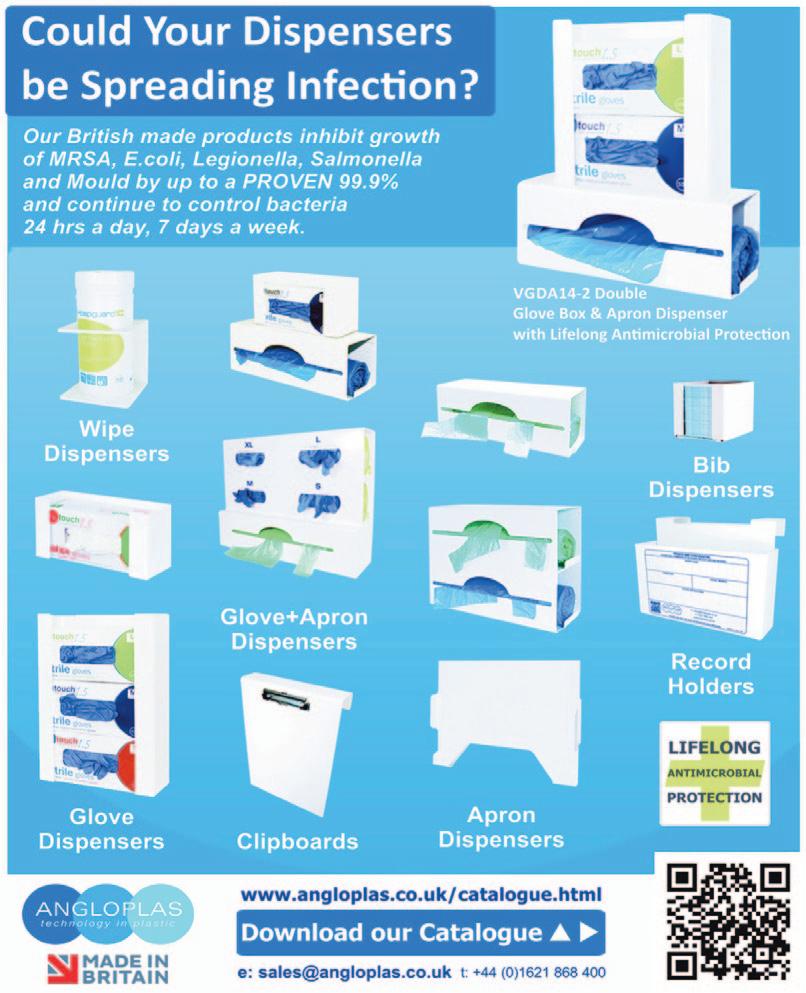
They argue technology is moving so fast there is no time for independent verification or regulation. Essentially, they are suggesting the need for some kind of environmentally sustainable solutions outweighs the need to know if the solution is indeed environmentally sustainable, if it works or how to use it to be certain it is safe.
Regulations, however, matter. They guarantee safety. They underpin transparency and ensure consistency. They provide a framework for comparison, so a buyer really knows if they are getting the product or solution they need. They also provide accountability, giving buyers a route to recourse if needed. In short, they underwrite an ethical approach.
The CHSA’s White Paper was written by Peter Thistlethwaite, Technical Manager – Cosmetics and Biocides at MSL Solution Providers. Peter is a Microbiologist and MSL Solution Providers offers an integrated regulatory and laboratory testing service. Its in-house accredited microbiology and virology laboratories provide a comprehensive range of standard tests, including efficacy testing against bacteria, fungi,
spores, viruses, mycobacteria, legionella, and algae.

The White Paper explains the evolution of cleaning chemicals. It explains how testing systems with recognised methodologies were introduced to “to prove chemicals were effective but hand-in-hand they gave a way to remove fraudulent products, offering better protections”. Peter explains in the White Paper, “Regulations are intended to ensure a cleaning product is safe for the user and the environment when used correctly. The aim of enforcing regulatory requirements is to ensure products on the market can be trusted and that the companies selling them maintain the highest standards of integrity.”
Peter continues: “Product innovation means testing and regulatory requirements in the biocide market are becoming more complex, and the costs to enter markets are rising. This is expected to lead to a rise in fraudulent products, bypassing or ignoring regulations. Many are making claims about safety and efficacy without the proper technical support from correct testing. They are also using eco-friendly language to appeal to environmentally conscious consumers. Buyers need to beware.” @CHSACleaning www.CHSA.co.uk
Angloplas are a UK manufacturer who specialise in producing dispensers for the health and hygiene industry. Although these are designed to keep the workplace tidy and uncluttered they are, more importantly, built knowing the control of healthcareassociated infections (HCAIs) are a priority for healthcare providers, and who are employing a combination of infection prevention and control strategies, including hand hygiene, cleaning, training and the adoption of new technologies, to tackle the problem.

As a result, a wide range of infection control products and technologies are emerging on the market, including antimicrobial technology. Angloplas’ range of dispensers are produced in the world’s
first proven Antimicrobial PVC with silver ion technology and which is exclusive to Angloplas. This helps reduce the risk of cross infection by stopping the growth of bacteria and mould and works continuously for the lifetime of the product, reducing levels of bacteria such as MRSA, E Coli, Legionella, Salmonella and mould by up to 99.99%. For non-clinical environments Angloplas has recently launched its new Budget Range of products which are made to the same exacting standards as the antimicrobial protected ones but with lower price tags.
You can order Angloplas products directly from its website at www.angloplas.co.uk

Ensuring strict hygiene standards in care homes is a complex yet essential task, particularly when it comes to laundry processes. With infection control a top priority, operators must comply with stringent regulations, including CQC guidelines and WRAS Category 5 requirements. The latter classifies care environments as high risk due to the potential contamination of water supplies, necessitating specialist equipment and backflow prevention measures to safeguard residents and staff. Failure to meet these standards can not only compromise infection control but also lead to regulatory penalties and reputational damage.
Laundry plays a critical role in infection prevention, yet many care homes still rely on domestic machines that are not fit for purpose. Unlike commercial alternatives, these machines do not achieve the necessary wash temperatures, cycle durations, or thermal disinfection standards required to remove harmful pathogens effectively. This not only increases infection risks but also puts facilities at risk of non-compliance. Furthermore, improper segregation of laundry—such as mixing soiled items with general loads—can accelerate the spread of infections, a concern that has only intensified in recent

years. Best practice guidance advises that care homes implement a clear separation of clean and contaminated laundry, supported by colour-coded processes to avoid cross-contamination.
Forbes Professional, an expert in commercial laundry solutions, advises care home operators to invest in WRAS-approved, commercial-grade washing machines and sluice systems designed specifically for healthcare environments. Miele’s hygiene-specific functionality, for example, ensures that thermal disinfection is achieved within every cycle, offering protection against bacteria and viruses. Additionally, hot water feeds, appropriate drainage, and compliance with Category 5 backflow prevention are crucial in preventing contamination. With evolving compliance requirements and the ever-present risk of infection outbreaks, care homes need to ensure that their laundry operations are fully up to standard. Forbes provides expert guidance and tailored site surveys to help care operators navigate these challenges, ensuring their facilities remain both compliant and safe for residents and staff alike.
We have recently set up a specialist facility in St. Neots, near Cambridge, in which we are going ahead with this specialist refurbishment programme. This programme involves purchasing existing machines, and replacing the parts on them, so that they are as good as new, whilst retaining the look and feel that existed before, but with a massively increased lifespan, and a warranty on the machines that’s as good as a warranty on a new machine to go with the refurbishment too.
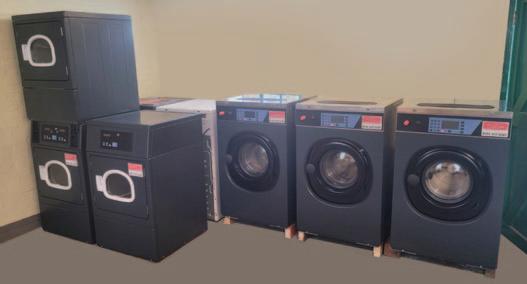
Our refurbishment programme in our specialist facility includes stripping down the machines, and giving them a check-over, to see which parts, if any, can be carried over the refurbishment. Lavamac will only carry over the highest-quality parts from the machine from pre to post
info@laundrytec.com www.lavamac.eu
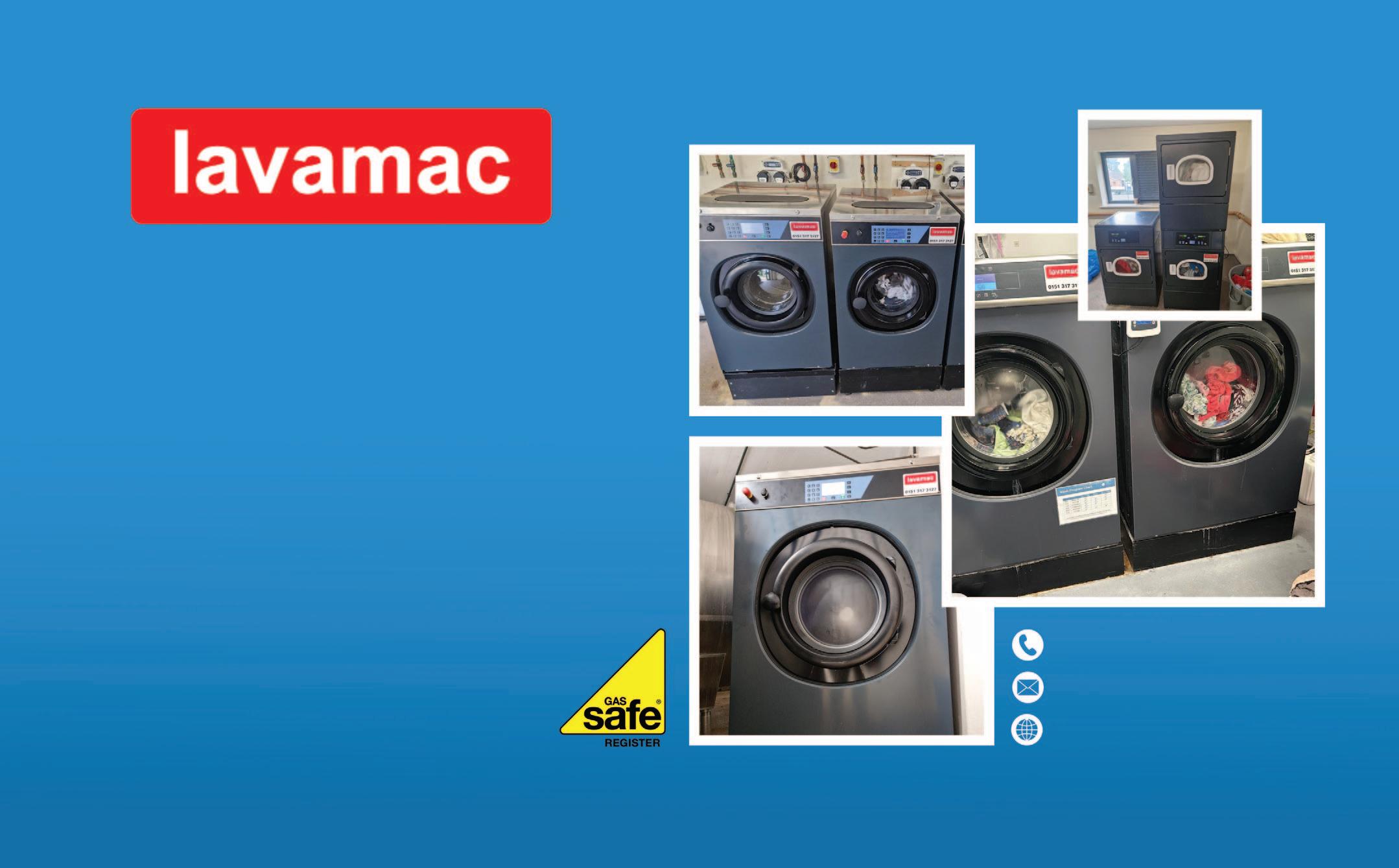

Pinpoint ltd, the UK’s leading provider of staff alarm systems to high-risk workplaces, has seen its P2 System installed in the UK’s first safe drug consumption facility, The Thistle.
The facility opened its doors on 13 January 2025 to provide a clean, safe space for the public to use drugs safely under clinical supervision. It also provides drug users with access to a wide range of treatment and support.
Pinpoint’s P2 Staff Attack System was chosen as the preferred staff safety alarm system to ensure the swift delivery of assistance in high-risk medical situations. Access to the Pinpoint P2 System ensures help can be summoned quickly providing staff with the peace of mind that help is forthcoming when they need it most.
Staff members at the Thistle will be given a personal alarm, or P2 PIT, at the start of each shift which can be activated if required with the simple press of a button.
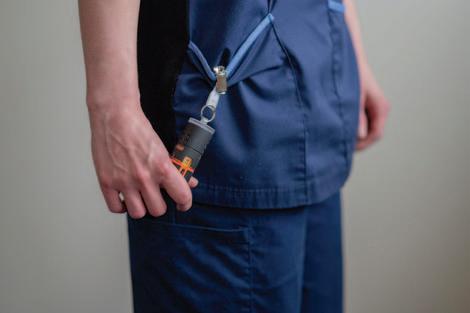
Once activated, the P2 PIT communicates with receivers located throughout the building, which in turn notifies display devices of the exact location and severity of the alarm call. This provides vital information to enable colleagues to respond appropriately.
Daniel Waring, CEO of Pinpoint Limited, said:
“Pinpoint is proud to be part of this UK first Safer Drug Consumption Facility. Having worked with The Hunter Street Health Centre, where The Thistle is based, since 2003, we are well aware of the challenges staff may face in their day-to-day duties.
“The P2 System, chosen for its precision, reliability and durability, will ensure staff can access a response when they need it most, allowing them to carry out their duties without fear and provide the highest quality of care.”
Visit http://pinpoint.ltd.uk for further information or see the advert on page 19.
Skopos Studio is a new design library idea from Skopos, enabling interior designers for Care to pick from a large range of designs to suit their project.
Categorised under different design types, such as ‘Botanical and floral, textures, stripes and checks’ this format provides choice for customers to select their end use and appropriate flame retardant base-cloth, and then select the designs and colourways which can bring their schemes to life.
The Studio collection provides a easy ‘go-to’ option containing design inspiration to create a Caring‘Home from Home’ experience. Skopos have a long history in print, with over 50 years of design experience which shines through in the Studio binder, with samples of all designs available via the

website.
Designs in Skopos Studio have been developed to work hand in hand with our beautiful accent collections and upholstery fabrics for a cross-section of projects. Choose from our fabric-only solution or a full-service option, including measure, product make-up (curtains, cushions, blinds and bed-throws) and installation. If you require something unique, our Bespoke service can offer custom colour options for a minimum meterage.
View the complete collection: www.skoposfabrics.com/studio-prints See the advert on page 4 for more information.
Chiltern Water & Environment was established in 1991 by Robert Hunt after gaining 25 years' experience as an operational and analytical scientist in the water supply industry. The company gained engineering and further management knowledge when David Hunt joined in 2012. Since then, other water industry professionals have added to the breadth of knowledge and experience within the company.
We have always provided high-quality consultancy, testing and remedial services in a professional but personable manner. Our steady growth has reflected our clients' trust in our services. Our current clients include large housing associations, pharmaceutical companies and facilities management companies, as well as individual landlords and small businesses. We ensure all our customers receive the same level of care and attention to detail.


Duty Holders of all commercial and public building premises are legally required to assess the risk from legionella to anyone using the water systems and put in place legionella control measures if required. The HSE has produced ACoP L8 and HSG274 as guidance for Duty Holders obligations.
We have clients throughout the South East, London and the Midlands, and carry out water tests nationally and internationally. We currently provide regular water sampling and testing for over 500 sites.
Tel: 01844 347678
Email: info@chilternwater.co.uk www.chilternwater.co.uk
See the advert on page 21 for more information.
Consort Claudgen’s innovation in the electric heating industry takes another leap forward by introducing Wi-Fi-enabled heaters to their low surface temperature (LST) range. These cutting-edge heaters offer unparalleled convenience and efficiency.
The heaters connect directly to Wi-Fi, enabling users to control heating through the digital control panel on the heater or via the Consort Connect app. With a comprehensive 7-day timer, which allows 24 individual heating periods per day, and features such as a lock function, open window detection, and custom automation, users can tailor their heating needs to their preferences.
Adding to the ease of use, users can view the energy consumption statistics of
all connected heaters, providing insights into usage patterns and potential savings. The LST heaters with Wi-Fi and occupancy sensors have a self-learning control ability. They utilise in-built occupancy sensors to detect and learn a user’s weekly presence in a room, creating an intuitive heating schedule. When the space is unoccupied, the heater conserves energy by switching to a setback temperature or frost protection mode.
BIM (Building Information Modelling) objects for the heaters are available for download from Consort’s website. 01646 692172 | sales@consortepl.com | www.consortepl.com
See the advert on page 5 for more information..
CareZips® Classic are patented, easy dressing unisex adaptive pants designed for older and disabled people suffering with problems associated with continence, mobility, mental function and cognition. Suitable for persons living in care institutions, receiving care at home or living independently at home, CareZips® Classic enable people to dress themselves or with assistance from carers.
CareZips® Classic feature patented 3-zipper system, which opens the front of the pants from the waist to the knees for quicker access during toileting, continence pads changes and personal hygiene. The forward positioning of the two side zippers lessens pressure on sensitive hip areas, helping to eliminate discomfort. The third zipper facilitates simple full frontal opening for faster more dignified diaper changes, catheter adjustments, personal cleansing and hygiene routines.
CareZips® Classic have many benefits for the older and disabled users and their carers:
• People dressing themselves enjoy the practical functionality and versatility of the
CareZips® Classic, all day comfort and easy garment care.
• People dependent on assisted dressing appreciate quick easy dressing process with less stress, embarrassment and greater dignity offered by CareZips® Classic.
• CareZips® Classic offer practical gains to the carers, helping them to provide better care, whilst reducing physical efforts and saving valuable time.
CareZips® Classic are unisex, available in 6 sizes and 3 practical colours (i.e. black, charcoal and navy). Tapered fit at the ankles gives a tidy appearance. Made from breathable moisture-wicking 4-way stretchy crease-free and easy-care durable fabric, CareZips® Classic are comfortable, practical and conveniently functional.
For more information, contact Win Health Medical Ltd - 01835 864866www.win-health.com
See the advert on page 3 for further information on Win Health’s product range.

At Little Islands, we understand the power of nostalgia in bringing comfort and joy to care home residents. Familiar surroundings, evocative sights, and meaningful sensory experiences can unlock treasured memories, sparking conversation and connection. For years, we have been crafting bespoke themed rooms and areas that do exactly that—transporting residents back to fond moments in their lives. However, bespoke designs often come at a premium, making them inaccessible for some care homes.
That’s why we have developed a range of standard themed packages, making it easier than ever for care homes to create high-quality, engaging spaces that foster reminiscence. Many homes have the capability to build themed areas themselves but sourcing appropriate and authentic content can be a challenge. Too often, well-intentioned efforts result in spaces that feel more like children’s play areas rather than immersive environments tailored for adults.

Our themed packages take the guesswork out of the process. Each package includes everything needed to transform a space, allowing your maintenance and care staff to set it up with ease. Most homes already have suitable furniture and decorative items to complement the theme, but we also offer optional extras to enhance and expand each setting as required.
Whether it’s a traditional British high street, a 1950s tearoom, or a classic seaside retreat, Little Islands’ thoughtfully designed themes ensure that your residents can enjoy a truly meaningful and immersive
Since our founding in 2010, Activities to Share has been dedicated to enhancing the lives of those in care by providing thoughtfully designed activity products. Our mission is to support activity coordinators in delivering uplifting, engaging experiences that foster connection, joy, and well-being.
We achieve this by listening closely to your feedback and evolving with your needs. Whether over the phone, via email, WhatsApp, or Live Chat on our website, our team is always ready to offer advice and help you find just the right products to bring your ideas to life.
While we embrace the convenience of technology to expand our resources and share knowledge, we remain firm believers in the irreplaceable power of sensory
experience. By stimulating multiple senses in a focused direction, these environments help trigger happy memories, encourage social interaction, and improve overall well-being.
With our themed packages, creating an engaging reminiscence space has never been easier or more affordable. Let’s bring back those cherished moments—together.
Our S.M.A.R.T. Room packages include:
Unique
• Traditional flame effect stove (For H&S the heat element is
• Double sided railway wall clock
• Themed Railway game and jigsaw puzzle
• Interior design Specification sheet
Contact us today on 01282 869802 or via hello@littleislands.org to discuss how we can help transform your care home.
See the advert on page 5 for more information.


engagement. That’s why we continue to make our Reminiscence Kits and Sensory Bags with real, tactile items that stimulate the senses. Some experiences—like popping bubbles for the splash, breathing in a familiar scent, or piecing together a puzzle with others—simply can’t be replicated on a screen. These sensory moments are invaluable in encouraging storytelling, sparking memories, and fostering conversation.
Our values remain rooted in this commitment to meaningful connection. We’re here to partner with you—the professionals on the front lines of care—to create a sense of structure, well-being, and fun for those who need it most.
Are you longing for your activity diary to be full? Look no further www.activitiestoshare.co.uk are here for you! See the advert on page 21 or: customers@activitiestoshare.co.uk
0117 966 6761 07900 6751 50
MOWOOT II – proven solution to chronic constipation without medication
Developed by a team of doctors and other healthcare professionals, MOWOOT II performs gentle abdominal massage to speed up intestinal passage in people experiencing chronic constipation.
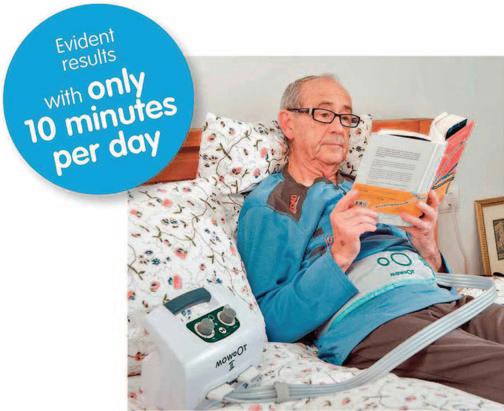
Clinically proven, safe and effective, relaxing and side-effects free, MOWOOT II Abdominal Massage Therapy System combats constipation and provides soothing relief to affected people. Easy to use and comfortable, the MOWOOT II treats and manages constipation in people with spinal cord injuries, multiple sclerosis sufferers, Parkinson’s Disease patients and people with constipation related to prescription medication. MOWOOT II also helps to relieve idiopathic constipation experienced by menopausal and post-
menopausal women and older and elderly people. In clinical studies MOWOOT II increased evacuation frequency, softened stools, improved regularity, reduced gasses, relieved bloating and eased off abdominal discomfort. 10 to 20 minutes daily of relaxing abdominal massage with MOWOOT II rapidly reduces symptoms of constipation.
Evident results are experienced only a few days after the first treatment. Regular abdominal massage with MOOWOOT II ensures lasting health benefits and better quality of life.
MOWOOT II – effective solution to chronic constipation for better quality of life!
Supplied by Win Health Medical Ltd - 01835 864866 - www.win-health.com See page 3 of this issue for other Win Health products. MOWOOT II for Constipation Free Life
REM have been manufacturing furniture for the Hair & Beauty Sector for over 100 years and are now considered to be one of the largest manufacturers in both the UK & Europe. Our exclusive designs and meticulous British workmanship offer customers a wide range of furniture for every conceivable Salon environment. Understanding the growing requirement for Care & Residential Home Salons the REM Design Team have produced the Pendle Care range for the small, compact Care Home Salon. This new range includes ergonomically designed, height adjustable styling chairs and
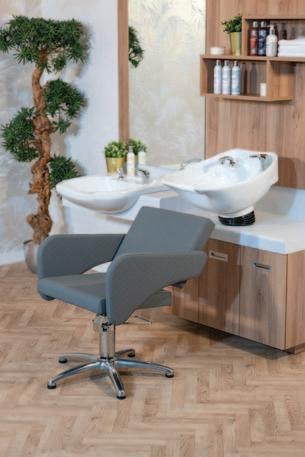
the Pendle Easy Wash Unit with two ceramic basins allowing frontwash with wheelchair access and a tilting backwash basin for the more able clientele. Should the need arise, our experienced Design Team can help you create a stimulating Salon environment for your clients. The REM Salon Interior Design Package which includes 2D and 3D AutoCad plans and visuals can be ordered for only £295 +VAT and is fully refundable on an order placement of £3000 or more. Contact us on 01282 619977 or email sales@rem.co.uk See the advert on page 17 for details.
The Oxford Up is an active manual stand aid, supporting assisted standing, seated transfers, and patient rehabilitation. Suitable for clients who require some assistance when standing but are able to participate and contribute effort to the process, the Up can also be deployed as a useful rehabilitation aid.
With a safe working load rating of 200kg (31st), the Up quickly disassembles into three separate components, significantly easing storage requirements and onward transportation. Reassembly takes a matter of seconds, and its ready for use again.
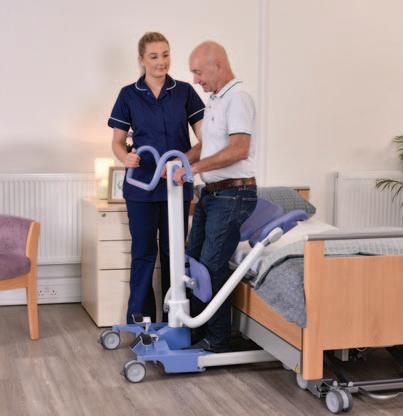
A large multi-point push handle aids manoeuvrability for the caregiver, and the foot push pad pro-
vides a means of generating forward momentum when moving a patient. Optimum positioning of the swing-away seat pads and knee support help ensure comfort for the patient. Adjustable leg opening allows closer access around furniture, promoting improved patient positioning and general ease of use. Additionally, the enclosed footplate ensures no accidental foot or toe entrapment associated with mechanical components.
Where additional seated support is required, the Oxford Deluxe Standing sling (With Clips) is fully compatible with the Up and available in three standard sizes: small, medium, and large. For more information including how and where to purchase, please contact the Oxford customer services team on 0344 811 1158 send an email to info@joerns.co.uk or visit our website at www.joerns.co.uk
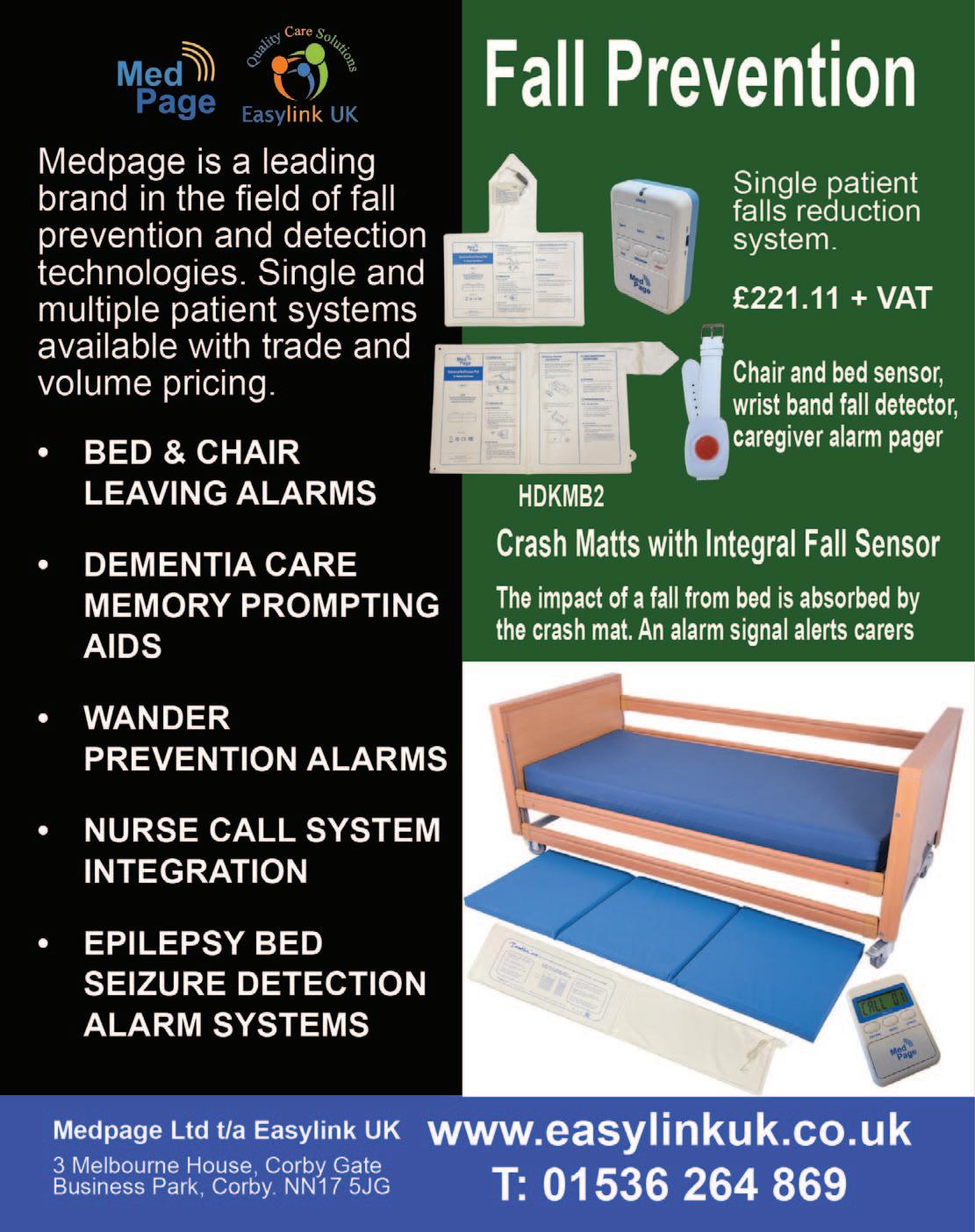



In the post pandemic world, we have all seen the effects of supply chain problems with the invasion of Ukraine and other alarming global factors, ever increasing costs of living and other more local issues which have driven up the rate of inflation over the last few years. The impact of this meant that most manufacturers of electronic products had to increase their prices as costs spiralled. This, of course, has impacted the end user. The most dramatic impact has been on the Care Industry. An industry that has lacked the support it desperately needs in these trying times.
Courtney Thorne, at the same time, took a strategic decision to take a close look at our core products, right down to component level, the objective being to make us less vulnerable to future global supply chain issues, and to reduce the cost of each product with the amin of ensuring that we deliver the same high quality product at a cost protected price. We had to ensure that this would happen without jeopardising the superb lev-

els of support we provide to our valued customer base.
This ground up review involved all departments from Research and Development right through to the Field Service team (and everything in-between). This in-depth collaboration took time as we had to ensure that each and every element was refined, perfected and tested to our (and our customers) rigorous requirements.
Whilst many organisations have limited-time or end of product line offers, we are very pleased to announce a price reduction on our core Connect and Connect Health Nurse Call system ranges. With flexible terms, full integration with Care Apps, celebrated service delivery and the most reliable and robust solution now at a new lower price, there has never been a better time to talk to us about a new nurse call system.
For more information email us at: info@c-t.co.uk or see the advert on this page.
Blaucomm’s Nurse Call Messaging Service (NMS) is the market leading solution to remove the dependency on noisy nurse call panels and pagers, through its intelligent software, which delivers the alerts straight to the care staff who need them.
Care homes are rapidly introducing smartphones for digital care planning and eMarnow, the same devices can be used to receive the nurse call alerts they need for the residents under their care.
Furthermore, Blaucomm NMS is deeply linked into Person Centred Software MCM, so call bell data is linked straight to care plans. This unlocks a huge benefit to care homes to enhance the staff performance with how they accept and respond to residents, which ultimately promotes better response times and visibility for management to audit their performance.

The best part is that Blaucomm NMS links into your existing nurse call system - we work with all major
brands such as Aidcall, ARM, Courtney Thorne, C-TEC, ENS, Intercall, Medicare, SAS and TeleAlarm.
Care operators are constantly recognising Blaucomm NMS for its reliability and dependability to their care operations, which is why we’ve been chosen time and time again over other solutions.
Head of IT Trudi Harrow at WCS Care had this to say about Blaucomm NMS:
“We find Blaucomm is a genuinely fantastic company with a reliable product. "We would highly recommend this to anybody who wants to replace expensive pagers and silence those annoyingly loud nurse call screens!”
To find out more about Blaucomm NMS, visit
www.blaucomm.co.uk/healthcare
See the advert page 5 for more details.
Medpage Limited has collaborated with a leading UK manufacturer of crash mats to deliver a cost-effective tool for falls management strategies. The inclusion of the new TumbleCare full-length pressure mat sensor ensures that should a patient tumble out of bed, an alarm signal is generated to alert care staff to the incident, resulting in a recordable improvement to patient safety and service.
Crash mats act as a protective barrier, absorbing the impact of a fall and reducing the risk of serious injuries when a person tumbles out of bed. Beneficial for individuals who are at high risk of falling, such as older adults, patients recovering from surgery, or those with neurological conditions such as epilepsy.

Falls can pose significant risks, especially in healthcare settings and senior care facilities. Every year, thousands of people suffer injuries due to falls from beds and other furniture. To prevent these accidents and ensure the safety of patients and residents, it is essential to implement effective falls and safety management strategies.
Further details can be obtained by telephoning 01536 264 869 or emailing sales@easylinkuk.co.uk
See the advert on page 2 for details.
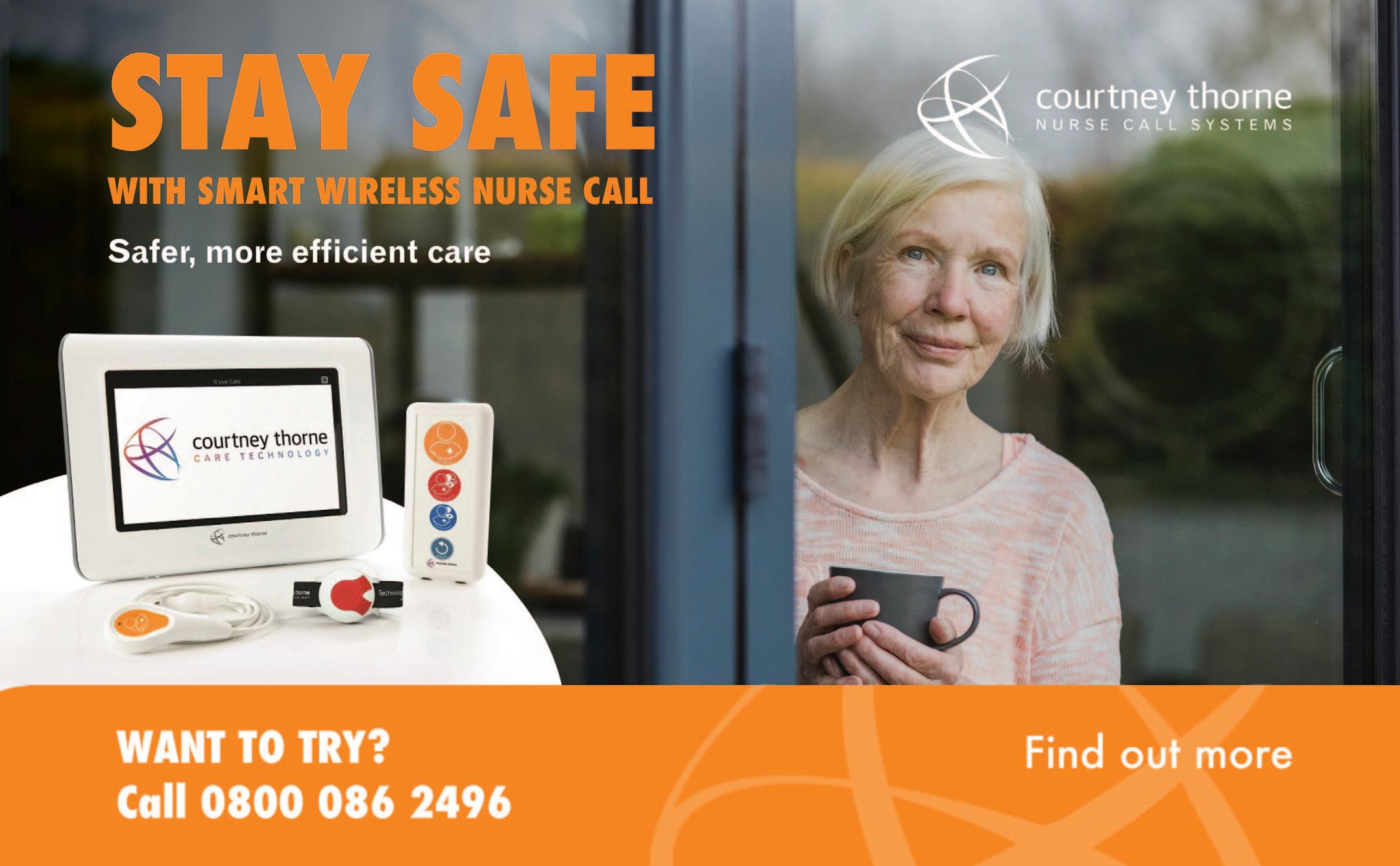
Cyber security is an increasing concern in social care, with data breaches, phishing scams, and cyber attacks putting sensitive information and essential services at risk. However, learning about cyber security can often feel overwhelming, full of jargon, and difficult to apply to everyday situations. That’s where the Digital Care Hub’s new Cyber Game comes in—an engaging, interactive way for adult social care providers to learn vital cyber security skills.
Learning doesn’t have to be dull. In social care, where training is essential but time is scarce, gamification—using game-like elements such as quizzes, rewards, and interactive challenges—makes learning more engaging and memorable. It provides a safe space to learn and make mistakes, increasing engagement, motivation, and knowledge retention. Gamification also allows for instant feedback and supports long-term behaviour change, making it an effective tool for cyber security training.
THE FIRST-EVER CYBER GAME FOR SOCIAL CARE
The Digital Care Hub has launched the first-ever Cyber Game designed specifically for adult social care providers. It offers a fun and practical way to learn about cyber security and data protection, helping care managers, care workers, and other staff members develop the skills they need to keep their organisation safe.
The Cyber Game takes players through real-world scenarios relevant

to social care settings, making it easier to recognise and respond to cyber risks in a safe environment. Whether it’s identifying a phishing email, ensuring secure data sharing, or responding to a cyber incident, players gain hands-on experience that translates directly to their work environment.
One of the biggest challenges in cyber security training is making it relatable. The Cyber Game brings cyber risks to life through realistic characters and workplace situations. Players can take on the role of a registered manager, a data protection lead, or a care worker, each facing different cyber threats.
Each scenario is based on real cyber incidents that have affected
social care providers. The goal is to manage the crisis effectively—containing the damage, notifying the right people, and implementing steps to prevent future incidents. Decisions impact security, time, and cost, requiring players to balance risk and consequences.
WHY GAMIFY CYBER SECURITY TRAINING?
Daniel O’Shaughnessy, from the Digital Care Hub, explains:
“We created the Cyber Game to make cyber security training more accessible and engaging. Gamification encourages active participation and helps staff retain information better, making learning feel rewarding and practical.”
WHAT CARE STAFF SAY
Care staff who tested the game found the scenarios helpful and realistic:
“These are good scenarios – typical and indicative of what may occur and give people an idea of what they need to be thinking about.”
Through interactive decision-making, players experience the consequences of their choices, reinforcing key lessons in a way that traditional training cannot.
TRY THE CYBER GAME TODAY!
The Cyber Game is available online, completely free to play. It’s a great way for care providers to improve their cyber security awareness in an engaging and practical way.
Play the game online at: www.digitalcarehub.co.uk/cyber-game
The delivery of safe care is the paramount responsibility of social care providers. Central to achieving this is the governance framework adopted by service providers. And at the core of this framework are policies and procedures. These enable the provider to comply – and evidence compliance –with relevant legislation and regulations, as well as facilitating best practices, supporting business needs, and assisting in recognising and managing risks.
Providers have a legal duty of care to the people they employ. Policies and procedures should provide clear guidelines to staff on how the organisation operates, as well as informing them of best practices and processes to be followed.

Policies should be reviewed annually as a minimum to ensure they are still fit for purpose and align with legal and regulatory requirements. They should be reviewed not only by
employees of the business, but also by experts in various subject matters (e.g., infection control or medicines management).
For many small- to medium-sized providers, there may not be the in-house skills, knowledge, and experience to complete such a robust annual review. Many choose instead to purchase their policies and procedures from a reputable provider like W&P Compliance & Training, who will also complete reviews and ensure their policies and procedures remain up to date. This way a provider not only ensures they remain compliant; they also benefit from best practice policies and procedures that provide a solid foundation for safe working practices and – ultimately – protect and support service users and staff. Ben Erskine – Director at W&P Compliance & Training www.wandptraining.co.uk | Tel: 01305 767104 See the advert on page 2 for further information.

Training care home staff is vital for delivering high-quality care, especially when managing complex resident needs such as dementia, frailty, and mental health challenges. However, traditional methods often fall short in engaging staff, leaving critical gaps in understanding and preparedness. Innovative approaches, such as game-based learning and peer-to-peer collaboration, are revolutionising training, particularly in addressing the ethical and legal challenges of restrictive practices.
Restrictive practices—measures that limit an individual’s freedom—are sometimes necessary to ensure safety. However, they must be applied with great care, adhering to legal frameworks and ethical guidelines to protect residents’ dignity. A groundbreaking digital training resource, co-designed by Queen’s University Belfast and Focus Games, exemplifies this innovation. The resource uses interactive, expert-driven content to help staff navigate restrictive practices responsibly and effectively.
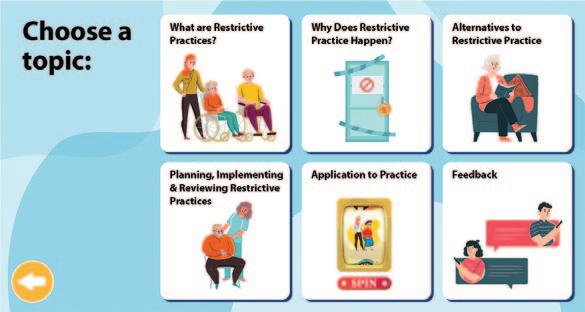
Game-based learning plays a central role, transforming topics like restrictive practices into engaging,
real-world scenarios. Simulations allow staff to explore ethical dilemmas, practice decision-making, and test alternative solutions in a safe, low-pressure environment. This approach enhances critical thinking, teamwork, and retention of essential knowledge.
Peer-to-peer learning further strengthens the training by encouraging staff to share experiences and insights, fostering collaboration and practical problem-solving. This creates a dynamic learning environment where staff feel supported and empowered to deliver compassionate care.
By integrating these modern approaches, care homes can elevate training into a meaningful experience, equipping staff to balance safety with residents’ autonomy and dignity. At Focus Games, we are proud to offer tools designed to empower care home teams through innovative training. Visit www.FocusGames.com or email info@focusgames.com to learn more about our Restrictive Practice resource and how it can enhance care home outcomes for residents and staff alike. For further information see the advert on the front of this issue
By Chris Sparling, Senior Director,

In the care industry, reputation is everything. Choosing a care facility or in-home provider is a deeply personal decision based on location, budget and individual needs. It’s also based on trust. Families rely on providers to deliver quality care, so a strong reputation is essential. In the UK, adult care homes are rated by official bodies like the Care Quality Commission (CQC) and by residents and their families. However, as the CQC undergoes reform, personal feedback and reviews have become critical in offering an unfiltered view of the resident experience.
Selecting a care facility or in-home provider is a deeply personal decision based on trust, location, budget, and individual needs. Families rely on providers to deliver quality care, so a strong reputation is essential.
EMERGING TRENDS IN THE CARE INDUSTRY
The growing reliance on authentic reviews offers facilities an opportunity to set themselves apart and offer the insights prospective patients seek. Yet, a recent research report reveals that in-home care providers average just nine reviews annually, with the top 20% receiving fourteen reviews. This indicates a gap in review engagement that providers can turn into an opportunity.
The difference between a trusted care facility and a questionable
one often comes down to how effectively a provider manages its reputation. Managing various listings and online reviews can weigh heavy on a facility with stretched resources.
ENCOURAGING AUTHENTIC REVIEWS
The true measure of reputation comes from the experiences shared by current and former residents and their families. Proactively soliciting feedback is powerful - 22% of the public report they leave reviews when asked. A steady flow of fresh feedback prevents outdated sentiment from impacting perception. In a market with such high demand for care home places, this could have serious consequences.
Reviews need to be managed and cultivated as part of continuous improvement within customer service, as they’re one of the primary indicators of quality.
BUILDING TRUST WITHIN THE COMMUNITY
It is important that reviews are managed transparently, so providers can build trust with their current and future patients. The same report found that top-performing care providers respond to over 80% of reviews, while the industry average lags at 68%. However, these numbers drop significantly for negative reviews, which is a missed opportunity.
Acknowledging both positive and negative feedback is crucial for building credibility. Doing this will reassure prospects that a facility is open to listening and proactively addressing concerns. Filtering reviews to exclude the negative ones presents an unrealistic image and will deter prospects evaluating whether a facility is the right one for them.
PROMOTING RESIDENT AND FAMILY SATISFACTION
Responding to online feedback is an extension of customer service quality, and many prospective patients seek this level of engagement. By providing thoughtful and timely responses, care providers can
at
increase customer satisfaction and strengthen their overall reputation.
Facilities that listen to residents and their families, and take proactive steps see improved satisfaction and stronger relationships with those they serve. Addressing negative reviews can even turn challenges into positive outcomes.
Industry leading providers are already leveraging technology to maximise the impact of online reviews. Many automate review responses, ensuring that every reviewer feels respected and appreciated. This approach also eases the pressure on internal resources by streamlining the feedback response process.
Moreover, facilities can use data from reviews to identify strengths and weaknesses, addressing areas of concern proactively. For those with smaller budgets, data-backed insights help allocate funds effectively, so that the focus remains on what matters most to residents and families. Whether that’s staff excellence or a provider’s welcoming environment, marketers should highlight these strengths in their promotional materials, and use customer feedback as a way to validate them.
Care providers should embody their commitment to people-centred service in their online interactions, regardless of whether feedback is positive or negative. Reputation management is a crucial part of this commitment, as it ensures that patients feel valued and heard, while offering sought-after insights to those trying to make big decisions.
With the right tools and strategies in place, care providers can harness the power of online reviews to build trust, improve satisfaction, and build a lasting reputation that resonates with both current and future residents.

In an age where data breaches and cyberattacks are increasingly common, cybersecurity is a critical priority for all organisations, including nonprofits and charities. Protecting sensitive data—such as donor records and beneficiary details—is a round-the-clock responsibility that demands both organisation and vigilance. This is where Security Operations Centre (SOC) systems come into play, offering a powerful way to strengthen your defences, even on a tight budget. WHAT IS A SOC SYSTEM?
A Security Operations Centre (SOC) is a centralised framework—often a combination of software, tools, and processes—designed to monitor, protect, and manage an organisation’s information systems and networks against cyber threats. Whether through in-house teams or external ser-
vices, a SOC uses advanced technologies to detect, analyse, respond to, and prevent cybersecurity incidents in real-time. Why Are SOC Systems Important?
The consequences of a successful cyberattack can be catastrophic, from financial losses to reputational damage, and the risks are growing each year. Cybersecurity is no longer a one-off task but a complex, ongoing effort requiring expertise, proactive monitoring, and rapid response capabilities. For nonprofits and charities, where budgets are often stretched thin, a SOC system offers an efficient solution. It provides 24/7 network monitoring, identifies vulnerabilities before they’re exploited, and helps mitigate threats swiftly, reducing the likelihood of a breach.
BENEFITS OF SOC SYSTEMS FOR NONPROFITS AND CHARITIES
1. Proactive Threat Detection and Response: Equipped with sophisticated tools, SOCs can spot potential risks early and respond immediately, minimising damage.
2. Compliance Support: By monitoring data protection practices, SOC systems help charities meet standards like GDPR or CQC requirements, avoiding costly penalties.
3. Unified Security Management: Many SOC solutions integrate with popular antivirus and network security tools, letting you oversee everything from a single platform.
4. Scalable for All Sizes: Whether your organisation is large or small, SOC systems can adapt to your needs.
SES SOC FREE SYSTEM OFFER
SES Computers, with over 20 years of success in the healthcare sector, believes it’s time to give back. We’re excited to announce a unique opportunity for UK charities and nonprofits: free access to our Security Operations Centre (SOC) services.
No
By Philip Douglas, founder and CEO of Compleat Software

As the CEO of Compleat Software, I have worked closely with care providers and understand the challenges they face, as well as the growing demand for AIdriven solutions reshaping the sector. With rising costs, workforce shortages, and increasing demand for quality care, AI has moved beyond being a trend; it is now essential for sustainability and efficiency.
Recognising this urgency, the UK government has launched initiatives to accelerate AI adoption in healthcare and care homes. The recently announced AI Opportunities Action Plan aims to integrate AI across public services, including the NHS, modernising patient care and streamlining operations. Investments in AI-driven diagnostics, workforce planning, and predictive analytics are already helping to improve health outcomes while reducing pressure on frontline staff.
However, care providers also face financial pressures due to policy changes, such as the National Insurance rise, which significantly impacts workforce costs and operational budgets. The increased employer contributions make it more expensive to recruit and retain staff, worsening an already strained sector. While AI can help mitigate some of these cost pressures through automation and efficiency gains, the sector needs more strategic financial support from the government to ensure AI adoption remains viable.
The recent National Insurance rise has placed additional financial strain on the care sector, which is already grappling with underfunding and workforce shortages. Care providers must now contribute more to employer National Insurance payments, increasing staffing costs at a time when recruitment and retention are critical challenges. This policy change directly affects operational budgets, forcing care homes and domiciliary care services to reallocate resources from patient care to cover additional tax burdens.
AI-driven automation offers a potential solution by reducing administrative workloads and optimising workforce planning. AI-powered HR management tools can help forecast staffing needs and prevent over-reliance on expensive agency workers. Similarly, AI-driven procurement and financial management systems can identify cost-saving opportunities, making it easier for care providers to navigate these financial pressures while maintaining service quality.
Care organisations have long struggled with manual processes that consume valuable time and resources. Whether managing procurement, staffing, or patient care, outdated systems often lead to inefficiencies and high costs. AI is now enabling care professionals to focus on what matters
most, delivering high-quality care. By automating routine tasks, AI improves efficiency, allowing staff to dedicate more time to patient wellbeing rather than administrative burdens.
NHS England Abolition – What This Means for Healthcare Procurement
Keir Starmer’s proposed abolition of NHS England signals a major shift in the structure of healthcare delivery and procurement. While details remain under discussion, the potential restructuring could have significant implications for how care providers source medical supplies, manage contracts, and integrate AI-driven solutions into their operations. A decentralised approach to procurement could offer more flexibility but may also lead to inconsistencies in funding and support for AI adoption across different regions.
For care providers, this change underscores the importance of AI-driven procurement systems that can quickly adapt to evolving regulations and supply chain challenges. AI-powered platforms can streamline vendor management, track spending trends, and ensure compliance with new procurement policies, helping care organisations navigate this transition more effectively.
AI FOR WORKFORCE PLANNING AND HR MANAGEMENT
Staff shortages and high turnover rates have long been challenges in healthcare. AI-powered predictive analytics are now assisting HR teams in anticipating workforce needs, reducing staff turnover, and improving job satisfaction. AI-driven tools also streamline shift planning, ensuring optimal staffing levels and reducing the strain on care professionals. Virtual assistants are further relieving administrative burdens by handling routine HR inquiries, allowing staff to focus on more meaningful work.
ENHANCING PATIENT CARE THROUGH AI
Beyond finance, AI is transforming patient care. Electronic health records (EHRs) powered by AI can detect health risks early and recommend proactive interventions. By analysing patient data in real time, healthcare professionals can make faster, more informed decisions, reducing hospital readmissions and improving patient outcomes. AI-driven care management tools allow care facilities to maintain high service levels while optimising costs.
AI-POWERED VIRTUAL ASSISTANTS AND PATIENT ENGAGEMENT
AI-powered virtual assistants are also improving patient engagement. These tools help with medication reminders, appointment scheduling, and answering health-related queries, providing round-the-clock support. By handling these routine interactions, AI reduces the strain on caregivers, enabling them to focus on more complex patient needs. The result is a
more efficient system where patients receive timely assistance while care professionals are freed from repetitive administrative tasks.
PREDICTIVE ANALYTICS IN PREVENTATIVE CARE
One of the most exciting AI applications in healthcare is predictive analytics for preventative care. AI can analyse vast amounts of patient data to identify individuals at risk of developing serious health conditions. Early intervention helps reduce hospitalisation rates and improves long-term health outcomes. Some care facilities have already prevented emergency hospital visits by detecting subtle behavioural changes that might otherwise go unnoticed. This proactive approach not only saves lives but also alleviates financial pressure on healthcare providers.
AI FOR INDEPENDENT LIVING AND REMOTE MONITORING
The UK government is also investing in AI-driven technology to support independent living. AI-powered sensors can monitor daily activities in care homes, identifying unusual patterns and alerting caregivers when needed. This technology helps vulnerable individuals live independently for longer while reducing the burden on residential care services.
AI has also revolutionised remote monitoring and telemedicine. Wearable health devices now use AI to track patient vitals in real time, allowing healthcare professionals to identify potential health concerns before they escalate. This proactive approach is particularly valuable for elderly patients and those with chronic conditions, reducing hospital visits and improving overall patient wellbeing.
The future of AI in healthcare is vast, with continuous advancements reshaping the sector. From robotic caregivers assisting with daily tasks to AI-driven mental health support systems, innovation is driving a smarter, more efficient, and compassionate care model. Organisations that embrace AI today will be at the forefront of this transformation, positioning themselves as leaders in the evolving care landscape.
For care providers considering AI adoption, now is the time to act. AI’s ability to optimise processes and elevate care quality is already evident, and as technology advances, it will become an integral part of delivering high-quality care in an increasingly demanding world.
By leveraging AI, we are not just reducing costs; we are enabling a future where care professionals can focus on what truly matters: improving the lives of those they serve. The care sector is evolving rapidly, and AI is at the heart of this transformation. Those who embrace it now will shape the future of healthcare for generations to come.


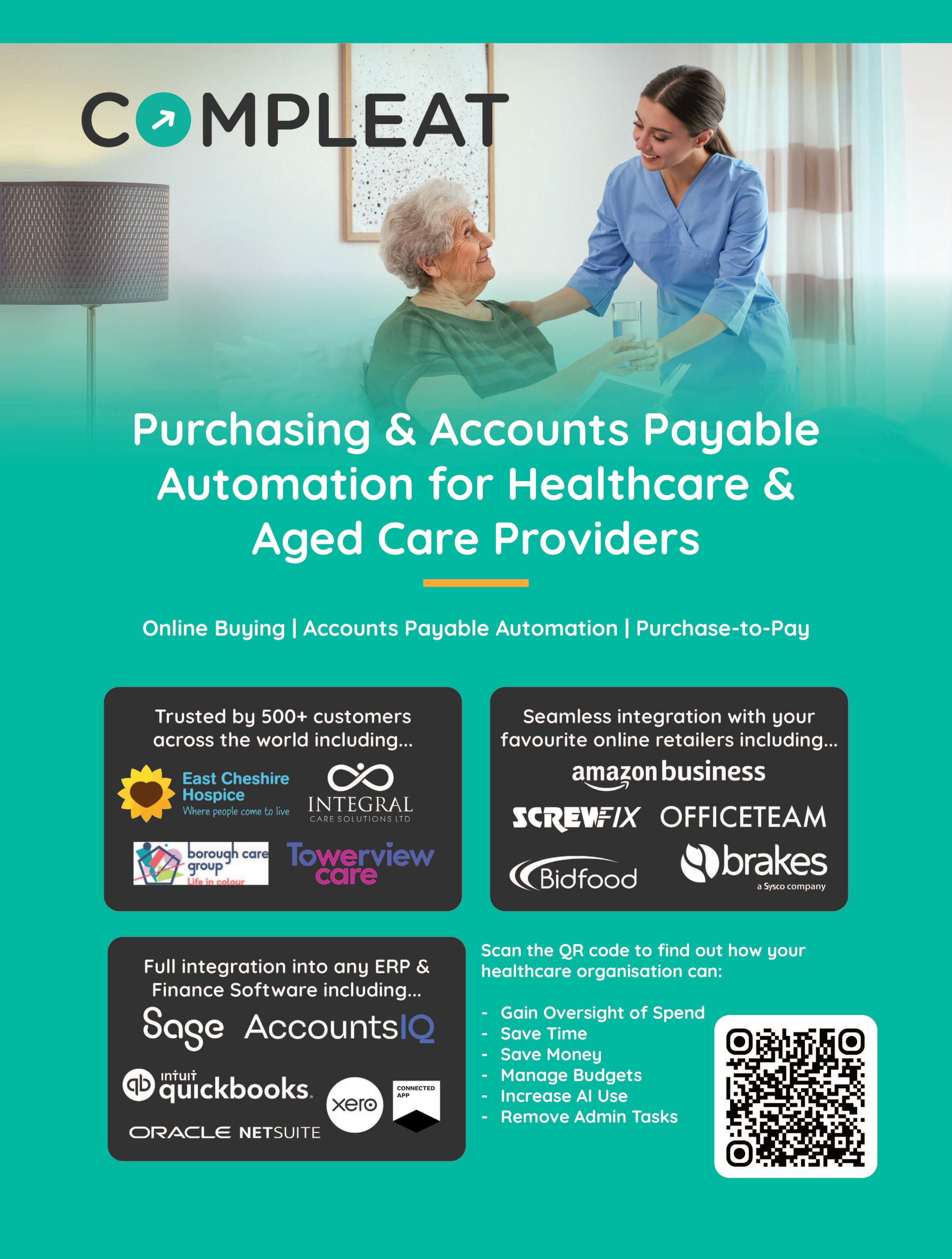
The social care sector is evolving at an unprecedented pace, driven by increasing demand, tightened budgets, and the need to deliver exceptional care outcomes. At the heart of this shift lies digital transformation—a holistic approach to overhauling care operations, processes, and culture through the integration of modern technologies.
Far from simply replacing manual tasks, digital transformation reimagines how organisations operate. Tools like Digital Social Care Records (DSCRs) represent just the beginning. By adopting interoperable systems and cloud-based solutions, care providers can achieve seamless coordination across departments, optimise resource allocation, and ensure high-quality care. Processes such as care planning, rostering, compliance reporting, and data management become more efficient, freeing up teams to focus on providing person-centred care.
Digital solutions also offer significant benefits. Faster service delivery reduced administrative burdens, and more informed decision-making results in better care experiences for service users and care providers alike. For instance, interoperability enables real-time data sharing across platforms, reducing errors while providing a unified view of the organisation’s operations. This empowers leadership to make critical decisions backed by accurate, holistic insights. Additionally, tools like single sign-on (SSO) and multi-factor authentication bolster security, ensuring confidential data remains protected while reducing day-to-day inefficiencies for users.
PASS supports over 1,000 care providers every day, giving them access to market leading care management tools hand in hand with unlimited 24/7/365 support from our dedicated and friendly PASS team.

Assured by NHS Transformation Directorate, PASS provides a secure platform that allows you to plan, record and evidence the care you deliver. The only assured solution built specifically for the home care sector, it provides comprehensive real-time functionality and allows you to share progress against outcomes with customisable, exportable reports.
CARE PLANNING AND ROSTERING FROM A SINGLE PLATFORM

For social care providers, the move toward digitalisation represents an investment in long-term sustainability. Enhanced efficiency helps reduce operational costs, allowing resources to be reinvested in vital areas such as workforce development or service user engagement. Standardised digital frameworks also simplify the complexities of acquiring new services or locations, ensuring continuity of care during periods of growth. Choosing a digital partner who understands the complexities of care is essential to navigating this transformation successfully and tailoring solutions to the unique needs of the sector.
However, the path to digital transformation requires a clear roadmap. Providers must assess their needs, define a vision, and secure stakeholder buy-in. Selecting the right software and delivering effective training is equally critical to ensuring a smooth transition. Continuous monitoring and adjustment allow providers to refine their approach, fostering a culture of improvement and resilience.
By adopting integrated intuitive software solutions, social care providers can not only stay ahead of industry challenges but also lead the way in delivering exceptional, sustainable services. Digital transformation may not solve every challenge, but its potential to enhance care quality, operational efficiency, and financial health is undeniable.
Download our guide to digital transformation with the QR code.
To meet the wider needs of the PASS community All-in-one PASS has recently been launched , bringing advanced rostering functionality to our established digital care planning platform. As a result advanced staff scheduling, payroll and invoicing functionality is now seamlessly linked with care planning and reporting, reducing the technical complexity, risk and overhead associated with integrating two separate systems.
As a result, PASS now provides an all-in-one suite of digital care management tools, available from a single platform, designed to:
Save you time
Increase the efficiency of your teams
• Improve the quality of care
Deliver better outcomes

Our commitment to the continual evolution of PASS is further illustrated by the addition of GP Connect. The first product of its type to offer this feature, PASS is still one of only a handful of digital care
management solutions to have completed this NHS Digital integration, and is the only one offering it to the home care market.
PASS GP Connect provides authorised social care staff with realtime access to their client’s GP records. It makes medical information available when and where it is needed, leading to improvements in both care safety and outcomes:
Visibility of allergies, vaccinations and medications, especially useful for clients unable to reliably share their personal information
Using medical information to inform care planning
Ensuring that the right medication is delivered to the right person in the timeliest manner. In one case, this allowed the administration of antibiotics on a Friday evening, aiding the service user’s swift recovery from infection
Available to all PASS users at no additional cost, PASS GP Connect is significantly more efficient than waiting for a GP response. It’s also a positive step forward on the path to the DHSC’s goal for widespread digitally enabled care and is in full alignment with their ambition for joined up care for everyone.
Get in touch: www.everylifetechnologies.com hello@everylifetechnologies.com




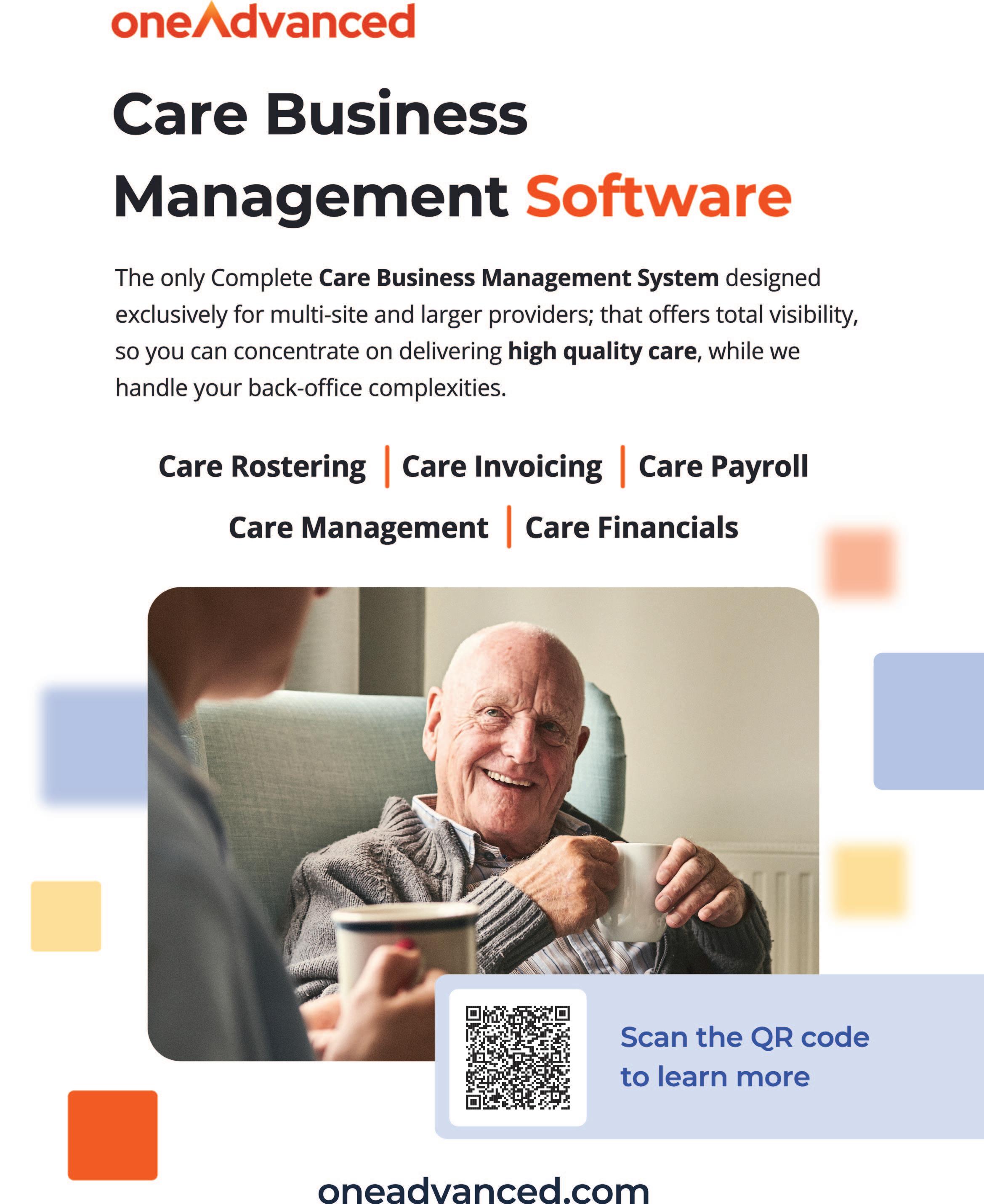
By Fozia Iqbal, Senior Business Immigration Solicitor at

Reports of exploitation, including unfair wages and poor working conditions, have drawn increased government attention to the treatment of overseas workers in the care sector. With a critical staff shortage, many businesses depend on international recruitment to fill vacancies, adding to concerns about worker welfare.
The Home Office has intensified its crackdown on non-compliant employers, with severe consequences for those who fail to meet legal and ethical obligations. Compliance with immigration and employment laws is no longer just an administrative requirement but an essential strategy for protecting business operations, reputations, and, most importantly, the wellbeing of workers.
To hire overseas care workers legally, care business owners must navigate a complex regulatory framework. They must obtain a sponsor licence issued by the Home Office, through which they can sponsor overseas health and care workers for a Skilled Worker visa, which is the primary route for recruitment, but this visa comes with strict sponsorship obligations. Employers must make sure that all hired workers have valid visas and are working in compliance with their visa restrictions and their sponsorship. Employers would need to implement correct right to work check policies and ensure they are meeting minimum salary requirements, can provide work that meets the contractual hours of work offered, and the employees are undertaking duties which fall strictly within the role for which they have been sponsored.
Additionally, all employers must ensure that their employees’ employment conditions align with legal requirements, for instance, providing safe working environments, adequate training, and following proper recruitment procedures. Fundamentally, overseas workers must receive their full rights and entitlements such as fair pay, breaks and leave, with no discrimination. Any deviation from these standards can place a business at significant risk.
THE GOVERNMENT’S CRACKDOWN ON NON-COMPLIANCE
The UK government is taking decisive action against care providers who fail to protect overseas staff. Increased inspections and audits are being carried out, with penalties ranging from significant fines to licence revocations and outright business closures. Employers found guilty of exploitation or modern slavery
offences face criminal prosecution, and businesses that lose their sponsor licences will lose their sponsored workers and be unable to hire overseas staff in the future.
In addition to heightened inspections, the Home Office is working closely with other regulatory bodies to share intelligence and data on non-compliant practices. This collaboration enhances the government’s ability to detect irregularities and enforce penalties swiftly, ensuring that any rogue employer faces immediate consequences. Such coordinated efforts not only deter potential offenders but also reassure compliant businesses that the sector is being rigorously monitored.
This increased enforcement underscores the necessity for care home owners to maintain high standards of employment practice. Failing to comply with legal obligations does not only jeopardise individual businesses but also tarnishes the reputation of the sector as a whole.
ETHICAL EMPLOYMENT:
Beyond legal obligations, treating overseas workers ethically is a crucial element of running a successful business. Providing fair pay, ensuring reasonable working hours, and fostering a safe and supportive environment contribute to higher job satisfaction and better staff retention. In an industry where continuity of care is essential, a stable and motivated workforce is invaluable.
Ethical employment also enhances a business’s reputation. Care businesses known for fair treatment of staff find it easier to attract both workers and clients. By proactively adopting fair employment practices, organisations safeguard their operations from legal risks and cultivate a more committed and engaged workforce.
To protect your business and your staff, you should regularly review your employment practices. By conducting internal audits, training staff on compliance obligations, and seeking professional legal guidance, you can help ensure ongoing adherence to the law. Being proactive in compliance not only mitigates legal and financial risks but also encourages a positive workplace culture.
Looking to the future, it is vital for care providers to establish a culture of continuous improvement in compliance. Regular training sessions, clear communication of legal updates, and robust internal controls can help your business stay ahead of regulatory changes. Embracing technology to monitor recruitment and employment processes further supports transparency and accountability, ultimately benefiting both your staff and the reputation of your business.
As the government continues its strict stance on non-compliance, you should take immediate action to ensure your recruitment and employment processes align with legal and ethical standards. Now is the time to assess your business’s current practices, implement necessary improvements, and secure the future of your business by treating overseas workers with the fairness and dignity they deserve.
By Katarina Morgan, Associate Solicitor
at Taylor Walton Solicitors (www.taylorwalton.co.uk)

An issue which frequently arises for care home operators is when they need to make a financial claim against the estate of a deceased resident for unpaid or outstanding fees. This can be complicated if the former resident was married but most of their assets are tied up in the marital home which their spouse still lives in. Another common situation is where there are insufficient funds left in the estate and the former resident would have qualified for Local Authority funding had they survived.
To manage these situations effectively, it is best practice to maintain good records of the contractual terms agreed, of fees due and invoices raised and what is outstanding. This helps prevent parties disputing the quantity of the bills, or where executors were unaware of what had been agreed.
It is hoped the care home operator has a good rapport with the deceased’s family so they can sensitively approach them with the outstanding invoices and ask them to be included as debts of the Estate. This helps probate practitioners and will assist with debt recovery when the Grant of probate has been obtained. Thankfully in recent months it is now a faster process following the delays which built up following the Covid pandemic. If the deceased owned a property (either under marriage or not), then there may be a right to pursue the debt against their asset. It would need to be considered if they died with a Will, whether a life interest trust was created under that Will (i.e. if people are still living in the house), and how the property was
owned and how much of it was owned by the deceased, whether there is any outstanding mortgage or equity release scheme in place. It is for this reason why good contractual terms need to be set out clearly and what happens in these circumstances.
If there are insufficient funds in the Estate, then the Estate will be insolvent. This means that the debts will be paid in a certain order:
o Secured creditors: mortgages or secured loans
o Funeral expenses: reasonable and proportionate to the size of the Estate
o Testamentary expenses: administrative costs
o Preferred and preferential debts: employee wages for example (not likely to apply)
o Unsecured creditors: care home fees, bank loans, other debts
o Interest on unsecured loans
o Deferred debts: informal loans between family members
If Local Authority funding may have been available, then the administrator of the deceased’s Estate (executor or administrator) may be able to make a retrospective claim. They will have to apply to the Integrated Care Board (ICB) which is the NHS body that assesses eligibility for NHS Continuing Healthcare funding where there is a need. That person will need to contact the ICB for guidance on how to deal with previously unassessed periods of care. It is likely that this may take a number of weeks if not months to be resolved and it would likely to be challenged given the universal squeeze on public budgets. Prevention of debts building up is always the best option, but it is not always avoidable. Ultimately having good, clear contractual terms which explain what has been agreed in terms of fees and when they can expect to be recovered and how is essential for every care home operator. Each case will of course depend on its
On-Demand Pay is now offered by almost a third of care providers in the UK. But why?
For many employees, payday isn’t just about receiving their earnings –it’s about catching up. Covering overdue bills, managing unexpected expenses, and paying off debts such as credit cards. With nearly 1 in 4 workers unable to pay an unexpected bill of just £100, financial stress is a growing challenge directly impacting businesses and their employees alike.
On-Demand Pay, also known as Earned Wage Access, allows staff to access some of their earned wages before payday. All without impacting their employer’s cashflow or payroll processes.

In addition to supporting staff, there are many tangible business benefits for care providers who opt to introduce this fast-growing employee benefit. Notably, by rewarding overtime more quickly you incentivise uptake; significantly lowering agency spending as in-house staff are motivated to cover more of the shift rota themselves.
HELPING EMPLOYERS HELP THEIR EMPLOYEES
Level are On-Demand Pay specialists for the care sector, working with the likes of Agincare, Home
Instead, Bluebird, Hollybank Trust and Bracebridge Care Group, to name a few. We understand the unique
challenges of the sector – from managing high staff turnover, to the nuances of franchising and dealing with agencies.
“We are really loving Level so far and our staff have nothing but praise for it. It’s also helping to cover our rotas as staff now have instant access to any overtime they may do rather than having to wait” – Bluebird Care. On-Demand Pay helps employees manage their finances without resorting to costly overdrafts, credit cards, or payday loans. For example, one of Agincare’s carers said that:
“Things have been a struggle as I'm a single parent. When I had a car issue it became very useful to be able to access my pay early.” SEAMLESS INTEGRATION WITH PAYROLL & WORKFORCE
Level’s On-Demand Pay is a market-leading solution. With existing integrations with many of the UK’s leading HR, rota and payroll systems, Level can offer a fully automated solution. Integrations with software like Sona, IRIS, Birdie, SAP, Humanforce and Planday make the setup and go-live process quick, simple and easy. This means you can offer staff flexibility without adding an extra administrative burden on your payroll team. For further information, visit www.levelft.com
"23 years, operating 4 Devon Nursing homes, has been pretty tough, as anyone in social care, knows, only too well. And if it was hard already, after 2024 budget, it's just got harder.

Anyway, at heart, I am just customer of Eden Alternative, and it was a stroke of luck to come across this whilst on holiday in New Zealand in 2009. It started in USA in 1994 and now runs in 22 countries.
The fact that I am now involved with this not-for-profit organisation (in the UK area) came about when one of the 2 main UK directors died suddenly just before Covid. But it's something I have run with for 11 years to help make 'vision' a reality, not a struggle. So, being both a customer and helping the admin seems quite natural.
It is a modern philosophy of care, but moreover, it's a pro-
gramme that is straight forward, tried and tested for 30 years and really works.
Its member care organisations generally become trainers for their own teams, and run it themselves. The programme is run in person over 2-3 days or online 1 hr a wk for 7 weeks. You choose. It addresses loneliness, helplessness and boredom and operates through 10 principles to underpin 7 critical domains of wellbeing.
Moreover, it's effective, transformational and really works. As residents, and team members wellbeing, matter so much , it's a must, in my opinion.
Geoffrey Cox Southernhealthcare.co.uk eden-alternative.co.uk"

Global assists clients throughout the U.K. who specialise in the healthcare sector to achieve their objectives of purchase, development and refinance.

We have organised over £1.8bn for clients in the past 30 years, providing clients with competitively priced funding to refinance existing debt, ease cashflow and develop businesses further.
From helping clients make their first purchase through to allowing groups to grow significantly in size we assist at every stage of your business expansion. Every proposal is individual and deserves to be treated that way, so we hope you will allow us to be of assistance to you and call us to chat through your plans and requirements, I am sure we will be able to tailor a facility to your requirements.
Call us on 01242 227172 or e-mail us at enquiries@globalbusinessfinance.net
